










JULY 2023 SUSPENSE IN SUMMERFIELD Real estate pro David Couch’s vision for a popular Triad suburb lights a barnburner of a debate. Price: $3.95 businessnc.com WOLFSPEED, SIEMENS TOP LIST OF BIGGEST JOB-CREATING PROJECTS SUNNY TIMES AT STG SOLAR | KRISTIN DILLARD’S WHEELS & DEALS | HENRY KRAVIS RECALLS RJR



4 UP FRONT
8 POINT TAKEN
Seasoned executives help fledgling owners make savvier decisions.







10 POWER LIST INTERVIEW
Legendary financier Henry Kravis recalls his RJR buyout and shares tips on creating a strong culture.


12 ENERGIZERS
Two Wake Forest University grads solve students’ summer storage hassles at dozens of campuses.
16 NC TREND



Wine Gals showcase vineyards that are reshaping N.C.’s wine industry; Etix helps fill arenas and concert halls; A Boone produce trucker adjusts to demands for a greener Earth; U.S. golf’s premier event shifts hospitality strategies.

100 GREEN SHOOTS
A family-owned restaurant helps create community for five decades in Transylvania County.
30 ROUND TABLE: COMMERCIAL REAL ESTATE










Real estate pros discuss changes in industrial, office and retail space in the work-from-home era.








38 NC PORTRAITS: CORPORATE ANNIVERSARIES
Golden Corral turns 50; Catapult Employers Association celebrates 65.
66 RESEARCH NC
The state’s universities and colleges progress at the cutting-edge of advancements in many fields.


92 COMMUNITY CLOSE UP: CABARRUS COUNTY




New investments keep Cabarrus County on a progressive trajectory.
COVER STORY
CULTURE CLASH
Real estate pro David Couch’s vision for a pastoral development divides a Triad suburb.


 BY CHRIS BURRITT
BY CHRIS BURRITT
STAYING ON TOP
Our annual ranking of the state’s economic development projects that promise the most new jobs.
 BY LAWRENCE BIVINS
BY LAWRENCE BIVINS


TRANSACTION TITANS
Top achievers honored in the N.C. Economic Development Association’s awards program.
BY KEVIN ELLIS
TRUCKIN’ AHEAD

Fast-growing auto dealership owner Kristin Dillard pledges a gentler approach.

 BY DAVID MILDENBERG
BY DAVID MILDENBERG
SUN KISSED
A Transylvania County business owner finds bright prospects in solar power.




 BY KEVIN ELLIS
BY KEVIN ELLIS
3 JULY 2023 July 2023, Vol. 43, No. 7 (ISSN 0279-4276). Business North Carolina is published monthly by Business North Carolina at 1230 West Morehead Street, Suite 308, Charlotte, NC 28208. Phone: 704-523-6987. All contents copyright © by Old North State Magazines LLC. Subscription rate: 1 year, $30. For change of address, send mailing label and allow six to eight weeks. Periodicals postage paid at Charlotte, NC, and additional offices. POSTMASTER: Send address changes to Business North Carolina, 1230 West Morehead Street, Suite 308, Charlotte, NC 28208 or email circulation@businessnc.com. Start your day with business news from across the state, direct to your inbox. SIGN UP AT BUSINESSNC.COM/DAILY-DIGEST.
COVER PHOTOGRAPHY BY AMY FREEMAN
UP FRONT David Mildenberg
CREATIVE THINKING
I

Funding for NC Innovation wasn’t nal at press time, but the e ort has received bipartisan support. A key factor is that the major driver is retired Truist CEO Kelly King, who helped transform BB&T into a top-10 U.S. bank. He also gathered backing from many key N.C. business leaders. Nine lobbyists were hired to promote the project.
King is a private-enterprise champion who is promoting a major public-sector investment, which a Locke Foundation o cial terms “crony capitalism.” Maybe it is, but competition from other states investing billions to promote promising startups has changed the minds of some free-market conservatives. It’s one thing to lose a lm in Wilmington when a producer grabs cash from Georgia; it’s another to miss out on a major so ware, logistics or biotech company.
Rather than emerging through the UNC System, NC Innovation is an independent group. While King’s team raised $23 million privately for startup costs, state lawmakers are the nanciers and would retain the ability to withdraw funding. ey will also pick most of the group's 13-member board, which excludes UNC System employees in the Senate bill. (It also exempts the group from open meetings and public records laws, which is a mistake.)
e thesis is that North Carolina’s public universities, aside from UNC Chapel Hill and N.C. State University, are largely ine ective in turning their researchers’ ideas into commercial successes that create jobs and prosperity.
Nearly 94% of academic research funding

nnovation is a key to success for virtually every organization, and the same is true for a state seeking to outperform. While North Carolina power brokers have known that forever, the stars have aligned this summer for lawmakers to approve an eye-popping $1.4 billion to support a not-for-pro t startup, NC Innovation. Its mission is to turn university research into thriving businesses in areas beyond Raleigh, Durham and Chapel Hill.in the state runs through those two campuses, plus Duke and Wake Forest universities, NC Innovation says. e other 14 UNC schools lag far behind.
To x that, NC Innovation CEO Bennet Waters is hiring directors for regional hubs at Western Carolina University in Cullowhee, East Carolina University in Greenville, N.C. State A&T in Greensboro, and UNC Charlotte. ey will identify promising campus projects, then determine how to help deliver o ces, plants and jobs in counties not named Durham, Mecklenburg, Orange and Wake.
Waters has 20 years experience in Fortune 500 and privately held companies and is a former part-time professor at UNC Chapel Hill, so he has academic and business credibility. He contends there’s a big gap between federal funding for research and the additional money, mentoring and execution needed to bring a product to market.

e CEO notes that the Senate plan calls for shi ing $1.4 billion between state reserve accounts; no one is writing a single, massive check. Investment managers expect annual growth of about $106 million annually, providing funds for commerce-minded professors. Fi een years from now, Waters says, the endowment value should still top $1.5 billion, even a er sourcing a lot of North Carolina innovation.
Contact David Mildenberg at dmildenberg@businessnc.com.
e Best Employers feature in the June magazine had several inaccuracies.
• Mark Morisette is CEO of Foxquilt.
• Nathan Tayloe is CEO of Tayloe/Gray Agency.
• Richard Swartzel is CEO of Cornerstone United.
• Tim Miller, Chris Butlak and Chris Frye are co-owners of Barringer Construction.
PUBLISHER
Ben Kinney bkinney@businessnc.com
EDITOR
David Mildenberg dmildenberg@businessnc.com


MANAGING EDITOR
Kevin Ellis kellis@businessnc.com
EXECUTIVE EDITOR, DIGITAL
Chris Roush croush@businessnc.com
ASSOCIATE EDITOR
Cathy Martin cmartin@businessnc.com
SENIOR CONTRIBUTING EDITOR Edward Martin emartin@businessnc.com
SPECIAL PROJECTS EDITOR
Katherine Snow Smith
CONTRIBUTING WRITERS
Dan Barkin, Lawrence Bivins, Chris Burritt, Connie Gentry, Brad King, Amanda Lea
CREATIVE DIRECTOR
Peggy Knaack pknaack@businessnc.com
GRAPHIC DESIGNER
Cathy Swaney cswaney@businessnc.com
CONTRIBUTING PHOTOGRAPHER

Amy Freeman
MARKETING COORDINATOR

Jennifer Ware jware@businessnc.com
ADVERTISING SALES
ACCOUNT DIRECTOR
Melanie Weaver Lynch, eastern N.C. 919-855-9380 mweaver@businessnc.com
ACCOUNT MANAGER AND AUDIENCE DEVELOPMENT SPECIALIST Scott Leonard, western N.C. 704-996-6426 sleonard@businessnc.com
CIRCULATION: 818-286-3106
EDITORIAL: 704-523-6987
REPRINTS: circulation@businessnc.com
BUSINESSNC.COM

OWNERS
Jack Andrews, Frank Daniels III, Lee Dirks, David Woronoff, in memoriam Frank Daniels Jr.
PUBLISHED BY Old North State Magazines LLC
4 BUSINESS NORTH CAROLINA
PRESIDENT David Woronoff VOLUME 43, NO. 7


5 JULY 2023


RATIONAL RETIREES
Big businesses get attention because they have large payrolls. But we are a nation with many more small businesses than big ones. ere are more than 135,000 companies in our state with fewer than ve employees. Our economy’s vitality depends on small businesses.
at is why I wanted to learn more about SCORE, a small business mentoring organization with more than 320 chapters and some 11,000 volunteers nationwide. e enterprise is supported by $14 million annually from Congress, plus $9 million in fundraising. You may know its original name, Service Corps of Retired Executives. SCORE has nine chapters in North Carolina that provide advice and workshops. During the pandemic, a lot of people started businesses. Business applications for federal tax numbers, running between 1,000 and 2,000 a week in North Carolina, jumped above 4,000 at times. ese folks need help.
Unlike in 1964, when SCORE was launched by the U.S. Small Business Administration, the mentors now include folks who are not
retired, like Charlotte attorney Helen Ruth “HR” Harwell.


“I sat down with a SCORE volunteer to nd out what SCORE could do for my clients. And she said, ‘Come by, be a volunteer, and you’ll gure it out,’” says Harwell. She became a mentor in 2014. Harwell and Danny Fischer of Matthews were honored recently for their work as co-presidents for leading the Charlotte chapter in 202122. During the height of Covid, traditional in-person mentoring had to move to phone calls, emails and Zoom, as did workshops.
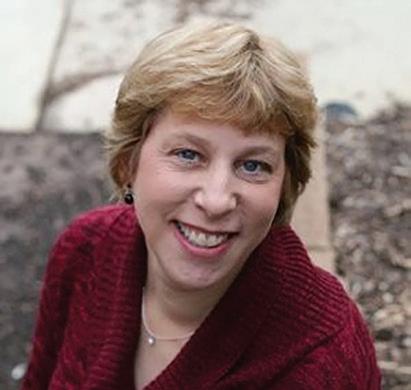
“ is required major adjustments in how SCORE Charlotte normally conducted business,” says Barbara Brill, president of the 72-volunteer chapter. “Harwell and Fischer led our chapter through two very tough years,” says Brill, which is why both received the Dick O’Brien Award, named for a former chapter chair.
Becoming a SCORE mentor requires commitment and experience, said Harwell. Mentors go through training and are expected to volunteer with clients for at least 10 hours a month.

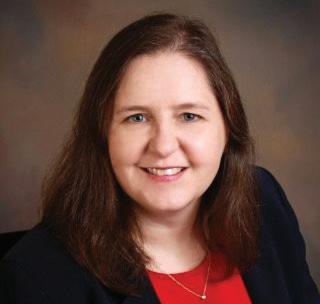
e initial interaction with SCORE typically comes when someone

8 BUSINESS NORTH CAROLINA
POINT TAKEN Dan Barkin
Seasoned executives help fledgling owners make savvier decisions.
Marschel Warren recruitment-firm owner
Debbie Henry property manager
Patti Williams home-care business owner
Helen Ruth “HR” Harwell Charlotte attorney
Jim Poppe SCORE director
looking for help requests a mentor on the website. From there, they can get paired with an appropriate mentor. That can result in one session or a continuing relationship.
“A lot of our clients are already in business and have the one-off problem or thing they’re struggling with,” says Harwell.
I sat through a recent Zoom workshop, the first module of “Simple Steps for Starting Your Business,” and it was a good overview of what’s involved, taught by experienced volunteers who had run businesses. There are a lot of resources on the SCORE website, including probably the most important, a step-by-step webinar on writing a simple, onepage business plan.
GOING THE EXTRA MILES
I talked with Patti Williams, a Raleigh chapter mentor, the day after she drove more than 100 miles to Eastern North Carolina to make a presentation at a small business conference. A lot of volunteers treat their SCORE work like a regular job, but this seemed above and beyond. I wanted to know how she ended up in the middle of Bertie County with a PowerPoint.
Williams, who runs a home-care agency, had a friend with UNC’s NCGrowth who was working on the conference. They wanted someone from SCORE, but hadn’t gotten anyone lined up. Could Williams help? Williams, who spent years with IBM before becoming a nurse and then starting her business, said if they couldn’t find anyone, she’d do it. So she was on the road, trying to find the Bertie campus of Martin Community College. “I’ve never been to that part of the state. That was a haul.”
A woman who ran the workshop told Williams that a lot of the participants now plan to get a SCORE mentor. “They just didn’t know this service was available,” the woman told her.
That didn’t surprise Williams. Even though nationally, nearly half of SCORE clients are minorities, Williams, who is Black, says she constantly runs into people unaware of SCORE.
“I just personally have spent a lot of time making sure that the minority community knows about SCORE and that it is a free resource that they need to use,” she says.
One of her clients is Marschel Warren of Durham, who started her recruiting firm after years in the industry.
“Miss Williams listens to what I want to do, and she’s very honest and asks questions that make me think, ‘Is this or is this not a good idea?’ The way that she words her questions to me, and the way she frames things to me, either makes me want to move forward or makes me want to pivot and figure another way to do things,” says Warren.
SMALL BUSINESS EXPERIENCE
Debbie Henry of Raleigh, who has been a SCORE client and, more recently, a mentor, started her property management business with one home more than 30 years ago.
Folks who run small businesses know a lot because they wear a lot of hats. But not everything.
Around 15 years ago, her company was growing; she needed to hire. “I didn’t know what forms you needed. I had no HR experience,” she says. “So I just needed somebody to guide me through that whole HR part of it.” She reached out to SCORE.
What she has found as a mentor is that the role involves a lot of patient listening to ideas that may not be fully formed but may have potential. “From SCORE’s perspective, it’s not their job to kill someone’s dream.” So you hope they keep at it, and try to give the right amount of advice and encouragement.
One client wanted to get into investment real estate. His approach would have required too much cash, maybe 30% down.
“I suggested that rather than buy investment property, buy a home for less money down, live in it for a while. Then rent it out and buy another house to live in. Then rent that out, and buy another to live in. And so on.”
AI, WRITE A BUSINESS PLAN
Jim Poppe of Southport is the state SCORE director. He retired a decade ago after a career opening Trader Joe’s stores around the country. Mentors are given the option to make their expertise areas available on a searchable national database, says Poppe, and there aren’t that many with retail grocery backgrounds.

“I spent an hour on the phone last year with a kid who is managing his family’s business in Sacramento, and it’s an Asian spice importer,” he says. “And he had some very, very specific questions about running his retail store, that I think I gave him some really good answers for. It was a one-off conversation.”
Recently, he had another conversation with a young man in the western part of Ukraine.
“He wanted to float a business idea by me,” says Poppe “A very technical business idea.” Poppe talked to him.
SCORE wasn’t set up for clients outside the U.S., but whatever, Ukraine needs help.
The core mission — helping small business — is the same as it was in 1964, but everything else has evolved, not just the name. Fifteen years ago, social media wasn’t a thing. Now SCORE has volunteers who know it. Then there is artificial intelligence.

The Cape Fear chapter chair, Larry Grossmann, called Poppe up and said to come to his house. And Poppe grabbed another SCORE colleague and “we went over to Larry’s, middle of the day.” Grossmann opened up ChatGPT, the AI chatbot.
“Tell me a business you want to start,” says Grossmann. “And I said, ‘OK, how about a dry cleaner?’”
“So he types in, ‘Please write a business plan for a dry cleaner in Wilmington, North Carolina.’ “And guess what? Out it came. It was amazing.” ■
9 JULY 2023
SCORE’s Mentor Matchmaker program partners local business owners with mentors, who provide consulting on best practices to start and operate a small business.
PHOTO COURTESY OF SCORE.
Veteran journalist Dan Barkin went to high school in Newton, Massachusetts, arrived in the South for college in 1971 and moved to North Carolina in 1996. He can be reached at dbarkin53@gmail.com.
ARROGANCE AVOIDER
Private-equity kingpin Henry Kravis joined High Point University President Nido Qubein in the Power List interview, a partnership for discussions with influential leaders. Interview videos are available at www.businessnc.com
Henry Kravis isn’t on the Power List, but his company’s 1988 acquisition of RJR Nabisco changed Winston-Salem and North Carolina. At the invitation of his friend and Greensboro business leader Bobby Long, he visited the Triad in May to promote the SEO Scholars program, which provides education funding for 48 Guilford County Schools students. The Tulsa, Oklahoma, native joined George Roberts and Jerome Kohlberg at the Bear Stearns investment company, then the trio started their own private-equity firm in 1978. He is co-executive chairman of KKR. This story includes excerpts from Kravis’ interview and was edited for clarity.

KKR started with $120,000. It now has a market cap of more than $55 billion. How did you do it?
Well, you’re going to be a good entrepreneur, what do you do? You’re either going to get through the wall or you’re going to get over the wall, but you’re going to get to the other side somehow.
You got a job at Bear Stearns and became a partner by age 31. Then you and your cousin, George Roberts, left and started KKR. What happened?
George and I were both 32 at the time. We went to the senior partner at Bear Stearns and said, ῾You know we’ve been doing (we call it private equity now).’ They hated it because they were a sales and trading firm and, for them, overnight was long term. They never put a penny into any deal we ever did, but they were happy to get the fees that we would bring in.
Boren Clay Products of Greensboro was one of our very first investments. That was in 1974.
We said, ῾We want to do this and we’d like to do it within Bear Stearns. We’ll give you half of this new firm and we’ll call it KKR, and we’ll take half.’ The senior partner, Cy Lewis, said, ῾You’re either here
doing what we want you to do, or you’re out.’ So, we went back to our office and we said, ῾Well, there’s our answer. We’re out.’
I put up $10,000 — that’s all the money I had. George put up $10,000. Jerry Kohlberg put up $100,000. The idea was to make longterm investments of five to 10 years and improve businesses.
What fundamentals do you look for in a company?
One thing that’s pretty standard is, ‘What’s the industry, and where does this company fit in the industry?’ If it’s No. 7 in an industry, and unless you have a pretty clear path to get it to 1 or 2 or 3, it’s pretty tough to do anything unless it’s a niche business.
Management is key whenever we buy a company. Now, mistakes that we’ve made over the years are that we’ve waited too long to change out a bad management team. What you see is what you’re gonna get when you first meet somebody. You can change them around the edges, but after you spend a number of hours with them, you’ll pretty much size up the person.
Another thing that’s important are risk factors. If you always worry about what you can lose, and never worry about how much you’ll make, you’ll always make money.
10 BUSINESS NORTH CAROLINA
LIST INTERVIEW
with Nido Qubein at High Point University
Our mistakes have never been because we overpaid. Mistakes we made were big macro mistakes. We missed on gas prices. Toys ‘R’ Us was a big mistake for us because we didn’t pay enough attention to this little company called Amazon. They came along and chewed our legs off.
When you bought RJR in 1988, it was the 19th largest U.S. company. I think you paid $25 billion?
$30 billion. What’s $5 billion?
There was a lot of money available then. We had been talking to the management of RJR and Nabisco about putting it together with Beatrice Foods, which was one of the worst-run companies that I’d seen. One day, we get a call that they just fired the CEO of Beatrice. And I said, `Well, let’s dust off our numbers and see what we can do. We ended up buying Beatrice for about $8.6 billion. We then thought about combining it with RJR and Nabisco. We had a number of conversations with [RJR CEO] Ross Johnson.
Then, he got the idea that, ‘Geez, maybe I could buy the company.’
So, he went off and talked to a couple good friends and they put an offer in at $70 a share. George and I said, ‘This is crazy. This company is worth over $100 a share. They’re stealing the company.’ We worked all weekend and on Monday afternoon, we sent a letter in at $90 a share. That started the bidding contest.
It was a very poorly managed business that had incredible potential. We were worried about the tobacco business but that was the cash flow machine.
KKR eventually won the bidding at $112 per share.
I’ll give you an example of the waste in that company. Our lawyer, Dick Beattie said, ‘Do you know one of the senior executives at RJR by the name of G. Shepherd?’ He started laughing and said, well, that is Ross Johnson’s German shepherd, and he flies on one of their 11 airplanes by himself. Whenever Ross Johnson wanted to get his dog out to visit with him, he sent the plane for him.
That was the tip of the iceberg. There was just waste everywhere. What company has 11 airplanes? We just saw where we could run the business so much better than it had been run.
Would you do it over?
In the end, it was a lousy investment. Yeah, we fixed a lot of it. We were going to go with the tobacco business as one separate business and the food business as a separate business. But we had to wait five years to do it, otherwise there was a big tax splitting the company apart. Then we were worried because a couple of investigations started in the tobacco industry and we knew we’d be dragged into that as well. So, we couldn’t split it apart.
The bottom line was we made a little money but not a lot. It got more publicity than it probably should have. They wrote a book about it (and a movie) called “Barbarians at the Gate.” Thirty-three years later and we’re finally getting rid of that name.
It was not a great investment. It was a great experience.
I have yet to see the whole movie. I’ve fallen asleep twice trying to watch it. My wife, Marie-Josée, will tell you I fall asleep at all the movies. It didn’t depict what really happened. The book, on the other hand, is about 85% accurate. I learned a little from the book about what the other side was doing.
Why is there an ‘Arrogance Kills’ sign in your office?
My assistant had it framed because she heard me say that so many times. I don’t believe anybody should be arrogant. I don’t care who you are. We all get dressed the same. I’ve seen more companies, institutions and people fall apart because of being arrogant.
What is your view of a highly effective corporate culture?
We came out of Bear Stearns, which was an ‘eat what you kill’ culture. It was a culture where everybody raised their hand and said, ‘I did this,’ and ‘I did that.’ Everybody was trying to get whatever they could grab. We wanted a ‘we firm’ not an ‘I firm.’
Today, 47 years later, it’s exactly the same culture. That is our DNA to date. I tell young companies, when they say, ‘What piece of advice would you give me?’ I said, ‘Have a culture. Whatever culture you have, talk about it constantly. I’m not going to tell you what’s the right culture for you, but I’ll tell you what is the right culture for us. And you can’t talk about it enough.
When we’re hiring people, we are trying to see, ‘How will they fit in the culture?’ We may have as many as 25 interviews for that person. And they come in with 25 supporters on day one!
How does KKR review people?
We review them in four areas. Management leadership. Commercial success. Culture and values. And diversity and inclusion. We’ve had people at the firm that did exceptionally well as far as making us money and we fired them because they wouldn’t help anybody else at the firm. You’ll kill a firm, in my view, if you do that.
We have not only diversity in gender and ethnicity, but we want diversity in thought. So we want different people all the time. Too many young people want to hire people like themselves, and I think it’s a big mistake. You want people with different views and different perspectives. We’re not to where we want to be yet, but 38% of our executives today are women.
What worries you the most?
My biggest concern is what schools teach. Our education system in general has declined, particularly in the elementary and high school level, and I worry about that. I worry about the quality of education in America. We have a chance at moving toward losing our democracy. That’s a big statement, but I’m worried about that. Look at the number of countries where democracy is declining, in one way or another. I worry that we stand a chance, if we’re not careful, of diminishing our democracy.
What we need in the country is real leadership, Republican or Democrat. The problem is today, nobody talks to each other. You see it on college campuses, and if they’re too far to the right or too far to the left — oh no, we don’t want them here. I want everybody, OK? We went to college to learn from each other, not just to be with people like myself.
Are you worried about China?
Of course, you’ve got to be worried about China. I don’t think we’re communicating with China. Our government should keep talking. They’re not going away and we’re not going away, and the less we talk to each other, the more danger we have of something bad happening.
Final thoughts?
This is the greatest country in the world. We have, today, more opportunity than anywhere in the world. You just have to take advantage of it. I’d like to say to young people. Take one sentence out of your vocabulary: ‘I wish I had.’ ■
11 JULY 2023
ENERGIZERS


MASTER MOVERS
Two Demon Deacon graduates are scaling their campus storage business to help students decamp with ease.
By Connie Gentry
Working at a frozen yogurt shop in middle school taught Sam Chason that a minimum wage was not enough of a reward for the hard work involved. So at 14, he began hustling — mowing lawns, selling everything from T-shirts to a BMW online.
He earned $30 an hour, plus tips, serving gourmet hors d’oeuvres to executives at a catering company. He made enough to save $50,000, which he put in his parents’ safe, before entering Wake Forest University. His entrepreneurial itch would kick into overdrive during his freshman year.
A new cohort of college students finish final exams each May, but face a problem, especially those who live hundreds or even thousands of miles away. They have to depart rooms full of furniture, TVs, refrigerators and personal items, much of which will be needed when classes resume in the fall.
Chason saw the business opportunity while a freshman at Wake Forest, where 80% of the 4,000 students residing on-campus come from outside the state. In 2017, he started Storage Scholars as a solution for classmates to store their belongings over the summer months.

The company served 64 Wake Forest students in the first year. Seven years later, its customer base topped 8,600 students at 73 campuses nationally. They typically pay about $550 for the cost of moving and storage.

Storage Scholars expects revenue to top $5 million this year, versus about $2 million in 2022. On a single day in mid-May, the
company handled about 3,000 moves.
Finding motivated staffers, then paying them well, has been critical to the company’s growth, Chason says. It has 13 full-time staffers, up from four a year earlier, and about 1,000 seasonal workers, typically students at the client universities.
Each worker is paid at least $15 per hour, plus tips. For experienced staffers, pay can reach $25 to $27 an hour. Student wages are expected to total $1.75 million this year, up from $1 million in 2022.
Chason credits much of this success to an epiphany moment while working at a frozen yogurt shop near his home in Westchester County, New York. “There are clearly better ways to make money and spend your time,” he says. “Storage Scholars was a natural culmination of doing dirty, sweaty work like lawn mowing, being a handyman, shoveling [snow], and working for a catering company.”
He made even more money as a teenager by “selling things on Craigslist, Facebook marketplace, and garage sales with thousands of items, anything from a T-shirt for 25 cents to a $20,000 BMW M3. I’d find ellipticals for free on Craigslist and sell them for $400, or clean out attics for people and sell things on commission.”
Chason left for Wake Forest with his $50,000 nest egg. Still, it didn’t cover the difference between tuition at Wake Forest and a public school, which is what his parents, both teachers, were on board to pay. The annual cost of attendance at the university, before grants and discounts, now tops $87,000.
12 BUSINESS NORTH CAROLINA
Enterprising young Tar Heel entrepreneurs.
DEBT-FREE AMBITIONS
It only took one visit to Wake Forest for Chason to choose the school. He credits Spry Stadium, the school’s soccer venue, as a factor because of his love for the sport. His only caveat: No student loans.
“I looked at how much money I’d saved and figured out how much I’d have to make each year to graduate without debt. It was never a question of taking out student loans. It was always, `What do I need to do to pay off that bill each year.’”
Chason shared his view with classmate Matthew Gronberg, now Storage Scholars’ co-founder and chief operating officer. Hewas earning $7.25 an hour as an intramural referee, and Chason told him, ‘You are never going to pay off school doing that.’”

They built the business by convincing university administrators to make them a preferred service for on-campus residents and their parents. The key was gaining access to dorms at the start and end of semesters, then delivering great service. It typically takes about 100 customers per campus to be profitable, “and still see some meat on the bone for future years,” Chason says.
Storage Scholars provides supplies for students to pack their items, photograph everything, and upload the photos to their account. Company movers then deliver the packed boxes to temperature-controlled storage facilities near campus. When students return for fall semester, Storage Scholars has moved the boxes into their new rooms.
The business launched with a couple of hundred dollars. Customer deposits of $50 covered costs of storage, labor and supplies, Chason says. Putting $10,000 into marketing and infrastructure “would have been throwing money at things when I didn’t
know what was going to work.”
Last October, they gained a $250,000 vote of confidence from billionaire Mark Cuban during the CNBC show “Shark Tank.” After the show aired, Cuban asked the company to move his daughter into Vanderbilt University in Nashville. “it’s definitely a relevant problem for him,” Chason says.
Cuban is the company’s only outsider investor, with 10% equity. “We send him updates every week and if I emailed him right now he’d probably answer in 20 minutes; he’s been phenomenal. When we ask questions, he’s like: ‘Figure it out boys.’”
SWEAT + TECH
CAMPUSES SERVED
2017: 1
2020: 7
2022: 23
2023: 73
2024: 150 (projected)
Chason, now 25, aims to serve 150 campuses next spring. He and Gronberg now live in Austin, Texas, for personal reasons. The senior manager at the Winston-Salem office is Chelsea Goodwin, head of business development.
Frank Shelton, director of housing and operations at Wake Forest, says Storage Scholars is the ideal partnership because of its student-centered business model. “It’s Wake Forest alumni providing services done by Wake Forest students for Wake Forest students — it’s a really good fit because they speak the student language better than administrators.”
This year, Storage Scholars handled more than 600 moves at Wake Forest, a 10-fold increase versus year one.


“The best feedback I can have from parents and students is not hearing anything, because the things I hear about are the problems,” Shelton says. “Over the years, any issues with Storage Scholars have been minimal and, if there is a problem, Sam and Matt bring five possible solutions for how to solve it.”
The pandemic tested Storage Scholars, which packed students’ belongings during the mid-semester shut-down in March 2020 and returned them to newly assigned rooms the following fall, or kept them in storage as needed.
Chason was a senior on spring break at that time. “I took a red-eye back and started writing proposals to do body cams and wear haz-mat suits,” he says. Instead of their regular process, which takes a few hours, they walked into rooms filled with personal belongings. Utilizing FaceTime to connect with students, they tackled the task of packing up rooms left unexpectedly. ■
13 JULY 2023
PHOTOS COURTESY OF STORAGE SOLUTIONS
A `Shark Tank’ episode in 2022 paid off for Chason and Gronberg..
LEVERAGING TECHNOLOGY TO TRANSFORM THE PAYMENTS ECOSYSTEM



Throughout Doug McKinley’s career in financial services, he has been motivated by the premise of making banking – and treasury management, specifically – more streamlined and efficient for businesses. A steady pace of technology advancements and PNC’s significant investments in digital innovation are helping Charlotte-based McKinley, head of innovation for PNC Treasury Management, deliver on that vision.
“The overarching goal for our treasury management business is to provide clients with faster, more secure payments capabilities that are seamlessly integrated with their core systems and optimized for automation,” says McKinley.




During the past year alone, PNC Treasury Management’s innovation team, which McKinley leads, has been integral to the rollout of new products and services, including two innovative payment solutions: PNC EarnedIt, which helps companies provide employees with access to earned pay prior to payday, and PNC Claim Predictor, which helps healthcare providers identify inaccurate or insufficiently populated insurance claims prior to submission to mitigate losses associated with denied claims.
The introduction of these technology-enabled solutions is timely as CFOs work to identify strategies to succeed in today’s challenging economy, says McKinley. A 2022 survey report commissioned by GTreasury and PNC Bank found that automating treasury functions is one of three areas of pronounced focus for CFOs looking to reduce costs and fuel growth. To that end, organizations are increasingly looking to harness automation and digital tools to help their treasury and finance departments be more strategic.
The report, Pressure Points, Payments & Plans for Automation: The Road Ahead for CFOs and Treasurers, found that treasury technology will not only help CFOs navigate an uncertain market against the backdrop of ever-increasing complexity, but that the added business value of treasury functions may help further maximize key financial opportunities.
“This survey confirmed what we know to be true – that treasury and finance professionals recognize the enormous potential that automation represents in ongoing efforts to reduce business costs,” says McKinley. “It also motivates us to continue to uncover opportunities to innovate for our clients and help them run their businesses better.”
CALIBRATING PAY METHODS WITH ONDEMAND ECONOMY
In today’s increasingly on-demand economy, on-demand pay is quickly becoming a must-have offering for employees, says McKinley.
“The premise of on-demand pay rethinks the historical concept of fixed pay periods to reflect the increasingly common expectation that employees should have the option to access their pay, as they earn it,” says McKinley. “Advances in technology and learnings from the implementation of real-time payments have made it possible to seamlessly deliver ondemand pay by integrating directly with a company’s existing payroll and time and attendance systems.”
In 2022, PNC teamed up with DailyPay, an on-demand pay platform, to launch PNC EarnedIt, a solution that leverages companies’ existing payroll and time management systems to convert their employees’ time worked into net earnings. This available balance is accessible to employees via a mobile application 24/7, and employees can select the speed at which – either immediate or next business day –they would like to receive a portion of their earned pay.
The financial wellness benefits of on-demand pay are farranging and impactful. According to data from DailyPay, 94% of its users use on-demand pay to cover bills and avoid late fees, saving an average of $1,205 annually on overdraft and payday loan fees.
Employees are not the only ones to benefit from ondemand pay. Employers that offer on-demand pay have reported a 45% average reduction in turnover, with employee engagement increasing by 73% and timeclock compliance improving by 10-15%. Additionally, these companies can typically fill open positions 52% faster.
ALLEVIATING PAIN POINTS FOR HEALTHCARE ORGANIZATIONS
Claim rejections have long contributed to chronic headaches and significant losses – to the tune of $407 billion annually1 – for healthcare organizations.
“In conversations with doctors, insurance administrators, health system executives and others, we kept hearing about the challenges they were facing in successfully submitting
SPONSORED SECTION 14 BUSINESS NORTH CAROLINA
This is the twenty-seventh in a series of informative monthly articles for North Carolina businesses from PNC in collaboration with BUSINESS NORTH CAROLINA magazine.
insurance claims and how this was leading to lost revenue, extended timelines for receiving payment and the diversion of critical resources,” says McKinley. “The PNC team saw an opportunity to develop something innovative that could help alleviate this pain point and help our healthcare clients run their businesses more efficiently.”
The resulting innovation was PNC Claim Predictor, which leverages machine learning technology to review past paid and rejected claims and analyze organizations’ claim attributes and associated patterns. The product’s artificial intelligence (AI) technology can predict which new claims are likely to be rejected and alerts healthcare organizations to claim details that should be corrected before submission. The software “learns” the payment criteria of various insurers and adjusts as payers make changes over time.
“By identifying potential causes for denials prior to submitting a claim to the payer, PNC Claim Predictor can help
healthcare organizations reduce the volume of initial denials, lower the total cost to collect claims, accelerate cash flow and increase operational scale,” says McKinley.
While PNC’s technology and innovation team developed the solution using proprietary bank technology, says McKinley, its origins reside squarely in the day-to-day experiences of healthcare providers.



Another example of PNC’s work in the healthcare payments space is its ongoing collaboration with AccessOne, a Charlotte-based leader in patient financing solutions, to deliver consumer financing solutions to healthcare providers and insurers. Working with AccessOne, PNC helps healthcare providers enhance financial performance and improve patient relationships, while also facilitating their ability to provide various financing options for consumers to manage escalating healthcare costs.
While there is no shortage of business challenges to address with clients, McKinley is optimistic about PNC’s ability to help clients architect and implement cohesive cash management systems. “PNC is committed to investing in technology, and we are well-positioned to deliver digital tools, solutions and innovative ideas to help organizations embark on a new chapter of automation and efficiency.”
For more information, please contact your PNC Relationship Manager or Treasury Management Officer, or visit www.pnc.com/treasury.
REGIONAL
Weston Andress, Western Carolinas: (704) 643-5581
Jim Hansen, Eastern Carolinas: (919) 835-0135
1. LaPointe, J., “Hospital Claim Denials Steadily Rising, Increasing 23% in 2020,” RevCycleIntelligence, 2021. These articles are for general information purposes only and are not intended to provide legal, tax, accounting or financial advice. PNC urges its customers to do independent research and to consult with financial and legal professionals before making any financial decisions.
Disclosure: Except for providing data management services, PNC Bank is not responsible for, or involved in any way, with any services provided by AccessOne. If you choose to work with AccessOne, we encourage you to review their products to make sure AccessOne meets your business needs.
DailyPay and Powered by DailyPay are trademarks of DailyPay, Inc. All rights, title and interest in and to DailyPay Inc.’s trademarks and DailyPay content in these materials remain with DailyPay, Inc. PNC and PNC Bank are registered marks of The PNC Financial Services Group, Inc. (“PNC”). Bank deposit, treasury management and lending products and services, foreign exchange and derivative products (including commodity derivatives), bond accounting and safekeeping services, escrow services, and investment and wealth management and fiduciary services are provided by PNC Bank, National Association (“PNC Bank”), a wholly owned subsidiary of PNC and Member FDIC Lending, leasing and equity products and services, as well as certain other banking products and services, require credit approval.
©2023 The PNC Financial Services Group, Inc. All rights reserved.
15 JULY 2023
PRESIDENTS:
Doug McKinley
MERLOT MEMORIES
Megan Riley is on a mission to showcase vineyards that are reshaping the state’s wine industry.
By Amanda Lea
Charlotte’s Megan Riley owns a global travel-tour company and is familiar with wines from Sonoma to Croatia. When she attended a wine tasting event in the Queen City in 2007, she tried wines from several North Carolina vineyards. She quickly concluded that the state’s reputation for sweet wines was deserved.
North Carolina has been known for syrupy vino for decades. Cultivation of the scuppernong vine, a variety of muscadine, began in the 1500s. North Carolina led the nation’s wine production at the beginning of the 20th century. But Prohibition tanked sales, and the industry didn’t start growing again until the mid-2000s.
Now there are about 200 wineries and 400 vineyards in the state — many of which o er a very di erent taste. (Spoiler alert: It’s not all muscadine.)
Several years a er her rst North Carolina wine encounter, Riley found herself at another wine tasting, this time paired with locally sourced food prepared by top-notch chefs.
“In addition to the thoughtful food pairings, the local wine was paired with old world options, so you could really have a head-to-head matchup of tastes,” Riley says. “ ere were North Carolina and French cabernet sauvignons, so you could see how our state compared to wines from other areas of the world. Experiencing the taste next to wines from California, France and Italy, made me realize that our wine has come a long way from my rst experience.”
A BUSINESS IS BORN
e experience inspired Riley to share news of North Carolina’s transformation. She reached out to a friend, Jessica Diehl, about showcasing that change by arranging winery tours.


“We wanted to show wine drinkers the top quality vineyards in our area,” Riley says. “We are so passionate about changing the stigma about North Carolina’s wine options, we painted a motto on our vans that says ‘ e unsweet wine tour.’”
Riley reached out to several local wineries to become familiar with the landscape. She also saw an opportunity to make the wine tasting experience more personal.
“ ere were a lot of ‘wine Ubers’ out there,” Riley says. “Transportation companies that would drive you around to di erent wineries, but didn’t care if you bought the wine and weren’t invested in helping people learn more about North Carolina wines. We wanted to go beyond transportation and provide a more personal and educational experience.”
In early 2019, Riley and Diehl bought the “NC Wine Gals” domain name and hit the ground running. Diehl le a er the rst year of business, while Riley is leading the company into its h year.
NC Wine Gals has two vans and operates private or public tours from Asheville, Charlotte, Greensboro and WinstonSalem. e seven-hour tours include visits to three vineyards from a rotating roster of more than 40 vineyards in North Carolina’s Yadkin Valley wine country, about an hour north of Charlotte. Prices for the outings range from $159 to $229 per person, according to the company website.
16 BUSINESS NORTH CAROLINA NC TREND ›››
Tourism PHOTOS COURTESY OF NC WINE GALS
To kick things off, the wine guide walks through an aroma kit — which consists of little perfume vials that help guests identify different smells they will encounter at the tastings. Each tour includes pairings of pastry and charcuterie, a picnic lunch and a vineyard tasting or flight.
In addition to running the business, Riley puts on her wine guide hat, too. She leads about half of the Charlotte-based tours herself, about 30 or 40 tours a year. One thing that sets the business apart from similar tours is the level of engagement by their guides, Riley says.
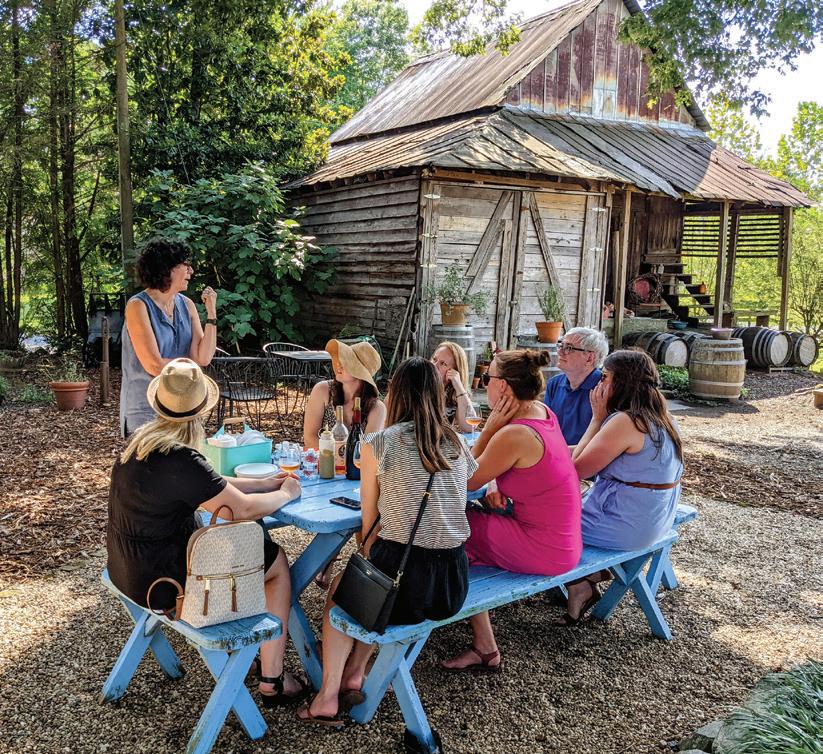
Over the course of the tour, the guide helps guests branch out and try adjacent varieties. The goal is to spark memories that will last longer than their glass of merlot.
“We aren’t just driving the van,” Riley says. “We build camaraderie with the group, share relatable wine knowledge, and even create fun playlists to sing along with on the ride. Some of my favorite customer reviews are when people talk about their wine guide by name.”

GOING WITH THE FLOW
When NC Wine Gals began, Riley and Diehl reached out to influencers and hotel concierges to help spread the word about the business. It was slow-going at first, but in September 2019 they started to reap the benefits of organic search.

“People were saying that they found us by Googling ‘wine tours,’” Riley says. “It turned out that 85% of our business in that first year was organic.”
Then the pandemic struck, forcing NC Wine Gals to fight to stay afloat. “COVID-19 decimated small businesses, and we were no exception,” Riley says. “It sent us into economic turmoil. A bridge loan from a family member allowed us to refund all our bookings. By that summer, we were able to do smaller tours with masks. It was enough to pay the bills. The business didn’t grow
through 2021, but we maintained cash flow.”
Early 2022 saw a spike in tour bookings, partially from people feeling more comfortable venturing out, and also from those who were itching for a staycation.
“Summer 2022 dropped off again, though, because people were ‘revenge traveling.’ Everyone went to Europe,” Riley says. “But by October 2022, we were booked for the month and we have had consistent bookings since then.”
Considering their pandemic setbacks, Riley considers this year to be the company’s first “real year” of business. Sales are up 41% through mid-year.
“That’s with two vehicles,” Riley says. “Our next goal is to add a third vehicle,” which she says would add $50,000-plus in annual revenue.
NC Wine Gals now averages at least eight tours per month among its Charlotte, Winston-Salem and Greensboro locations, and about four tours per month from Asheville. The audience skews about 95% female, ranging in age from 25 to 65. Riley would be happy for more men to show up. But she takes pride in being a rare women-owned-and-operated company with female tour guides who demystify an often-intimidating topic.
Riley particularly enjoys getting to know vineyard owners, many of whom have been vintners for generations. Her company chooses its stops based on the quality of wine and relationships with the operators. No money changes hands between NC Wine Gals and the vineyards.
“One vineyard was deeded their land from the queen of England in the 1700s,” Riley says. “Some are bootstrappers who taught themselves how to make wine a few decades ago and are working hard to keep that tradition going. It’s a great feeling when you go to these family vineyards and see them following their passion. They make a great variety of approachable North Carolina wine, and I’m excited I can play a part in sharing that with others.” ■
17 JULY 2023
North Carolina topped U.S. wine production until Prohibition in 1919. After decades of little activity, the winery count rose from 21 in 2000 to about 200 now in 71 counties, according to state data. The state’s wine output ranked No. 9 in 2019, the Frank Rimerman research firm reports.
ROCKING THE EVENTS BIZ
Facing down a giant rival, Etix finds niches behind helping fill arenas and concert halls.



 By Connie Gentry
By Connie Gentry
Travis Janovich saw a simple problem in the late '90s: He wanted to see the Dave Matthews Band, Hootie & the Blow sh and other musicians when they played at regional venues, but there was no reliable way to buy a ticket in advance. e best option for fans was to visit the box o ce ahead of time, or hope the concert wasn’t sold out a er trekking to the venue on the day of the event.
One pseudo-option existed — fans could send a fax requesting a ticket, which meant a roll of faxed paper would be waiting on the box o ce oor each morning. Maybe you got a ticket, maybe you didn’t.
“Man, it would be great if you could buy and print your tickets at home,” thought Janovich, who received a bachelor’s degree in economics at N.C. State University in 1996.
So he started Etix in 2000 when there wasn’t much of a ticketing system for smaller venues or those outside big cities. His rst idea was to develop a print-at-home delivery method with barcode-based ticketing.
“ ere was a lot of interest in the idea, and it got us in the door with venues, but in 1999/2000, we were super early for being web-based.”
More than two decades later, the Morrisville-based company is holding its own against the industry behemoth, Live Nation Entertainment, which sells 500 million tickets a year across 45 nations through Ticketmaster.com and Livenation.com. e Beverly Hills, California-based company controls 70% of the ticketing and live event venues market, CNBC reported this year.
“When we launched, Ticketmaster had all the events and were aggregating them to sell,” Janovich says. “But the venues were not getting any of the data from sales, so they didn’t know their clientele or who was coming to the venue.”
Basically, the only di erence in buying tickets online and at a record store was not having to stand in line. Arenas and theaters weren’t gathering much information in the process.
“I thought it was ludicrous crazy that the only person who knew the ticket buyer was the ticketing company. Our philosophy from the beginning was: your data, your dollar, your brand.”
Etix changed the model, creating tools that give venues visibility into purchasing data and options that enhance the experience for ticket buyers. An example is reserved parking ahead of an event.
“We were the rst company to integrate a true digital marketing company within a ticketing company, with the idea being that when we help the venues sell tickets, we’re a better partner. Since we make money when they sell tickets, everybody wins.”
By 2020, the company was processing more than 55 million tickets a year for 1,800 venues including festivals, fairs, performing arts centers, music clubs, theaters, museums and casinos. Etix operates in 40 countries. Janovich declined to provide more recent results.
Venues in smaller markets, typically with seating of 12,000 or fewer, have been the sweet spot for Etix. But the company works with venues of all sizes, including the largest arenas and stadiums.
“Our biggest vertical is music, which I think is natural because it’s what people tend to buy advance tickets for most o en. But we also ticket a lot of the largest fairs in the country, which sell millions of tickets, although a lot of those are sold at the door,” he says.
Etix also has a service to provide venues hosting one-time events or annual festivals with the necessary hardware, such as handheld scanners, kiosks and box-o ce computers. e equipment is stored at a warehouse in Henderson.
Since 2017, Etix has been a portfolio company of Boston-

18 BUSINESS NORTH CAROLINA NC TREND ››› Entertainment
based Parthenon Capital Partners, which made an undisclosed investment. At the time, Etix said it had been profitable since 2003.
Parthenon’s backing enabled five acquisitions of regional ticketing companies between 2017 and 2019: Extreme Tix of Texas, TicketBiscuit in Alabama, Interactive Ticketing in Seattle, Star Tickets in Michigan, and TicketForce in Arizona.
“We partnered with Travis and Praxton to recapitalize and aggressively grow the company,” says Brian Golson, managing partner and co-CEO at Parthenon in Austin, Texas, and a UNC Chapel Hill graduate. “What they’ve done with it since then, and since founding the company, has been fantastic. We were one of the few companies in ticketing to focus on growth during COVID.”

When the pandemic decimated in-person events, Etix was as wellpositioned as possible, Janovich says. The company offered a timed-entry product that, prior to the pandemic, was primarily used for ticketing museum exhibitions. With some modifications, Etix’s product allowed for ticketing for places that were open with diminished capacity.
In November of 2020, Etix joined with Chico, California-based

Alvarado Manufacturing to provide clients access to handheld devices and optical turn-styles for touchless entry to events. The application also lets Etix clients monitor capacity on a real-time basis.
Recovering from the pandemic has been slow, but Etix President Paxton Badham believes the worst has passed. In-person events have gradually resumed. “Relative to everything being closed, it was something; but relative to our normal [volume], it was next to nothing,” he says. “This is probably the first full year that things will be back to full strength.”
Badham, a Duke University graduate who previously worked for the Carlyle Group and McColl Partners, joined Etix in 2015.
Etix also has offices in Birmingham, Alabama, Houston, and Phoenix, plus Europe and Asia. The company hosts three Etix Live conferences annually to gather its clients and promote new initiatives. The Raleigh event typically has 300 to 400 attendees, while satellite conferences in New Orleans and Scottsdale, Arizona, attracted more than 100 people this year.
“We’re growing steadily and we’ve got a long runway of opportunity as we continue to invest in the system,” Janovich says.
A new point-of-sale system is coming in the next few months. “It will be a big deal for venues that have bars or gift shops, or different [entities] selling merchandise. We’re always growing the features and capabilities of the system horizontally, not just selling tickets.” ■
19 JULY 2023
Travis Janovich
COOL CABBAGE
A Boone produce trucker adjusts to clients’ demands for a greener Earth.
By Dan Barkin
The greening of America extends to the daily transport of cabbage, up and down the East Coast, by Boonebased Hollar & Green Produce. Keeping that produce cold for Walmart and other customers is a challenge that has traditionally involved burning diesel fuel to run refrigeration units on tractor-trailers.
Now, Hollar & Greene has gured out how to reduce its reliance on diesel and related carbon footprint, aided by the Surry-Yadkin Electric Membership Corp. In a pilot project, trailers lled with cabbage are cooled by equipment powered by electricity, not diesel.


e electric transport refrigeration unit, or eTRU, is loaded behind the driver’s cab and plugs into equipment at company warehouses.
e shi has cut costs for Hollar & Greene and made it more energy e cient, says Tony Greene, the vice president of transportation. His father, Dale Greene, co-founded the company with his father-in-law, Lige Hollar, in 1963. Tony’s two brothers, Je and Tim, are sales executives.
As a leading cabbage shipper, Hollar & Greene works with farmers from Florida to Canada. It has two main processing and warehouse hubs, in Mount Airy and near St. Augustine, Florida.



“We start in Florida,” says Tony Greene. “ at’s January to May. en Georgia. en Carolina, Virginia, Pennsylvania, western New York state, which is a great producing area, then, if needed, Canada. By the end of the year, we’re back to Florida.”
Trucks get loaded with pallets of cabbage in the morning when crews are available. e trailer can sit up to 12 hours waiting on a driver. e company owns 50 trucks and 75 trailers.
Walmart wants “the pulp temperature of the cabbage to be 36 degrees, so that’s why we have to have that unit running continuously, to reach and maintain that pulp temp,” says Greene. Someone checks the temperature with a probe. If the cabbage isn’t the right temperature, the load will be rejected.
e shi to electricity re ects a changing ethos. “Our customers are almost requesting that we reduce our carbon footprint, but they’re rewarding us for that,” says Greene. Becoming a favored vendor because of such e orts provides lots of incentive to act.
Looming regulatory changes are a factor. Using technology such as eTRU is common in California, the largest fruit and vegetable producing state. “ ere are limitations about burning diesel because of all the air regs,” says Jim Musilek, vice president of innovation and business development for the N.C. Electric Cooperatives.
“If those regulations kind of migrate east, we want to make sure our folks are in a position for success,” he says. “So that’s why we wanted to test the technology, so we could understand it and see what bene ts there are, because, frankly, we want to take this pilot and leverage it for all of our other cooperatives.”
e Hollar & Greene case highlights the importance of North Carolina’s electric co-ops to the state’s economy. e agribusiness sector is North Carolina’s largest industry, with a $103 billion annual contribution to the state’s economy. It is largely based in North Carolina’s rural counties. Electric cooperatives, such as Surry-Yadkin, serve 45% of the state’s land area.
Earlier this year, Hollar & Greene bought a trailer with an eTRU unit from ermo King. Surry-Yadkin managed the installation of the transformer and charging infrastructure at the Mount Airy site. e unit saves $100 a day by running o electricity at the warehouse, instead of diesel. Savings of $15,000 to $20,000 a year help pay o a new $100,000 trailer in about ve years. Five more e-TRU-equipped trailers are on order.
“We have a way to get a big return on investment with this new option,” says Greene.
“It’s low-hanging fruit,” says Musilek. “Or maybe, in this case, low-hanging cabbage.” ■
20 BUSINESS NORTH CAROLINA NC TREND ››› Sustainability
DIFFERENT STROKES
Organizers of U.S. golf’s premier tournament revise their strategies to impress fans.
By Brad King
As the United States Golf Association prepares for the fourth U.S. Open in 25 years at Pinehurst next year, the group is more focused on teeing up a premium spectator experience than achieving peak attendance.
The 2005 championship at Pinehurst No. 2 had record attendance for any Open, with 325,000 spectators for the week. “The energy, the crowds were certainly amazing. But I’m not sure it was necessarily the best experience for our fans,” says Reg Jones, the USGA’s managing director of Open Championships.
Fewer people will attend next year, he says. “But that’s a conscious decision on our part because we want to make sure that we’re delivering the best possible experience for our fans. We don’t feel like quantity is the right measurement of success for us.”
Nothing may be more comfortable for well-heeled fans than the USGA’s new VIP area in the grandstand overlooking No. 2’s 18th green. The enclosed, temperature-controlled 1895 Club will offer 400 tickets at $2,500 per day from Wednesday through Sunday of tournament week.
It’s a unique structure in the golf world, Jones says. “We were trying to create a different level of experience that still allows us to accommodate our general fans and provide that excitement and energy, but also provide a world-class hospitality experience.”
The 1895 Club will include valet parking and food and beverage services. “You’ve got the best seat in the house and air conditioning, which can be critical in June,” says Raleigh Leahy, the USGA’s senior director of hospitality. “It’s going to be pretty spectacular. We don’t think people are going to want to leave.”


Because the Open moves to a different site annually, the governing body takes varying approaches to its crowds. About 22,000 daily tickets were sold at this year’s Open in Los Angeles.
The 18th hole grandstand at No. 2’s last U.S. Open in 2014 held about 4,000 people. The new configuration calls for more than
3,000. The USGA will also move other hospitality areas away from the Pinehurst driving range, known as “Maniac Hill,” to different structures in more viewer-friendly locales around the course.
“Corporate clients were more interested in wanting to view golf,” says Brian Miranda, the USGA’s managing director of partnerships in hospitality. The new suites will have tiered seating in front of the food and beverage area, similar to arena suites. “We’ve shifted what the structures are from previous years here, and then we’ve actually moved them out onto the golf course, viewing competition.”
The USGA is establishing a second home in Pinehurst, called Golf House Pinehurst, to complement its New Jersey home. The 6-acre campus is scheduled to be completed by the end of this year and will include an equipment-testing facility, innovation hub, museum and visitor center, and offices housing 60 USGA staff members.


Next year’s tournament will be one of five U.S. Open Championships in Moore County by 2047, including another back-to-back men’s and women’s U.S. Open at No. 2 in 2029.
The state’s corporate support is a key reason the USGA made Pinehurst its first anchor site. “When you look at the economic impact numbers of hosting the last four U.S. Opens with four to come, that is a significant impact to the state of North Carolina. It’s over a billion dollars,” Jones says.” ■

21 JULY 2023 NC TREND ››› Sports
TRIBUNE NORTH CAROLINA INDEPENDENT INTELLIGENT INFORMATIVE



Our paid daily newsletter provides detailed interviews with key lawmakers, Q&As with other political leaders and lots of stories tracking daily happenings at the state legislature during the current session.

Here’s some of what you missed. Sign up today at nctribune.com.
GOVERNOR’S BUSY MONTH
A new law giving Blue Cross and Blue Shield of North Carolina permission to transfer assets to a new nonpro t holding company, wasn’t a surprise even though the bill had drawn opposition from Insurance Commissioner Mike Causey and State Treasurer Dale Folwell.
Gov. Roy Cooper joined legislative advocates in arguing that the bill better equips Blue Cross to compete given prevailing conditions in the healthcare industry.
“Our goal is comprehensive health insurance with access to care in every county of our state at the most a ordable cost possible, and this legislation with consumer protections in place aims to keep the company strong while continuing its commitment to its North Carolina home,” says Cooper.
e Blue Cross bill is one of the several that Cooper signed in June. He started the month by agreeing to Senate Bill 465 and House Bill 544, a couple of coastal-region speci c bits of legislation that allow cities to remove abandoned boats from the waters in their jurisdiction and set a May 1 to Oct. 31 moratorium on shorefront shark- shing tournaments in towns like Carolina Beach. (Seems the mayors in that area weren't keen on being cast in the Murray Hamilton role from "Jaws.")
COULD PHARMACY BILL COST CONSUMERS?
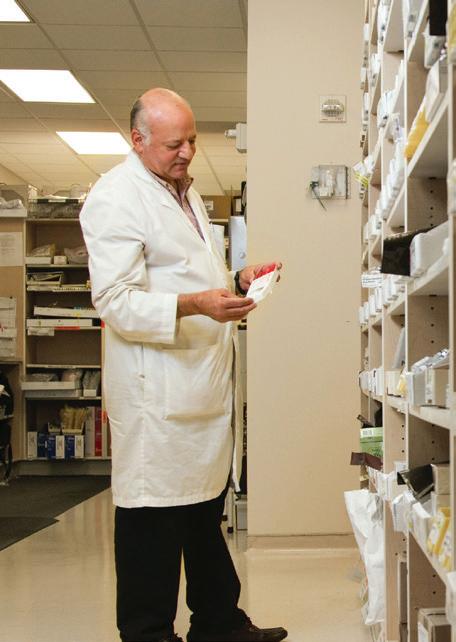
A bill promoting independent pharmacies passed the N.C. House in 114-0 vote in April, suggesting little controversy. But the legislation is opposed by drug companies and national drugstore chains that contend it will hurt consumers by imposing various mandates on pharmacy benefit managers, or PBMs.
The changes would prompt a $10.24 fee for each prescription drug dispensed in the state, according to critics of the bill.
Reps. Chris Humphrey of Lenoir County and Wayne Sasser of Stanly County say House Bill 246 is intended to even the playing field for independent pharmacies, which the lawmakers say are becoming scarce because of unfair practices of PBMs and larger chains. (Sasser is a retired pharmacist.)
Like everything in health care, the issues are complex, especially given the arcane nature of PBMs, which are third-party companies that manage prescription drug benefits for large employers and health insurers. Three
LENDERS COULD RAISE INTEREST RATES
Gov. Roy Cooper will get two bills that raise caps on the interest rates lenders can charge for some types of loans.
Senate Bill 329, which applies to consumer credit installment sale contracts and motor-vehicle loans, received a 93-22 vote on second reading and cleared the chamber on a subsequent voice vote. e dissenters were all Democrats, but 24 of their colleagues voted with Republicans to pass the changes.
e bill raises the caps on installment sale loan rates, allowing lenders to charge as much as 24% a year for amounts under $3,000, and 21% for loans of $3,000 and up.
Caps on motor-vehicle loan rates would go up to 20% a year for vehicles one to three model years old, 26% for vehicles four to ve model years old, and 30% for vehicles six models years old and up.
e other bill, Senate Bill 331, amends the state’s Consumer Finance Act. It would allow licensed lenders to provide up to $25,000 (instead of the maximum $15,000 under current law) and charge up to 33% for the rst $4,000 (up from 30%).
e bill is the product of negotiations between industry interests, the N.C. Justice Center and the Center for Responsible Lending, said Rep. Matt Winslow, R-Franklin, who managed the bill process. S331 cleared the chamber a er getting a 87-28 vote on second reading. Again, the dissenters were all Democrats, but 18 Democrats joined Republicans in voting to pass the bill.
owners now have more than 80% of the PBM market: CVS Health’s CVS Caremark; United Healthcare’s OptumRX; and Cigna’s Express Scripts, according to U.S. Rep. James Comer, a Kentucky Republican who has criticized the industry’s practices.
PBMs sign agreements with clients that allow for discounted prices on drugs. Owners of independent pharmacies, which lack similar negotiating clout, say they often lose money when trying to compete with prices charged by the larger chains.
The current system puts too much control in the hands of a few companies, prompting proposals to impose more restrictions on the design and policies of PBM plans. But those restrictions could block less expensive options and services popular with consumers, the critics of H246 say.
The ERISA Industry Committee, which represents large employers, sent a May 25 statement to N.C. lawmakers threatening legal action if the bill passed.

If enacted, H246 would “raise health insurance and prescription drug costs across North Carolina and jeopardize the affordable benefits that self-insured employer plans are able to secure and provide to participants,” the group said.
The NC Chamber is also opposing the bill because it “either sets price floors, requires mandatory reimbursements, or takes away contracting flexibility from businesses,” according to the Raleigh-based group.

22 BUSINESS NORTH CAROLINA NC
›››
TREND
Public affairs
WATCHDOG ACCUSES VIDEO-POKER INTERESTS OF VIOLATING CAMPAIGNFINANCE LAWS
Longtime campaign-finance watchdog Bob Hall asked the State Board of Elections to look into whether video-poker interests bundled contributions to legislators in the 2022 election cycle. His complaint alleges that industry participants gave legislators an “eye-popping $885,000” between 2019 and 2022. The figure that “exceeds the combined total of all the contributions that the PACs of Wells Fargo, Bank of America and the N.C. Automobile Dealers Association’ gave in that time,” Hall said in the document.
It looks to him that the donors consciously avoided forming a PAC — unlike their practice in the 2000s — to get around campaign-finance restrictions. Leaders of the N.C. Coin Operators Association instead “collected and bundled together checks from video poker donors across the state and on multiple
occasions delivered the contributions as a package to legislators,” he alleged.
Hall singled out clumps of donations to six legislators — House Speaker Tim Moore, Senate President Pro Tem Phil Berger, Senate Rules Chairman Bill Rabon, House Rules Chairman Destin Hall, House Majority Leader John Bell and Rep. Jason Saine — that occurred as or just after voters went to the polls for the 2022 general election.
That was “after the due date for the final campaign disclosure report preceding the 2022 election,” timing that made it “impossible for the media or public to take note of their size and frequency before the election,” Hall said in the complaint.
Meanwhile, the largest single donor tied to the industry, Bobby Huckabee III, with his wife gave $187,000 to “legislators, other candidates and N.C. Republican committees,” Hall said. Huckabee was a figure in the scandal that brought down former House Speaker Jim Black in the 2000s.
A spreadsheet Hall compiled indicates that Huckabee gave donations among others to Berger, Rabon and fellow Sens. Bobby Hanig, Brent Jackson, Dan Blue, Mike Lee, Tim Moffitt, Vickie Sawyer, Amy Galey, Danny Britt, Jim Perry and Tom McInnis, and on the House side to Hall, Moore, Saine, Bell, and Reps. Robert Reives, Brenden Jones, Erin Paré, Ted Davis, Jon Hardister and Sarah Stevens

Hall headed the group Democracy North Carolina until retiring.
“Based on the experience in other states and our own history, it is fanciful to believe that legalizing the video poker industry will substantially reduce its presence or number of machines, alter its addictive harm on customers and their communities, or end its entanglement in political and social corruption,” he says. ■

23 JULY 2023
CHARLOTTE
CHARLOTTE
Alphitronic, an Italian startup that manufactures electric vehicle chargers, plans to hire 300 people over three years and invest $18 million as it establishes its U.S. headquarters. The jobs will pay an average salary of $90,000.
Albemarle, a specialty chemicals manufacturer and miner with much of its revenue coming from lithium, joined the Fortune 500 list at No. 493. Other N.C. companies on the list are: Bank of America (No. 32), Lowe’s (39), Nucor (102), Honeywell (115), Duke Energy (141), Truist (157), Labcorp (278), Iqvia (286), Sonic Automotive (299), Autozone (368), CommScope (415) and Brighthouse (448).

Michael Feldman, 61, CEO and cofounder of software company T1V, was shot to death at the Holly Crest Apartments in Huntersville. Police charged a 30-year-old man with first-degree murder. T1V named Adam Loritsch as acting CEO.
Duke Energy is selling its unregulated Commercial Renewables business to Brookfield Renewable, at an enterprise value of approximately $2.8 billion, including non-controlling tax equity interests and the assumption of debt. Duke’s expected net proceeds are about $1.1 billion.



City Council voted to spend as much as $65 million in tourism tax money to subsidize a proposed $400 million tennis complex in the River District near Charlotte Douglas International Airport. Charlestonbased Beemok Sports has proposed a 14,000-seat tennis stadium and 40 courts on a 50-acre site. The company bought the Western & Southern Open tennis tournament, which has been played in the Cincinnati area for more than 100 years. It plans to move the tournament to Charlotte if a new facility is built.
CHERRYVILLE
Piedmont Lithium, which wants to build a mine in northern Gaston County, says it won’t open until 2027 at the earliest because of permitting and other delays. Piedmont is seeking a state mining permit. A key outstanding issue is how the mine and processing plant will treat wastewater.



CORNELIUS
Atrium Health broke ground on a 30-bed hospital that it expects will open in 2025 with approximately 280 new jobs. The 170,000-square foot hospital will have 30 beds, maternity suites and services, an emergency room, an intensive care unit with four ICU beds, two operating rooms, and a cesarean-section operating room.
Ingersoll Rand agreed to buy industrial blower-maker Howden Roots from Ball Ground, Georgia-based Chart Industries for about $300 million. The manufacturer said the deal should close in the third quarter. In October 2022, Ingersoll Rand bought air treatment business SPX Flow for $525 million.
LINCOLNTON
Power-tool manufacturer Bosch says it is investing $130 million and adding 400 jobs to its operations, where about 550 people work. Average salaries for the new positions will be $53,204, exceeding Lincoln County’s average wage of $49,332.

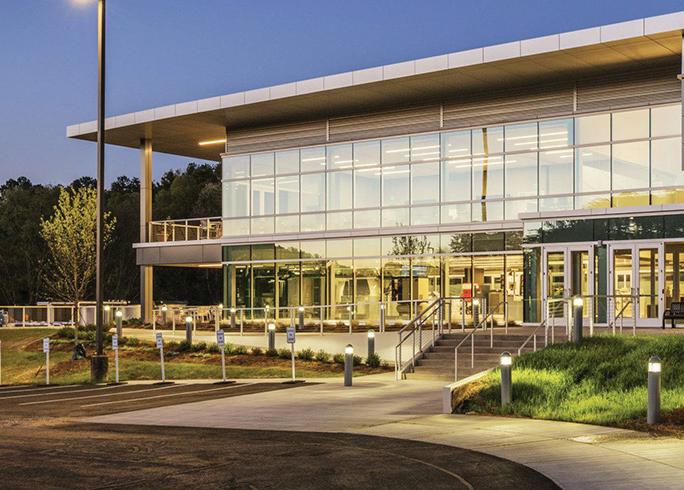
24 BUSINESS NORTH CAROLINA
DAVIDSON
NC TREND ››› Statewide
PHOTOS COURTESY OF PIEDMONT LITHIUM, INGERSOLL RAND AND BOSCH
EAST
FAYETTEVILLE
County commissioners approved the concept design for the $131.7 million Crown Event Center. The 3-story building will include a rooftop terrace and main event hall that can fit 3,000 attendees. The event center will be built on county-owned property in front of the county courthouse downtown and will replace the Crown Theatre and Arena, which will close by Oct. 31, 2025.

Methodist University hired Dr. Hershey Bell as the founding dean of the Methodist University College of Medicine. The school is a partnership between Methodist University and Cape Fear Valley Health, where Bell has been vice president for medical education program development. The two institutions plan to establish the school at Cape Fear Valley Medical Center and start classes in 2026.
GREENVILLE
ELIZABETHTOWN
Carthage-based Sovereign Aerospace started a flight school at the Curtis L. Brown Jr. Field Airport, and plans to create an apprenticeship program and a maintenance technician school. Bladen Community College is assisting on the project, which is expected to create at least 75 jobs over the next five years.

KINSTON

The Down East Wood Ducks, a Class A affiliate of the Texas Rangers, are moving to Spartanburg, South Carolina, as soon as 2025. The team had brought professional baseball back to Lenoir County in 2017 after a six-year absence. The Rangers sold the team to Diamond Baseball Holdings, which owns more than a dozen minor league teams.

Todd Olson, CEO of software tech giant Pendo, failed to get backing from Topsail Beach officials when the town’s planning board unanimously voted against rezoning nearly 30 acres on the island’s southernmost tip. Olson is under contract to purchase “The Point,” about 150 acres of coastline. Topsail’s Board of Commissioners will have final say.RTON
Former East Carolina University golfer Harold Varner III and his wife, Amanda, made an undisclosed investment to the Pirates Unite Campaign for Comprehensive Excellence. The Varners made the lead gift on an expansion of the men’s and women’s golf practice facility. Varner, who is from Gastonia, is a leading professional golfer.
LUMBERTON
UNC Health Southeastern invested $40 million to enhance its women’s health services through an initiative to upgrade its hospital services for women, mothers, and babies, while consolidating its women’s health clinics into one setting. Construction and renovations will take two years.
WILMINGTON
Approve, an equipment-finance software company that launched about a year ago, expects to create as many as 50 jobs after raising $3 million in initial funding. Investors included Cofounders Capital, Live Oak Ventures and VentureSouth. Approve is adding about 40 equipment distributors as customers each month.

25 JULY 2023
TOPSAIL
PHOTOS COURTESY OF EASTERN CAROLINA UNIVERSITY AND SOVEREIGN AEROSPACE
Alcami announced the retirement of CEO Patrick Walsh and the subsequent appointment of Bill Humphries. The contract development and life sciences manufacturer has about 1,000 employees at several locations across the country. Walsh has worked 42 years in the pharmaceutical industry, including CEO roles in six organizations.

TRIAD
GREENSBORO
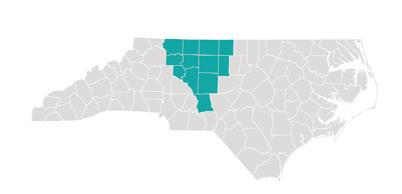
Chemical manufacturers Chemours, DuPont and Corteva agreed to contribute $1.19 billion to a fund to settle lawsuits brought by water utilities alleging that the companies contaminated drinking water supplies with chemicals called PFAS. Critics, such as the Cape Fear River Watch, criticize the plan as not enough to cover the damages done. The announcement came seven years after the Wilmington Star-News first reported on the presence of GenX compounds in the Cape Fear River.

Craft-beverage management software startup Ohanafy netted $2.8 million in its latest capital raise. Former nCino executive Natalie Waggett launched the company last year. Cape Fear Ventures led the investment round, which will allow Ohanafy to attract talent and invest in product innovation.

WILSON
Raleigh-based McConnell Golf expanded its eastern North Carolina presence with the acquisition of Wilson Country Club. The club opened in 1915. McConnell Golf, which celebrates its 20th anniversary this year, is the region’s largest owner of private golf clubs with courses in North Carolina, South Carolina, Tennessee and Virginia.
Phase Change Solutions will add 35 jobs and make a $3.5 million investment when it moves its headquarters to Guilford County. Phase Change Solutions manufactures advanced materials for temperature management for various industries, from construction to pharmaceuticals. The company had been headquartered in Asheboro.
Jet It, the 12th-largest U.S. private jet operator measured by fractional and charter flight hours, shut down. Founder and CEO Glenn Gonzales cited safety concerns, while trade publications reported the company encountered financial problems.
Triad Business Bank named Richard Cobb as chief financial officer. He had been chief accounting officer. Cobb was among the four people who started the bank in 2019 after previously working for Southern Bank & Trust and NewBridge Bancorp.
WILMINGTON
The City Council voted unanimously to move forward on buying the 12-story Thermo Fisher building downtown for $70 million. The city, which will consolidate offices there, will issue limited-obligation bonds to cover the purchase expected to close in mid-July.

ProKidney said it would build a $458 million facility and create 330 jobs over five years, with an average salary of $74,646. The company has 80 employees and provides late clinical-stage cellular therapeutics and focuses on chronic kidney disease. Guilford County commissioners offered the Winston-Salem company a $15 million incentives package.
Fuse Oncology closed on more than $8 million in capital with Cone Ventures and Northeast Georgia Health Ventures among the backers. Fuse, which was spun out of Cone Health in 2021, has raised more than $11 million since its launch.
26 BUSINESS NORTH CAROLINA NC TREND ››› Statewide
PHOTOS COURTESY OF OHANAFY AND PROKIDNEY
Environmental Air Systems, a mechanical contractor and HVAC custom manufacturer and builder, is adding about 200 jobs. e 500,000-square-foot expansion will double the company’s manufacturing oor space.

Two not-for-pro ts that o er senior living services for more than 2,000 residents across the state are merging in an equal partnership later this year. Brightspire (formerly known as Presbyterian Homes) and the Well-Spring Group have a combined $120 million in revenue and more than 2,100 employees. e combined organization operates ve continuing-care retirement communities in Burlington, Cary, Greensboro, High Point and Laurinburg.
TRIANGLE
CHAPEL HILL
Titan Medical, which had been developing a robotic surgical system, entered a license agreement with Intuitive Surgical for certain intellectual property. e deal includes an upfront payment of $7.5 million. Titan also announced CEO Cary Vance will step down.

DURHAM
Startup Wrangle secured $2 million in funding as it develops products that support the Slack collaboration so ware. e seed round was led by Accomplice, who was joined by other new investors, including Correlation Ventures and the Tweener Fund. Existing investors, including Bloomberg Beta and Eniac Ventures, participated.
GREENSBORO

Cone Health broke ground on a $160 million expansion of its Heart & Vascular Center at the Moses H. Cone Memorial Hospital. e center will add a 160,000-squarefoot, ve-story tower to the main campus.

Validic, a digital health and services company, acquired a subsidiary of Cox Communications and landed the communications conglomerate as an investor. Validic says the deal will enable a national expansion. Terms were not disclosed.

Humacyte, which is developing bioengineered tissue for use in various indications, landed a nancing agreement worth as much as $160 million with Oberland Capital Management, a New York-based private investment rm. e deal includes an upfront payment of $40 million and the opportunity for further funding based on speci c development and sales milestones.
Life Edit erapeutics partnered with Danish pharmaceutical giant Novo Nordisk to develop therapies for rare genetic disorders and cardiometabolic diseases. e gene editing rm will receive an undisclosed ash payment and the potential to earn additional payments worth as much as $1.9 billion.
North Carolina Central University School of Law named Patricia TimmonsGoodson its new dean, e ective July 1. e UNC Chapel Hill School of Law graduate served 28 years as a judge, and was on the state Supreme Court from 2006 to 2012.
27 JULY 2023
PHOTOS COURTESY OF ENVIRONMENTAL AIR SYSTEMS, VALIDIC AND NCCU SCHOOL OF LAW
NC TREND ››› Statewide

Aerami Therapeutics expanded its management team following the death of CEO Lisa Marie Yañez in a May car crash. Joshua Ziel was appointed chief operating officer and interim CEO. Gary Burgess was named chief medical officer and Sarah Fritchley is Aerami’s senior vice president for clinical development and operations. Net Power and its partner, Rice Acquisition Corp II, announced a combination that will mean proceeds of at least $670 million.
United Therapeutics plans a $500 million manufacturing facility to expand production of its Tyvaso DPI drug-device combination product that received FDA approval last year. The company employs about 460 people in North Carolina, or about half of its employment base.
Net Power started trading on the New York Stock Exchange with a market cap of more than $2 billion. The company expects its first plant, a $950 million project in Texas, to come online in 2026. The plan is to build other large-scale gas-fired power plants with net-zero carbon emissions.
Duke Health cut 280 positions as part of a realignment. Officials from the county’s largest employer said the cuts will come primarily from retirements and redeployments. Duke Health has 23,462 full-time employees, including more than 11,000 at Duke University Medical Center.
RALEIGH
Apple filed plans to build a 324,000-squarefoot office that will stand 73 feet tall, roughly six to eight stories. The building could house more than 3,000 workers. Apple announced plans in 2021 to build a $1 billion-plus engineering hub with intentions of creating thousands of high-paying jobs over a five-year period.
Walter Royal, a long-time chef at one of the city’s most popular restaurants, The Angus Barn, passed away. Royal was the executive chef for more than 25 years.
First Citizens Bank laid off about 500 workers at Silicon Valley Bank, which it acquired in March after the California bank was seized by federal regulators. First Citizens shares have more than doubled since the acquisition.
Mack Real Estate Group of New York and Raleigh-based SLI Capital started construction on a $700 million mixed use project near Dix Park. The first phase of “The Weld” will include two 20-story tall buildings featuring 675 apartment units.
SANFORD WEST
CANTON
After more than a century of service providing the town with thousands of jobs, the Haywood County paper mill sounded its final bell, signaling the permanent closure of the iconic site. Pactiv Evergreen laid off more than a 1,000 workers with its closure. The plant closing also created a $3 million hole in the town’s budget, forcing cutbacks like reduced pay increases for town employees, having them clean their own offices and no new Christmas decorations. Town employees will still receive a Christmas bonus.
ASHEVILLE
BOONE
The founders of Appalachian Mountain Brewery, cousins Nathan Kelischek and Chris Zieber, have repurchased the brewery they founded in 2011 from Anheuser Busch.

A 5-acre property in the North Carolina mountains is up for sale for $34 million, which is expected to break Buncombe County’s real estate sales record. Deerhaven Gardens is five miles from downtown Asheville and was built by Marcus and Pearl Katz in 2010. The estate rents for between $5,500 and $8,250 per night.

28 BUSINESS
CAROLINA
NORTH
PHOTO COURTESY OF APPALACHIAN
MOUNTAIN BREWERY
MFGCON
April 20-21, 2023




SCENESETTERS
In its eighth year, North Carolina’s premier manufacturing conference powered by NCMEP + Business NC was held at the Benton Conference Center in Winston-Salem. North Carolina’s most influential and cutting-edge manufacturing thought leaders networked and presented solutions to help address the challenges faced in modern manufacturing.

See more MFGCON 2023 photos at: businessnc.com/mfgcon-2023-photos | Photos by
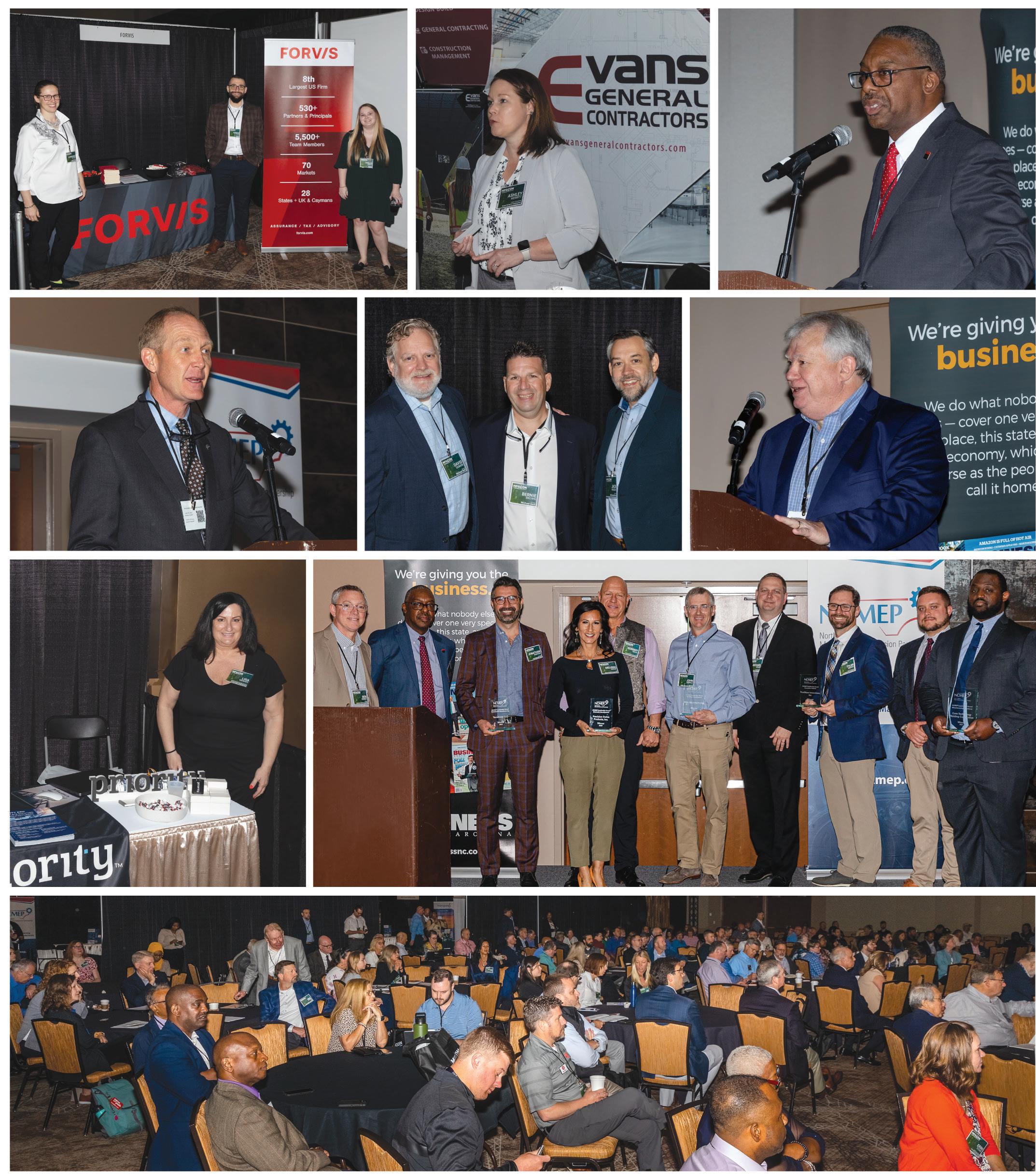
SPONSORED SECTION 2023 EVENTS
John Gessner
Adrienne Walker, Ahmad Al-Taher and Taylor Bonds, Forvis Ashley Merritt, Evans General Contractors Phil Mintz, NC State Industry Expansion Solutions
Greg Cox, Bank of America
David Sigmon, Bernie Brown and Jack Wiggen, Michael Best
Gary Andrews, Duke Energy
Lisa Weaver, Priority Software
CHALLENGING, BUT A 'LUCKIER PLACE'





















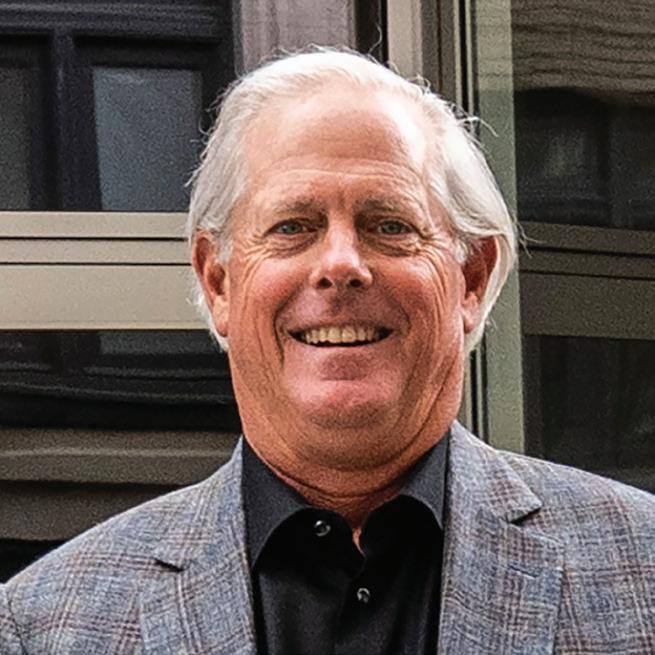



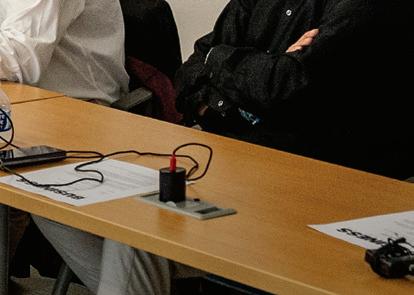




Commercial real estate is in the midst of major flux because of changing working and consuming habits. For this Business North Carolina round table at the Greensboro Chamber of Commerce, six commercial real estate pros gathered to discuss how the changes are affecting North Carolina. Major challenges are evident, particularly in office real estate, but the group agrees that North Carolina is well-positioned because of population growth and a positive economic and political climate.

30 BUSINESS NORTH CAROLINA SPONSORED SECTION ROUND TABLE COMMERICAL REAL ESTATE
Photography by Bryan Regan
Andy Andrews chairman and CEO, Dominion Realty Partners
Greg Hatem founder and managing partner, Empire Properties
Kimberly Kendall, SIOR, CCIM senior director, Colliers International
Adcock Real Estate Services, Dominion Realty Partners and Smith Anderson law firm sponsored the discussion. It was moderated by David Mildenberg, editor of Business North Carolina. It was edited for brevity and clarity.
WHAT’S GOING ON WITH OFFICE SPACE IN THE RALEIGH AND CHARLOTTE MARKETS?
KENDALL: It’s a big question mark, for a lot of different companies. They’re trying to figure out this whole outlook in the future, and nobody knows what it’s going to look like. Hybrid work is here to stay for a while. For certain sectors of business, it’s seamless to work from home. So call centers, those types of uses, they have completely gone remote. I don’t think they’re coming back, because they haven’t found a decline in productivity.
I think with other types of tech firms, and even law offices, they’re back in the office every single day. A report recently said that for the first time since the pandemic happened, we are at 50% occupancy across the country. That’s a



good sign, especially since you’re never at 100%. Before COVID, it was typically around 75% to 80%, at any given time. I would also share that for the first time, there have been five consecutive quarters of declining productivity. That’s the first time that’s happened since post World War II. Companies are realizing: “We thought we were productive, but it’s starting to go downhill.” Employees are starting to watch more Netflix instead of working or they’re doing laundry or walking their goldendoodle.
It’s still an employee-based world, and the employees want to work from home. In Charlotte, when you drive in on Tuesday, Wednesday or Thursday, it’s locked down traffic. Everyone, of course, picks to have Monday and Friday off. It’s going to flip, though. It’s going to go back to an employer-dictated environment. Then the employees will either have to find a new job, or go back five days a week if their companies are dictating they go back.
HATEM: We had a lot of unrest in 2020. People have found a way not to come to work. I don’t know how they do that. But I guess it’s a nice gig. So we’re trying to recruit people back into downtown. We’re jumping back in


and learning how to do all those things we did at the beginning to revitalize downtown again today.
In many ways, I’m not as excited about 50% occupancy, but you’re the optimist at the table, Kim. A 50% number popped up in a report on cell phone usage. In Raleigh, we’re at about 50% of what we were pre-pandemic. Some cities like Salt Lake City are at 70% to 80%. We’re at about 52%. We know there are fewer folks in our downtown, because everybody has a cellphone and they’re just tracking less usage. So that’s a little concerning.
As for employees choosing to work in person on Tuesday, Wednesday, Thursday, restaurants are pretty dead on Mondays. Folks come in on Friday evening. I think we’re going to continue to grow in this state and that will heal a lot of what’s happening. We just have to be a little more cautious about how we grow. With interest rates the way they are, we don’t have to be too cautious about growing, It’s dictated.
THORNTON: There’s a lot of talk about what the effect of hybrid working is going to be. I don’t think we’ve come to the point yet that employers are leasing
Steve Malloy owner and commercial broker, Adcock Real Estate Services

31 JULY 2023
Evan Stone vice president, industrial business development, The Carroll Companies
Mike Thornton partner and commercial real estate attorney, Smith Anderson law firm
smaller spaces because people are working from home. I haven’t heard of that yet because then what are they going to do on the days everybody comes in? It could happen soon. But I think the shrinkage in occupancy is more dictated by companies looking for more efficient space and cost savings. There’s talk about hoteling, (employees scheduling days or hours to use a workstation instead of permanent desks for each employee.) There’s talk about what you can do to bring people back into the office five days a week. Adding common workspaces, lounges, coffee bars and other amenities make being at the office more attractive. My primary clients are on the developer side, so that’s more challenging today, given the interest rates. But in a market like Raleigh and North Carolina we’re in a much luckier place. The economy in other parts of the country has bigger dips, the dips here are smaller because we have a more talented workforce and lower cost of living that continually attracts new business.
MALLOY: Being in the counties (surrounding Raleigh), we’ve never seen much office leasing. But a recent Wall Street Journal article said many privately held developments are financed by small and medium sized banks. It quoted someone who speculated when it comes
time to refinance, as many as 80% of those buildings may not refinance. And that could really put a lot of pressure on those small and medium banks. Is anyone seeing this in North Carolina?
KENDALL: Not as much with the small– and medium–sized banks, but we have seen some groups that have given back their notes or the banks have called the note. That’s already happening in Charlotte.


ANDREWS: We have a large office park called The Wade, it’s 600,000 square feet. During the pandemic, we’d count the cars to get an idea of how many people were physically there. We were down to 18%. Right now we’re at 60% physically occupied. We leased 75,000 square feet at The Wade last year. Every tenant we leased to cut their space by 50%. Tenants are saying: “Half of our folks want to stay at home or need to stay at home,”and they want to keep their employees.
We might have $1 billion (worth of projects under development) right now — not one of them is an office building. In Charlotte and Raleigh combined, there are 4 million square feet of sublease space that’s vacant, but tenants are still paying. It’s going to quit being paid on when the leases run out.

Then you’re going to have the lender problems that we’ve read about lately, and developers giving back the office buildings.
STONE: I’m having some tough conversations with some legislators about the shortage of housing and multifamily. The legislature is debating adaptive reuse for office space into condos and apartments. It’s interesting to balance that. Do we worry about getting too far out in front of our skis? You may need the office space later, and now it’s been converted to condos.
ANDY, YOU PUT APARTMENTS IN SOME CENTER-CITY OFFICE BUILDINGS, WHICH LOOKS SMART NOW.
ANDREWS: We delivered those buildings in July 2021. We were trying to limit our exposure. Instead of doing 450 apartments, we did 200 apartments, and 160,000 feet of office. We didn’t think we were overexposed on either one, which was how we could get a high-rise and then get the tenants’ name on the top of the building. So we could win that battle.
We have dissected what it costs to convert brand-new office space into apartments. It can be done. It is very expensive. But if you’re in uptown Charlotte or downtown Raleigh, the rents do justify the means. It’s going to be done, because you’re not going to fill those empty offices. You’re going to need to morph those buildings into something.
HATEM: I’m getting back to feeling like I’m back to the beginning (of revitalizing downtown Raleigh). Adaptive reuse is where we started. We took a 100-yearold building that was empty for 20 years and brought it back with retail, residential and office for the first time in decades. And, legislatively, we were
SPONSORED SECTION ROUND TABLE COMMERICAL REAL ESTATE 32 BUSINESS NORTH CAROLINA
able to adopt the North Carolina rehab code, which was the New Jersey code. It allowed you to change existing buildings from one use to another without bringing it to all new code. That’s what allowed us to do what we’ve done.
WHAT IS THE CREDIT SITUATION FOR REAL ESTATE BORROWERS RIGHT NOW?
THORNTON: Lenders are more cautious and underwriting is very hard to get for a new office building


financed without pre-leasing that’s pretty substantial, at least 40%. Interest rates aren’t the only issue. A lot of projects I work on get financed by private-equity companies. That’s really where we made up for the higher equity requirements back during the 2008 financial crisis. I’m starting to see the private-equity companies getting more conservative as well. I think that has as much to do with future development as the interest rate increases.
HATEM: When your cost of borrowing is almost nothing, the amount of money you can get from investing in normal things, everybody’s going to go into real estate. Now there are other alternatives in the marketplace to get a return and people are going for less risk. Banks, to your point, have other constraints.
33 JULY 2023
EVAN, IS INDUSTRIAL PROPERTY STILL THE BELLE OF THE BALL?

STONE: The starts have slowed down, but it’s still rolling. We’re in a market here that’s a little bit different nationally because of the economic development success. The last five or 10 years, what the legislature has done to bring down corporate tax rates has made a very business-friendly environment for industry to come into the area. So that’s kept industrial stoked. Even when people are kind of taking their foot off the gas, they haven’t hit the brakes, but just slowed the process. They’re either waiting until they get a better rate or they’re going to 50 banks rather than five. Maybe they’ve got all their sight work done or civil work done. They’re just waiting on the money.
STEVE, YOU HAVE AN INTERESTING PERSPECTIVE AS A PART OF THE CAROLINA CORE REGION THAT HAS ATTRACTED KEY MANUFACTURERS.
MALLOY: Obviously, you’ve all heard about Wolfspeed, VinFast and Toyota. Our area has also picked up a lot of life science businesses. Pfizer has grown like crazy. What we haven’t seen quite yet is some of those new businesses start to hire. We haven’t yet seen people come in, or the suppliers come in. We did a little research, and the life sciences sector apparently doesn’t have the same coattails that other industries do. So we’re just waiting.
Prices on the residential side for a subdivision have gone down a little bit, but it’s still very active. We have a
lot of situations, with a subdivision or industrial development, where if the first (buyer) backs out, there are two more in line to take it over. So we’ve been very fortunate. We were at an event in Johnson County about economic development and most of what was talked about was Lee County because of the regionalism. From Fuquay-Varina and Holly Springs to Asheboro, and from Greensboro down to Sanford, people and the governments are working together. It’s really exciting.
WITH SO MUCH ORDERING PRODUCTS ONLINE, IS THERE STILL SOME LIFE IN RETAIL?
STONE: We all went through this the time when we thought brick and mortar was going away and we’re going to Amazon with everybody shopping
SPONSORED SECTION ROUND TABLE COMMERICAL REAL ESTATE 34 BUSINESS NORTH CAROLINA
ADCOCK REAL ESTATE SERVICES
online. Now I think the event of going shopping or going somewhere is still refreshing for people. This has kind of slowed the death of brick and mortar. You still see some of your retail centers, North Hills in Raleigh, Ballantyne in Charlotte, Friendly in Greensboro, that are still busy. Maybe parking lots aren’t quite as full, but these shopping centers are still pretty robust. I think there’s a dichotomy there. From a growth standpoint, whether it’s brick and mortar or online, we all know that rooftops follow jobs and jobs follow economic growth. Retail follows growth and rooftops. So the growth is going to continue for North Carolina.
KENDALL: I do not specialize in retail, but what we are seeing relates to the adaptive reuse we talked about earlier. In Charlotte, there are several pockets
of adaptive reuse projects. They are marketing space as office and retail. It’s going more to retail users and it’s all experiential retail. It’s the breweries, indoor pickleball courts and ax throwing, rather than the big box stores.

MALLOY: With all our growth, even if the stores-per-person (ratio) reduces, retail is still going to grow in this area. I’ve got a quick side story. A couple of years ago, the first time I saw ax throwing was in Charlotte. I came back to Sanford and called the planning department and said, “Can I do that?”They said, “No, you can’t.” I said, “Show me where it is in the ordinances?” And they said, “Well, it’s not there. You just can’t do alcohol and axes.”
THORNTON: The thing about retail is, we’ve moved away from your
typical grocery-anchored strip center. In a lot of ways, what you’re seeing now are mixed-use developments that are creating a sense of place with restaurants, coffee shops and entertainment. I don’t know if we’ll ever get back to your typical strip-center economy because you have to compete with the convenience of ordering online. It may be a little early to tell how brick and mortar retail is going to do. But you see products coming out of the ground like Fenton (open air shopping district) in Cary and continuing retail development in North Hills in Raleigh. They’re very successful. We see all kinds of parking issues there because so many people are coming.
HATEM: To add to the point about experiential retail. If it’s a commodity, I’ll order online in a heartbeat. But if there’s something special, I’m looking for a kid’s
35 JULY 2023
book, or some special gift for somebody, I want to touch it. We were out getting our son a suit for his eighth grade dance. He’s got to try it on. So at some level, (in person) retail is always going to be there.



HOW SERIOUS OF A MARKET CORRECTION DO YOU EXPECT IN THE NEXT YEAR OR TWO?

THORNTON: If you’ve chosen a real estate career, then by definition you’re an optimist. We all believe it’s going to come back. We’re all playing for the long run. As for what’s going to happen in the next six months? Are we done with interest rate hikes? We’ve got to be pretty close, right? Inflation seems to be coming back under control. You have to adjust to how you’re financing projects. But I think that’s probably a short-term problem on a relative basis.
STONE: People are concerned. I don’t think you’re seeing the pain at your neighbor’s house or what maybe you saw in ‘08 and ‘09. Though there are definitely some market similarities. But I

do think it’s going to come back.

HATEM: If you’re in (commercial real estate) for the long haul, it’s the place to be. If you’re doing this, because you’re transactional, you’re going to get shaken out if you haven’t already. If you’re trying to get bridge financing to keep that building and get it financed, again, you’re a dead man walking. So you have to take that long view. And, we’re just fortunate we are in North Carolina.
FOR YOUNGER PEOPLE, IS REAL ESTATE AN EXCITING CAREER LOOKING OUT 10 TO 20 YEARS? WILL AI CHANGE EVERYTHING?




STONE: To Greg’s point, if they’re a long-view person, it’s good. If you want to make a bunch of money tomorrow, it’s not the right career. There’s a lot of teeth-cutting that goes on when you get into this business. I still learn stuff every day by talking to people in the industry, about putting different deals together and all the different factors.
“Even when people are kind of taking their foot off the gas, they haven’t hit the brakes, but just slowed the process.”
 –Evan Stone
–Evan Stone
ANDREWS: I think if you get into business in a down cycle, you’re much better off. You learn twice as much as getting in during an up cycle. I think if you’re with a good firm that’s got long-term vision, you’re going to reap the rewards for living through the down cycle. So you appreciate the uptick. And again, we’re in North Carolina, so it’s a better market.
MALLOY: I think AI will affect the agents, the brokerage side of things very much. Even now, people are doing video tours so you don’t need an agent right there. Eventually there’ll be digital closings, and you won’t even have to go. We want to be on the forefront of this kind of thing. We’re looking for different ways to get more involved with AI.
KENDALL: With the type of commercial estate that I’m involved with, it’s a relationship business. People like to do business with someone they like. So if you have good integrity, you know what you’re doing and you’re educated on your product, they’re going to enjoy doing business with you. This is not a cutthroat business. It can’t be a win-lose for both sides. It has to be meeting in the middle. Now one side may feel better in the end than the other. But at the end of the day, it can’t be a win-lose, because then you’re not going to have that repeat business in the future. And so, yeah, I think it’s a great opportunity for those who enjoy working with others. ■


SPONSORED SECTION ROUND TABLE COMMERICAL REAL ESTATE 36 BUSINESS NORTH CAROLINA


















38 BUSINESS NORTH CAROLINA
CELEBRATING SUCCESS






From o ering high-quality food and service to promoting the unparalleled success of their employees, these two corporate businesses are celebrating huge milestones. Catapult and Golden Corral, respectively, opened their doors in 1958 and 1973, and their successes are marked by important anniversaries this year. With a combined 115 years of experience, see how these businesses build communities and foster innovation for the future.

SPONSORED SECTION N.C. PORTRAITS CELEBRATING CORPORATE ANNIVERSARIES 39 JULY 2023
CATAPULT CELEBRATES 65 YEARS
Catapult Employers Association creates exceptional workplaces where engaged people drive business success.


Formed in 2021 with the merger of Capital Associated Industries (CAI) of Raleigh and the Triad and The Employers Association (TEA) of Charlotte, Catapult leverages 65 years of Human Resources experience to offer trusted HR and employment law advice, outsourced HR support, recruiting services, professional development, and more throughout the Carolinas and beyond.
Connect with us today to build your business with confidence and compliance.
letscatapult.org | (866) 440-0302
40 BUSINESS NORTH CAROLINA
GREAT PEOPLE GREAT CULTURE

If you ask the folks at Golden Corral why they’ve been successful for 50 years, that’s likely what they’ll tell you. ey employ great people, take care of great people and have a great culture, both in their restaurants and at the corporate level.




Golden Corral is known for its a ordable bu et options featuring traditional comfort foods, homemade desserts and their popular yeast rolls. e rst location opened in Fayetteville on January 3, 1973. e corporation is celebrating 50 years with a golden logo and an eye to the future. Since its rst location, Golden Corral has become the nation’s largest bu et restaurant chain.
at’s not all they’re known for, though. Golden Corral was recognized as a Top 10 Employer for medium companies with 30-75 employees by market research company DataJoe for its corporate o ce and support center. Outside of the company-owned locations and support center, over 20,000 people are employed by Golden Corral franchisees.
One of the company’s primary goals, outside of providing delicious, hearty food and friendly service, is giving back to the communities they operate within. rough the e orts of the restaurant teams and generosity of their guests, Golden Corral has raised over $14 million for Camp Corral, a nonpro t providing summer camp experiences for children of wounded, injured, ill, or fallen service members. rough their annual Military Appreciation Night, Golden Corral restaurants have served over 6 million “thank you” meals and partnered with DAV to raise nearly $18.5 million to support our nation’s veterans. e Raleigh-based brand also established the GC Cares Fund, which helps employees with nancial assistance in times of need.
At 50 years, Golden Corral is halfway through their 100-year plan, which focuses not only on continuing to improve their bu et dining experience but aims to expand in other areas. For example, a new fast-casual concept called Homeward Kitchen is slated to open in Southern Pines before the end of the year.
SPONSORED SECTION 41 JULY 2023
5400 Trinity Road, Suite 309 Raleigh, NC 27607 919-781-9310 goldencorral.com
STAYING ON TOP
NORTH CAROLINA’S MOST JOB-RICH ECONOMIC DEVELOPMENT PROJECTS OF 2022-2023
 By Lawrence Bivins
By Lawrence Bivins
In the wake of record-setting job creation announcements in 2020 and 2021, North Carolina continues to show why global media outlets heap praise on the state as a top business destination.
Wolfspeed’s $5 billion investment in Chatham County tops the list and symbolizes the country’s move to electric vehicles and an economy much less dependent on fossil fuels.
High-profile expansions were announced by U.S.-based manufacturers such as GE and Energizer, while the state also was chosen for direct investment by companies in Australia, Finland, Germany, Italy and the United Kingdom.
North Carolina continues to excel in life sciences, as well as transportation equipment, aviation services, building products, consumer foods and financial services.
This year’s Top 25 list ranks projects from June 2022 through May 2023 based on job creation. Details are gleaned from N.C. Department of Commerce and Economic Development Partnership of North Carolina reports, as well as news coverage. Amid unpredictable shifts in global economic conditions, not every company will meet its mark. Some, however, will exceed expectations when it comes to job growth and capital expenditures once operations get going.
42 BUSINESS NORTH CAROLINA
ECONOMIC DEVELOPMENT
1. WOLFSPEED
Durham
▪ NEW JOBS: 1,802
▪ COUNTY: Chatham
▪ PROJECTED INVESTMENT: $5 billion
▪ N.C. CASH INCENTIVES: $76.1 million over 20 years
For the second year in a row, Chatham County took home the No. 1 spot as Durham-based Wolfspeed announced plans to build the world’s largest silicon carbide production site at the ChathamSiler City Advanced Manufacturing megasite. e company makes semiconductor chips and devices that power electric vehicle inverters and charging systems. It is hoping to bene t from the so-called CHIPS and Science Act passed by Congress last August to promote U.S. manufacturing. e initial $1.3 billion phase of Wolfspeed’s 445acre campus is expected to open next year, with additional capacity to be added through the end of the decade. e Silicon Carbide wafers produced there will supply the company’s $1 billion Mohawk Valley chip factory, which opened last year near Utica, New York.


2. SIEMENS MOBILITY

Munich
▪ NEW JOBS: 500
▪ COUNTY: Davidson
▪ PROJECTED INVESTMENT: $220 million
▪ N.C. CASH INCENTIVES: $5.64 million over 12 years
In unveiling plans for a 200-acre passenger railcar plant and service center in Davidson County, company executive Marc Buncher called Lexington “our new East Coast hometown.” e division of Germany’s Siemens AG is a global leader in many industries, including railcars. Buncher cited proximity to customers as a factor in picking the site. Siemens Mobility paid $16.2 million for the property at Lexington Industrial Park, a public-private partnership between the city of Lexington and Front Street Capital, a commercial real estate rm based in Winston-Salem.
3. GE HITACHI NUCLEAR ENERGY


Wilmington
▪ NEW JOBS: 485
▪ COUNTY: New Hanover
▪ PROJECTED INVESTMENT: $85 million
▪ N.C. CASH INCENTIVES: None
GE has been a leader in nuclear power technologies since 1955. It began making fuel for nuclear plants in Wilmington in 1969 and, in 2003, moved its nuclear energy division headquarters there from San Jose, California. GE Nuclear’s joint venture with Japan’s Hitachi Group began in 2007. Its latest Wilmington expansion is being driven by a partnership with TerraPower, a designer of nuclear reactors founded by Bill Gates in 2006. e project has support from the U.S. Department of Energy’s Advanced Reactor Demonstration Program. e project expects to boost payroll by $63.5 million annually and help build the supply chain for a new generation of nuclear power plants, GE-Hitachi says.
43 JULY 2023
PHOTOS COURTESY OF WOLFSPEED, SIEMENS MOBILITY AND GE HITACHI
4. SO-PAK-CO
Mullins,
South Carolina
▪ NEW JOBS: 440
▪ COUNTY: Scotland
▪ PROJECTED INVESTMENT: $85 million
▪ N.C. CASH INCENTIVES: $4.6 million over 12 years
Founded in 1943, So-Pak-Co is a top supplier of military eld rations, also known as meals ready to eat or MRE, to the U.S. military. e company also makes foods for major national brands such as Bush’s Baked Beans. e company opted for Laurinburg over nearby sites in Bentonville and Mullins, South Carolina, for its latest expansion. In addition to its $4.6 million Job Development Investment Grant, the project will receive $2.2 million in road enhancements from the N.C. Department of Transportation and $585,000 in training support from the N.C. Community College System. e 440-job expansion is said to be the largest-ever economic development win for Scotland County, which had the state’s highest unemployment rate, 6.8%, as of April.

6. (TIE) ALPITRONIC AMERICAS


Bolzano,
Italy
▪ NEW JOBS: 300
▪ COUNTY: Mecklenburg
▪ PROJECTED INVESTMENT: $18.3 million
▪ N.C. CASH INCENTIVES: $2.3 million over 12 years
Founded in 2009 and based in northern Italy’s South Tyrol region, Alpitronic develops and produces hyperchargers, the high-powered DC charging stations that recharge electric vehicles. Downtown Charlotte will be home to the company’s U.S. headquarters. Alpitronic’s 70,000-square-foot space will include administrative o ces and areas for testing and repair of its charging stations. Positions will average $90,000 in annual pay.

5. BANK OF LONDON
London
▪ NEW JOBS: 350
▪ COUNTY: Mecklenburg
▪ PROJECTED INVESTMENT: $33 million
▪ N.C. CASH INCENTIVES: None
Charlotte’s reputation as a nancial technology hub grew bigger with the mid-2022 announcement by e Bank of London that it would base its U.S. global platform and services headquarters in the Queen City. e company, founded in 2021, said it will employ 350 people in 40,000 square feet of space at One Independence Center downtown. So ware developers, engineers, technology professionals and risk management specialists are among the positions created by the business, which provides clearing and other transaction services for nancial services companies. Since inception, Bank of London has raised $160 million and has a valuation of $1.1 billion, the company said earlier this year.

44 BUSINESS NORTH CAROLINA
ECONOMIC DEVELOPMENT
6. (TIE) KEMPOWER
Lahti, Finland
▪ NEW JOBS: 300
▪ COUNTY: Durham
▪ PROJECTED INVESTMENT: $41 million
▪ N.C. CASH INCENTIVES: $3 million over 12 years
Kempower’s lease of 154,000 square feet of space at Durham’s Tri-Center Park is expected to double the Finnish company’s worldwide operations. Kempower CEO Tomi Ristimäki liked the Bull City’s bustling tech scene and community vibe. “I think that the way in which di erent cultures and diversity are re ected locally ts perfectly with Kempower’s values. One example of the diversity is that approximately 30% of start-ups in the region are run by women,” Ristimäki says. Formed in 2017, Kempower trades on the Helsinki stock exchange and employs 460 people, according to its website. e company also considered sites in Tennessee and Virginia.
8. NVR
Reston, Virginia
▪ NEW JOBS: 261
▪ COUNTIES: Cleveland and Cumberland
▪ PROJECTED INVESTMENT: $33.9 million
▪ N.C. CASH INCENTIVES: $1.64 million over 12 years
NVR constructs and sells homes in 15 states under the Ryan Homes, NVHomes and Heartland Homes brands, notching $10.5 billion in revenue in 2022. e company will expand capacity at its existing Kings Mountain facility and build a 145,000-square-foot plant in Fayetteville. NVR, which has operated in Cleveland County since 2002, will add 58 positions to its current 230-person workforce in Kings Mountain. e company considered locations in Georgia and Florida for its expansion.




9. ABEC
Bethlehem, Pennsylvania
▪ NEW JOBS: 251
▪ COUNTY: Wilson
▪ PROJECTED INVESTMENT: $11 million
▪ N.C. CASH INCENTIVES: $2 million over 12 years
Pharma rms around the world are customers of ABEC, which provides bioprocess solutions, equipment and services. e company’s latest expansion will consume a 50,000-square-foot shell building at Wilson Corporate Park, where it will make single-use stainless steel and hybrid vessels for delivery of therapeutics. ABEC also has facilities in Missouri, Pennsylvania, China and Ireland. e company paid Johnson-Miller Development $2.45 million for the property near the intersection of Interstates 95 and 587.

45 JULY 2023
PHOTOS COURTESY OF KEMPOWER, RYAN HOMES AND ABEC
10. MARSHALL USA
Cambridge, United Kingdom
▪ NEW JOBS: 240
▪ COUNTY: Guilford
▪ PROJECTED INVESTMENT: $50 million
▪ N.C. CASH INCENTIVES: $2.4 million over 12 years
Britain’s largest private aerospace and defense business plans a major maintenance, repair and overhaul operation at Greensboro’s Piedmont Triad International Airport. Marshall Aerospace’s history in serving military organizations extends to World War II. Its PTI location will support current and anticipated Pentagon contracts, with the initial phase oriented toward the U.S. Marine Corps’ C-130 Hercules tactical transport aircra . Marshall considered 30 sites before identifying nalists in Alabama, Kansas, Missouri and North Carolina. e rm’s site-selection team said it was drawn by the Triad’s workforce availability, training, supply-chain links, “political and economic landscape,” site quality and nancial incentives.
12. DYMAX
Torrington, Connecticut
▪ NEW JOBS: 227
▪ COUNTY: Union
▪ PROJECTED INVESTMENT: $46.7 million
▪ N.C. CASH INCENTIVES: $1.25 million over 12 years
Union County’s strategy for attracting aerospace and aviation jobs is showing momentum. Already home to ATI, Collins Aerospace and others, the city of Monroe last summer welcomed Dymax, a maker of adhesives and coatings for use by aerospace, automotive, medical device and other manufacturers. e company, founded in 1980, is working with Charlotte-based contractor Shelco on constructing a 100,000-square-foot space near Charlotte-Monroe Executive Airport. e site will house manufacturing, warehousing and o ce operations.


11. SUPREME CABINETRY BRANDS



Howard Lake, Minnesota
▪ NEW JOBS: 237
▪ COUNTY: Iredell
▪ PROJECTED INVESTMENT: $17.4 million
▪ N.C. CASH INCENTIVES: None
Strong demand for high-quality residential cabinetry in the southeastern U.S. has meant consistent growth for Dura Supreme Cabinetry. Part of a closely held Minnesota company formed in 1954, Supreme Cabinetry selected a 300,000-square-foot building in Statesville that was previously an Ashley Furniture distribution center. e company moved into the site in April and hopes to ship hand-cra ed cabinetry to its dealers later this year.
46 BUSINESS NORTH CAROLINA
ECONOMIC DEVELOPMENT
PHOTOS COURTESY OF MARSHALL USA, SUPREME CABINETRY BRANDS AND DYMAX
13. EPOC ENVIRO


Belrose,
New South Wales, Australia
▪ NEW JOBS: 226
▪ COUNTY: Iredell
▪ PROJECTED INVESTMENT: $4.1 million
▪ N.C. CASH INCENTIVES: $1.3 million over 12 years
With its name derived from the acronym for “Emerging Pollutants of Concern,” EPOC Enviro is a subsidiary of Australia’s OPEC Systems. e 31-year-old company has developed environmental remediation solutions for removing per- and poly uoroalkyl substances (PFAS) from soil, water and man-made surfaces. EPOC’s products and services are now used mostly in Europe. A 264,000-square-foot industrial building, developed by the Colliers real estate rm at Statesville Commerce Center, will be the site of the company’s rst U.S. manufacturing plant.

14. ATOM POWER
Huntersville
▪ NEW JOBS: 205
▪ COUNTY: Mecklenburg
▪ PROJECTED INVESTMENT: $4.2 million
▪ N.C. CASH INCENTIVES: $1.2 million over 12 years
Atom Power makes electric-vehicle charging equipment based on its innovative vision for “networked energy.” e company says its solid-state digital circuit breaker provides greater reliability and control to EV charging at commercial eet operations and multifamily residential buildings. Atom Power plans to add to its current 82-person workforce at e Park - Huntersville with positions that will include engineers, technicians and manufacturing operators. Last summer, SK, Korea’s second-largest conglomerate, invested $100 million in Atom Power. CEO Ryan Kennedy cofounded the company in 2014.

15. LIVE OAK BANK
Wilmington
▪ NEW JOBS: 204
▪ COUNTY: New Hanover
▪ PROJECTED INVESTMENT: $25 million
▪ N.C. CASH INCENTIVES: $1.54 million over 12 years
Founded by veteran nancial executive Chip Mahan in 2008, Live Oak Bank has helped revitalize the Port City with a cloud-based, national platform that operates in 50 states while not including branch o ces. It is among the nation’s leading facilitators of loans tied to the Small Business Administration and U.S. Department of Agriculture lenders. In boosting its workforce above the 1,000 mark, Live Oak is hiring analysts, underwriters, lending sta , infotech professionals and others at compensation averaging $101,000. at is about twice New Hanover County’s average wage. e rm is working with the LS3P architectural rm and Monteith Construction to add a fourth building at its campus.

47 JULY 2023
PHOTOS COURTESY OF EPOC ENVIRO, ATOM POWER AND LS3P
16. (TIE) JAVARA

Winston-Salem
▪ NEW JOBS: 200
▪ COUNTY: Forsyth
▪ PROJECTED INVESTMENT: n/a
▪ N.C. CASH INCENTIVES: None
Founded in 2018, Javara connects patients with clinical trials and expanded access to treatments that might not otherwise have been available. e female-owned company, whose name is Hindi for “tide,” announced in 2022 plans to double its workforce to 400 over two years. Based in Winston-Salem’s Innovation Quarter, Javara raised more than $47 million last year from General Atlantic, a big New York-based private-equity rm.



16. (TIE) EMTELLE
Hawick, Scotland, United Kingdom
▪ NEW JOBS: 200
▪ COUNTY: Henderson
▪ PROJECTED INVESTMENT: $16 million
▪ N.C. CASH INCENTIVES: None

Scotland’s Emtelle has manufactured telecommunications equipment since 1980. Surging demand from North American customers is driving the company’s $16 million investment in the Henderson County community of Fletcher. It will operate in about one-third of a 300,000-square-foot building owned by Mainetti Retail Solutions, an Emtelle sister company that entered the county in 2017. It’s Emtelle’s rst U.S. location to supply products for ber-to-the-home solutions.
16. (TIE) ALBEMARLE
Charlotte
▪ NEW JOBS: 200
▪ COUNTY: Mecklenburg
▪ PROJECTED INVESTMENT: $180 million
▪ N.C. CASH INCENTIVES: $1.24 million over 12 years
Seven years a er moving its headquarters to Charlotte from Baton Rouge, Louisiana, the mining and chemical processing company announced plans to add 200 jobs in the University City area as it creates a major advanced materials R&D center. e center’s mission is to bring innovative products to the red-hot lithium battery market. In addition to its headquarters, Albemarle operates a lithium processing facility in Kings Mountain. It is planning another processing facility, entailing a $1.3 billion investment, in Chester County, South Carolina, about an hour southeast of Charlotte.
48 BUSINESS NORTH CAROLINA
PHOTOS COURTESY OF INNOVATION QUARTER, ALBEMARLE AND EMTELLE ECONOMIC DEVELOPMENT
16. (TIE) CATALENT
Somerset, New Jersey
▪ NEW JOBS: 200
▪ COUNTY: Durham
▪ PROJECTED INVESTMENT: $40 million
▪ N.C. CASH INCENTIVES: $805,500 over 12 years
North Carolina’s life science infrastructure and abundant talent continue to draw companies engaged in cellular and gene therapeutics. A er considering locations in Virginia, Kansas and Missouri, Catalent selected a site on the Durham County side of Research Triangle Park. e project adds capacity to provide bioanalytics and other services to Catalent’s East Coast customers. Earlier in 2022, Catalent acquired Metrics Contract Services, a contract drug development and manufacturing business in Greenville, for $475 million.
20. ZIEHL-ABEGG
Künzelsau,
Germany
▪ NEW JOBS: 189
▪ COUNTY: Forsyth
▪ PROJECTED INVESTMENT: $100 million
▪ N.C. CASH INCENTIVES: $400,000 over three years
Ziehl-Abegg began making motors in Germany in 1910. It now employs 5,000 worldwide while making fan systems and motors for industrial buyers in healthcare, data centers, education and agribusiness. New operations at Union Cross Industrial Center in Winston-Salem are part of Ziehl-Abegg’s strategic expansion into North American markets. Chief Operating O cer Joachim Ley called the initial ramp-up to 189 employees “the rst step” in the company’s plan. “We are anticipating growing to over 500 employees very rapidly,” he says. e state’s grant comes from the One North Carolina program.

21. NOVO NORDISK


Bagsværd, Denmark
▪ NEW JOBS: 185
▪ COUNTY: Johnston
▪ PROJECTED INVESTMENT: $650 million
▪ N.C. CASH INCENTIVES: None
e Danish bio manufacturer’s leadership in insulin and related therapeutics continues to ourish with the success of Ozempic, its diabetes treatment, and surging sales of its obesity drug Wegovy. Last September, Novo Nordisk sketched out a 12-year vision for growing its presence in Clayton, where it has invested vigorously since arriving in the mid-1990s. In March, Novo Nordisk bought 104 acres adjacent to its two huge Johnston County plants for $6.8 million. e company has not disclosed plans for the newly acquired property.


49 JULY 2023
PHOTOS COURTESY OF ZIELL-ABEGG AND NOVO NORDISK
22. FORZA XI
Fort Pierce, Florida
▪ NEW JOBS: 170
▪ COUNTY: McDowell
▪ PROJECTED INVESTMENT: $10.5 million
▪ N.C. CASH INCENTIVES: $1.4 million over 12 years
An electric-vehicle subsidiary of Twin Vee PowerCats, Forza X1 is manufacturing battery-powered recreational boats. In March, it moved into a temporary location in Old Fort while a large site is being cleared and graded next to the Universal Advanced Manufacturing Center in Marion, the company’s permanent home. e building will be o Interstate 40, just half a mile from McDowell Technical Community College. Twin Vee PowerCats reported $23.2 million in net sales for 2022, more than double the previous year.

23. SEG SYSTEMS


Charlotte
▪ NEW JOBS: 150
▪ COUNTY: Mecklenburg
▪ PROJECTED INVESTMENT: $130 million
▪ N.C. CASH INCENTIVES: None
SEG Systems designs and engineers integrated display solutions used in promoting brands and products in retail spaces, o ces, trade show oors and special events. e company, founded in 2014, signed a 10-year lease in early 2023 for about 225,000 square feet of the Interchange Logistics Center in Huntersville. Trinity Capital Advisors is developing the industrial space, which is expected to be ready for use later this year.

24. ENERGIZER HOLDINGS
St. Louis
▪ NEW JOBS: 144
▪ COUNTY: Randolph
▪ PROJECTED INVESTMENT: $43 million
▪ N.C. CASH INCENTIVES: $450,000 over three years
Energizer Holdings, whose Energizer, Rayovac and Eveready battery brands are sold around the world, was founded in 1896. e company established manufacturing operations in Asheboro 75 years ago. Its latest expansion adds production and packaging capacity across its two sites there, which employ a combined 411 workers. Abe Prandini, the local plant manager, called the company’s $43 million investment in Randolph County “a testament to the area’s workforce.” State support for the project comes via a performance-based grant from the One North Carolina program.

50 BUSINESS NORTH CAROLINA
PHOTOS COURTESY OF FORZA XI AND SEG SYSTEMS ECONOMIC DEVELOPMENT
25. DESIGN MODE CABINETRY

Raleigh
▪ NEW JOBS: 139
▪ COUNTY: Duplin
▪ PROJECTED INVESTMENT: $13 million
▪ N.C. CASH INCENTIVES: $425,000 over three years
Design Mode Cabinetry, a unit of Raleigh-based 1st Choice Cabinetry, searched for an existing building convenient to its Carolinas customer base. e residential cabinet maker came upon an available 245,000-square-foot building in Warsaw that had been used for storing agribusiness equipment. e company’s choice over a competing site near Myrtle Beach, South Carolina, brings 139 manufacturing jobs to farm-rich Duplin County. A $375,000 grant from the N.C. Department of Commerce is helping fund the building’s renovation and reuse. Design Mode is also eligible for $425,000 in payments through the One North Carolina program.
BY THE NUMBERS #1
AMERICA’S TOP STATE FOR BUSINESS (CNBC)
STATE OF THE YEAR (Business Facilities magazine)







PROSPERITY CUP Best state-level business recruitment/retention success
Third straight year as No. 1 (Site Selection magazine)
NORTH CAROLINA’S 2022 SCORECARD
27,144 announced jobs (compares with 23,748 in 2021)
$15.58B
announced capital investment (compares with $10 billion in 2021)
$1.55B
projected new annual payroll (compares with $1.83 billion in 2021)
BIGGEST JOBS ANNOUNCEMENTS — on delay/cancel —
source: Business North Carolina
51 JULY 2023
Vinfast 7,500 Centene 3,237 Lowe’s 1,600 Amazon 3,000 Macy’s 2,800 Apple 3,000 Amazon 1,200 AvidXchange 1,229 Toyota 1,750 Google 1,000 Bandwidth 1,165 Chewy 1,200 Boom Supersonic 1,750 Bioagilytix Labs 878 Microsoft 930 Publix Super Markets 1,000 Amazon 800 Pratt Whitney 800 Q2 Solutions 749 Honeywell International 750
2022 2021 2020 2019
Economic Development Partnership of North Carolina
Transaction Titans
By Kevin Ellis
The North Carolina Economic Development Association honored its top achievers at its annual conference last month in Wilmington. e award winners, representing both big cities and small towns, helped arrange signi cant deals that brought jobs and investments to their communities.

DEAL OF THE YEAR SMALL MARKET PISGAH LABS



Pisgah Labs’ 2022 expansion in Transylvania County was not just an economic win, but helps establish an area best known for tourism and retirement living as a player in biopharmaceuticals. Pisgah Labs started in 1981 and now holds 31 patents. e company manufactures active ingredients in medicines and the $55 million expansion added 57 jobs to the site, tripling its workforce, and allowing it to manufacture intravenous medicines.
Transylvania County Manager Jaime Laughter describes the project as the largest single economic development project in recent history. e new jobs will have an annual salary of about $60,000, compared with the county’s current average wage of about $39,000.
Burton Hodges executive director Transylvania Economic Alliance
Hodges helped Pisgah Labs recognize the county of about 33,000 residents has an available workforce with the skills and education programs that align with biotechnology. Hodges started working in Transylvania County in February 2022 a er about six years with Henderson County’s economic development group. He has a political science and communications degree from Brevard College.

52 BUSINESS NORTH CAROLINA
ECONOMIC DEVELOPMENT
California-based SteriTek wanted to start its rst East Coast site on a property that had enough surrounding land for additional life sciences employers. e medical and pharmaceutical sterilization company purchased 85 acres as part of a $71 million investment that will create 50 jobs in Burlington.
SteriTek plans to use about 13 acres, leaving room for four more building sites, serving as a long-term opportunity for life sciences investments in Burlington. Bishop was especially helpful in assisting SteriTek to nd its own property, as well as land for future development.
e SteriTek project will help Alamance County brand itself as a life-sciences hub. is project took advantage of Alamance Community College’s decision to start a biotechnology center. e move builds on the momentum of the burgeoning biotech, pharmaceutical, and medical technology industries in the region bordering Research Triangle Park in Durham and Wake counties. Burlington is also the headquarters of testing giant Labcorp.
Bishop and Putnam worked for almost a year in recruiting SteriTek to Alamance County, guiding the project through the local incentives process. “ eir work was crucial to massage the bumps in the road and get the project across the line,” wrote Alamance Chamber President Reagan Gural and Blake Moyer, formerly with the city of Burlington’s economic development agency, in nominating the duo. Moyer is now president of the Surry County Economic Development Partnership.
e new positions are expected to pay on average $52,500, which exceeds Alamance County’s average annual wage of about $46,200.
DEAL OF THE YEAR LARGE MARKET WOLFSPEED

Almost one-third of Chatham County’s roughly 78,000 residents travel outside the county for work, many of them headed to neighboring Wake, Orange, Durham or Guilford counties. ose numbers seem certain to shi in future years a er back-to-back colossal economic wins last year.
First, Vietnam-based VinFast announced in March it would invest $4 billion and create 7,500 jobs in an electric-vehicle plant in Chatham County. At the time, it was the largest economic development project announced in state history. e county’s economic development team led by Smith followed that up in September with the $5 billion, 1,800job Wolfspeed project — topping VinFast as a state record for investment.
“Winning one of those monsters is overwhelming. Winning two of those brings the overwhelmingness up a notch,” says Smith, who has been recruiting businesses in North Carolina since 1999.

Durham-based Wolfspeed, which was called Cree until 2021, makes silicon carbide semiconductors for electric vehicles, rail systems, appliances and other products.
Before arriving in Chatham County in January 2021, the Durham native and East Carolina University graduate had spent more than 20 years working with local organizations and the N.C. Department of Commerce. At his previous leadership position in neighboring Lee County, his successes included four of the top 25 job announcements in BNC’s 2019-2020 rankings. Smith has also worked for local economic development groups in Davidson, Iredell and Stanly counties.


“A lot of people put in a whole lot of work before I got here,” Smith says. “And I’m not talking months, I’m talking years.” He also credits County Manager Dan LaMontange, County Attorney Bob Hagemann and former colleague Sam Rauf as major contributors to landing Wolfspeed. (Rauf moved to Wake County Economic Development last year.) Property owners of the two megasites had faith in the county’s e orts, says Smith.
“ e minute I started (in Chatham County). we were on re,” says Smith of his role. “I was a part of a winning team.”


53 JULY 2023
DEAL OF THE YEAR midsize MARKET STERITEK
Peter Bishop director of economic development, city of Burlington
David Putnam senior director for economic development, Alamance Chamber
michael smith president, Chatham County Economic Development
Emerging leader of the year


Growing up in Warren County, Charla Duncan had her future planned. “ e story of success a lot of times growing up in a small town looks like moving away,” says Duncan. A er receiving a bachelor’s degree at UNC Greensboro in 2008, she attended graduate school in New York City and taught high school students in High Point and Charlotte.
By 2016, she was ready to return home. “I came to accept I am just a small town girl, and that’s OK.” Part of her job, she says, is challenging the notions of what’s possible in rural North Carolina. What happens in a county of fewer than 19,000 residents can make a splash in a state approaching 11 million people, she believes.
Duncan worked in Granville County before taking a job as the county manager’s assistant in Warren County in 2019. She was named economic development director in August 2020. Her agency was renamed Community and Economic Development. “It’s been my charge to take us into more community development work — housing, transportation, educational attainment, and things like that where you don’t o en see traditional economic development focused.”

Brady Martin, who chairs the county economic development group, says Duncan has helped bring millions of dollars for broadband expansion. Warren County also has gained more than $3.5 million in grants for utility improvements, a farmers market and other projects. She assisted textile company Glen Raven’s decision to invest $82 million and create 205 jobs in 2021, “the largest business expansion project in the county in 30-plus years,” Martin says. at project received a $1 million state economic grant.
Duncan is seeking to persuade the state to revive passenger rail service from Warrenton to Raleigh, which would boost the economy, health care and cultural opportunities. She and her husband organize community soccer games at Mill Hill Brewery in Warrenton. She and a friend hold trivia nights twice each month at Bragging Rooster, a meadery and brewery.
“It’s events like that where people feel a connection to a place,” she says. Duncan is working toward becoming a certi ed economic developer through the N.C. EDA with courses at East Carolina University.
PRESIDENT’S AWARD


Donny Hicks graduated from UNC Charlotte in 1983 with a degree in political science. e next year, while working on a master’s degree in public administration from UNC Chapel Hill, Hicks joined Gaston County Economic Development. He was promoted to the director’s job the following year, and continues to help bring jobs and investment to the county just west of Charlotte.

“Eventually I’m going to want to do something else, but right now I couldn’t be happier,” says Hicks, a two-time winner of the association’s economic developer of the year award. It helps that Gaston County is in higher demand by industry than at any time in the past 39 years, he says.
is year, Hicks received the President’s Award, given at the discretion of the group’s president, Chris Platé, who is executive director of Monroe-Union County Economic Development.
“ ere are only a few people in our business who deserve to be on the Mount Rushmore of economic development, and Donny’s body of work over the years makes him one of them,” says Platé. “It’s one thing to be successful in the easiest of times, it’s another thing to be successful in the di cult times.”

54 BUSINESS NORTH CAROLINA
Charla Duncan director of community and economic development, Warren County Government
DONNY HICKS executive director, Gaston County Economic Development
ECONOMIC DEVELOPMENT
Economic developer of the year
In 2009, Marvin Price wasn’t sure what to do with his new political science degree from Alabama’s University of Montevallo. An internet search led him to Auburn University for a master’s degree in economic development. From there he interned at Alabama’s economic development group, and then worked for the Birmingham Business Alliance.
In 2016 he le his native state to join the Charlotte Regional Business Alliance, where he was vice president before jumping to his current post in November 2020.
“I got a taste of it and I just never wanted to let it go,” says Price. “Even today, when I get a [request for information], I feel like I’m 24 again and just starting out. at’s an opportunity for you to show o your community, that’s an opportunity for our county, that’s an opportunity for you to help someone get a job.”
He has helped recruit, create and retain 9,000 jobs and $5.1 billion in investments to the state. His e orts led his peers to name Price the state’s economic developer of the year.
In Greensboro, he has been part of some of the state’s biggest job announcements. In the past 18 months, Greensboro and Guilford County have landed expansions and new businesses such as Boom Supersonic, LT Apparel, IQE, TAT Piedmont Aviation and Marshall Aerospace.
ose companies represent $628 million in projected investment and potentially 2,233 jobs.
“Maybe he is the community’s good luck charm,” says Shahid Rana, senior program manager for Mecklenburg County Economic Development.
Price, who is known for his bow ties, says his southern drawl helps put people at ease. “He has the ability to listen for what a company needs and then see how we as an organization can help them,” says Megan Mabry, the Greensboro Chamber’s executive vice president of marketing.

e state’s third-largest city touts some advantages over its larger rivals, Charlotte and Raleigh. An outer loop interstate mitigates tra c congestion. Piedmont Triad International Airport has become an aviation manufacturing and repair hub. Four area colleges serve about 50,000 students annually: UNC Greensboro, North Carolina A&T State University, High Point University and Guilford College. N.C. A&T is the nation’s largest historically Black university, a selling point for companies seeking a more diversi ed workforce.
Businesses visiting the downtown Chamber o ce o en note the International Civil Rights Center and Museum across the street. “It opens their eyes,” Price says. Greensboro’s diversity, infrastructure and pro-business leaders make it a community on the rise, he says.
“North Carolina is o en cited as one of the best states to do business, and I’m in the center of it all.”


Hicks’ late father, Gary Hicks, was Gastonia’s longtime city manager. Historically, Gaston County’s economy was centered on textiles, which had peak employment there in 1970. By 1980, the U.S. industry was in a steady decline due to lower-cost imports.
“It was about coming to a place that was in transition and creating a new economy,” says Hicks on his decision to work in Gaston.
“We’d be lost without him,” says Gaston County Commission Chair Chad Brown, who’s been in o ce 13 years. “He’s the one who has helped shape this county into what it is today. He understands what it takes and his sta is second to none.”
Gaston’s recent successes have included CaroMont Health’s plans to invest $325 million, much of it for a new hospital opening in 2024 in Belmont. Gastonia built a downtown stadium, which attracted a independent league baseball team.
Gaston County has seen 5 million square feet of industrial space built in the past two years, and expects the same amount to be built
in the next two years. A total of 7 million square feet of industrial space was built during Hicks’ rst 37 years. Companies adding industrial space include Amazon and the U.S. Postal Service.
Hicks’ work ethic and skills of persuasion for attracting prospective companies have led to growth in Gaston County, says Grant Miller, a senior vice president for Colliers International. He notes that economic development has transitioned from collecting census data at a library to accessing information online.
“Donny Hicks gets it and he understands what needs to be done and he’s willing to roll up his sleeves and do the work,” says Miller.
Hicks chairs the North Carolina Community College Foundation, which promotes workforce development. He is a past president of the N.C. EDA. He’s an advocate for working with potential competing counties while remaining loyal to Gaston County, says Platé.
“He’s the multi-tool of economic developers. He can do anything and everything he does, he does well.” ■
55 JULY 2023
marvin price executive vice president of economic development, Greensboro Chamber
Culture clash
Real estate pro David Couch’s vision for a pastoral development divides a Triad suburb.
By Chris Burritt
As soon as he was old enough to drive, David Couch discovered he enjoyed raising beef cattle more than mowing yards in Asheboro, where his father was a dentist and his mother served on City Council. He bought calves at auction and nursed them with a bottle. An elderly widow let the teenager graze his cows on her pastures in Randolph County. In exchange, he tended her property.
“I actually liked the hard work,” says Couch, who turns 61 in July. “I just felt free. That’s when I knew that farming would play a part in my life.”
Success in real estate has enabled him to pursue that passion at Summerfield Farms, an events venue and working farm where he raises cattle on the nearly 1,000 acres he’s acquired over the past 25 years. It’s among the trophies collected as Couch emerged as one of the state’s most prominent residential real estate developers.

After starting out selling town houses in Greensboro, he co-founded High Point–based Blue Ridge Cos. with partner Chris Dunbar in 1997. They have developed more than $2 billion
of projects, including 11,500 apartment units at about 40 sites, mostly in the Carolinas and Virginia and with a buy-and-hold approach. Blue Ridge also has a general contracting business and has developed commercial properties largely focused in the West Wendover Avenue-N.C. 68 area in Greensboro and High Point.
Summerfield Farms in northwest Guilford County is where Couch lives with his wife, Stephanie Quayle, a country singer and songwriter whom he met in 2012 and married three years later. It features a refurbished barn with rough-hewn beams and walls that is the centerpiece of their events business. The enterprise hosts horse riding clinics for children, stages weddings under the sprawling branches of an ancient oak (he named it Little Tree) and attracts food trucks and live music for families to hang out on a grassy lawn. A marketplace store sells grass-fed beef from his Red Devon herd and locally produced food.
If Couch would stick to raising cows and hosting weddings, he’d get along fine with most everybody in rural Summerfield. The town of about 11,100 has a growing cohort of professionals, who
56 BUSINESS NORTH CAROLINA
live in the town’s many $1 million-plus houses, and drive past mobile homes and other modest dwellings on the 20-minute southbound commute to Greensboro.


Couch didn’t become a real estate magnate without vision and a passion for moving dirt, however. His beautiful property is in the path of progress because of the Triad’s successful economic development e orts. For several years, Couch has promoted a plan for higher density housing in Summer eld, including proposals for its rst apartments.

In a town that has historically limited development to lots of at least one acre, the e ort has sparked a pummelling by critics who’ve outnumbered Couch supporters in repeated town meetings and slammed him on social media. ey’ve dismissed advice from nationally recognized designers working for Couch, describing them as outsiders spouting views that would diminish Summer eld’s rural character.

e opposition has prompted town o cials to delay Couch’s plans, which has only intensi ed his resolve. He’s waiting for the tide to turn, with apparent backing from one of the state’s most in uential politician. He also is counting on two societal megatrends: e Triad, like most metro areas, is in desperate need of more housing, while Summer eld faces increasing pressure to diversify its racial and socio-economic diversity.
 Couch grew up about 40 miles from Summerfield in Asheboro. He is a graduate of Wake Forest University, where he has made significant donations.
Couch grew up about 40 miles from Summerfield in Asheboro. He is a graduate of Wake Forest University, where he has made significant donations.
57 JULY 2023 PHOTOS
Couch promises to design his development in a manner that will preserve this view.
COURTESY OF DAVID COUCH
Berger backing
Couch fits on either side of the cultural divide. He lives large, with a ranch in Montana and periodic multimillion dollar donations to various beneficiaries, including Wake Forest University, where he punted in football and played catcher in baseball. The Deacons’ baseball stadium is named after him and often called “The Couch.” He rarely shaves, even when he speaks at town meetings, and favors a wardrobe of denim in different shades of blue atop beat-up brown boots.
To press his case, Couch has sought help from state lawmakers, including state Senate President Phil Berger, to limit Summerfield’s ability to regulate his development. Some of Couch’s foes are so incensed that they’d probably prefer to skewer him than enjoy a marbled steak from one of his cows.
“It’s like water off a duck’s back,” Couch says of the criticism. “I don’t take it in.”
Couch says he wants to preserve Summerfield’s beauty, at least on his property. Over two decades, he foresees his planned development, Villages of Summerfield Farms, emerging from the rolling landscape of fields and woods. The clustering of an undetermined number of apartments, town homes and cottages would allow him to preserve half of the property, including scenic views and rural vistas, some located far off roads and guarded from public view.
For years, Couch protected his privacy at his farmland, posting no trespassing signs to discourage deer hunting and fishing. Then about a decade ago, he agreed to host an event for a Greensboro nonprofit. His barn was transformed from manure on the dirt floor in the morning into a venue for cocktails in the evening. The socializing stretched as far as Rascal’s Ridge, a grassy knoll where one of his hunting dogs is buried.

“People had the time of their lives,’’ Couch recalls. “I just saw so much joy and decided then to be less concerned about keeping people out and more interested in bringing people here to share. That’s where I got the idea that one of these days I will probably develop my property so that people from all walks of life can enjoy this open space.’’
As he drove around his property, Couch stopped his Ford pickup truck on a road cutting a pasture in half. He used a towering oak to illustrate how he wants to develop differently from Summerfield’s main housing pattern of big houses sitting on 1-acre lots in cul-de-sac subdivisions.
“Instead of building 10 or 20 McMansions, where everybody is looking at the same tree, we would place smaller homes back in the wooded areas,” Couch says. “People who own a quarter-acre could enjoy all 1,000 acres.’’
58 BUSINESS NORTH CAROLINA
Couch had a low profile for years as he assembled one of the state's biggest apartment portfolios. The Summerfield project put him in the headlines.
LIFESTYLES RUINED?

Many Summer eld residents don’t share Couch’s enthusiasm. Some of his most vocal critics live in nearby subdivisions such as Arm eld and Henson Farms, and on generational family holdings that abut Couch’s land.

“I don’t want this mess right next to me,” says Priscilla Olinick, who moved back to Summer eld in 2014 with her husband, Matt, to raise their two sons. eir children are the h generation of her family to live on property adjacent to Couch’s land.
Olinick has become a leader in the opposition to Couch. “We are said to be exclusionary, elitist and racist, but I don’t think that’s the case,” she says. “People who have worked very hard their entire lives to be able to achieve a lifestyle that Summer eld provides are now going to be at the hands of David Couch. Potentially, that is going to be ruined.”
Living on roughly 25 acres next to her parents and other relatives means “privacy, safety, nature,” she says. “It’s peace and quiet. It’s our homestead; it’s our place of respite. It is truly a rural lifestyle. We can camp in our backyard; we can have our little garden; my boys can run around barefoot. at is precious to me.”
Twice over the past year and a half, Summer eld’s Town Council denied Couch’s application to amend its development ordinance to accommodate higher density housing on his 973 acres.

During public meetings that dragged on late into the night, opponents unfurled a long list of worries: increasing crime, tra c, school crowding and the disappearance of more rural scenery.
Critics also take aim at Couch’s proposal to extend water and sewer services to his development from Greensboro or another nearby municipality. at would end Summer eld’s reliance on wells and septic elds and, potentially usher in more higher-density development.
“I’ve seen a lot of growth over those years, but it’s been natural growth,” says Danny Nelson, a longtime resident. “But the rapid
 PHOTO COURTESY OF SUMMERFIELD FARMS
Couch meticulously transformed the original 1946 barn into a popular venue space on the Summerfield Farms' property.
PHOTO CREDIT: FREEMAN FOTOGRAPHICS
PHOTO COURTESY OF SUMMERFIELD FARMS
Couch meticulously transformed the original 1946 barn into a popular venue space on the Summerfield Farms' property.
PHOTO CREDIT: FREEMAN FOTOGRAPHICS
growth Couch is proposing is going to require more government and more schools.”

“ e crime rate is going to go up, so there’s going to have to be more law enforcement,” Nelson says. “In the end, it’s going to come back to the taxpayers to pay for extra roads and re ghters and deputies.”
Earlier this year, a er the Town Council rebu ed him for the second time, Couch decided against waiting another year to try again, as required by the town’s development ordinance. Instead, Couch sought support from Berger to de-annex his property from Summer eld. Berger lives in Eden, about 25 miles north of Couch’s property.
Couch’s request energized his opponents to a new level. On social media, critics branded him as a greedy pro teer. A council resolution in March says de-annexation would remove property “from the heart of Summer eld,” putting the land under the jurisdiction of Guilford County, which permits apartment construction.
Couch countered that Summer eld had trampled on his property rights, prompting his appeal to state leadership. “Summer eld has le me no option," he said.


Town o cials point to a development ordinance adopted in 2021 that creates some new options for higher density
housing, based partly on Couch’s proposal. But he calls the changes “impractical and unusable.” His plan to build quadplexes wouldn’t be feasible under the town’s rules for open space and septic elds.
Couch is “uncompromising,” Olinick says. “No compromise we’ve been willing to share with him has been good enough.” e developer has agreed to reduce his proposed apartments from about 1,200 units to 600. Development would occur over two decades, lessening disruptions, he says. Opponents say that just means 20 years of negative impacts.
At the urging of Berger, lobbyists and lawyers representing Couch and Summer eld met this spring in hopes of reaching a compromise. It appears little progress was made. As of mid-June, the de-annexation matter was pending at the General Assembly.
Housing Crunch
In May, Summer eld Mayor Tim Sessoms said o cials want more information from the developer. at frustrates Couch, who says the town’s approach is similar to the “four corners” slow-down o ense used in college basketball in the 1970s. " ey’re indicative of a town that has no interest in negotiating and no real interest in the value of my land and my designs for it,’’ he says.

Couch believes Summer eld’s one-house-per-acre zoning rules make the town vulnerable to federal fair housing litigation. White people represent 88.5% of Summer eld’s population, compared with less than 50% in Greensboro. Last year, the former president

60 BUSINESS NORTH CAROLINA
More than 300 people attended a February town meeting that denied Couch's plans. Opponents wore red, including Cathy Storch, who said the project would imperil Summerfield's "peace and quiet."
PHOTOS COURTESY OF CHRIS BURRITT (LEFT) AND SUMMERFIELD FARMS (TOP)
Summerfield Farms' market carries organic produce, grass-fed beef from Couch's farm, beverages and handcrafted, local products.
of the Greensboro branch of the NAACP sent a letter to the town manager saying that Summerfield was a “passive participant in exclusionary zoning practices” and was “grossly segregated,” The Assembly reported in May. The town sought discussions with the NAACP, which haven’t occurred, the publication says.
Housing prices in Summerfield are out of reach of many people earning moderate incomes. The average price of a house in Summerfield and adjoining Oak Ridge totaled $533,267 in the first quarter, declining 4.5% from $558,201 a year earlier, according to Triad Multiple Housing Service figures.
Earlier this year, Berger cited the need for more affordable housing in the Triad, with demand spurred by economic development around Piedmont Triad International Airport. Summerfield “is surrounded by billions of dollars in economic development,” he said. “As our area continues to grow, additional housing is urgently needed so the nurses, teachers, first responders, and construction workers our area relies on can live in the places they serve.”
Couch agrees that Summerfield needs to encourage more housing at varying prices to accommodate the Triad’s expansions. Several thousand jobs are likely to be created in the next few years by the Boom Supersonic aircraft factory near Piedmont Triad International Airport, Toyota’s hybrid electric battery manufacturing facility in Randolph County and other employers.
“We’re having the most serious housing crisis we've ever seen,” Couch says. “Tens of millions of dollars have been spent recruiting industry to an area that’s lost its industry — tobacco, textiles, airlines and furniture.”
That work has paid off in creating a major transportation and logistics hub that offers many high-paying industrial jobs, creating growth akin to the Charlotte and Triangle regions, he adds. “It’s now the day in the Triad that we’ve worked so hard for,’’ he says. “We can’t afford to fumble at the 1-yard line with landuse regulating policies like the one we have in Summerfield that discourage housing for the jobs that we’re attracting.’’
Couch’s project isn’t focused on affordability, the Summerfield
mayor noted in a letter earlier this year. The developer envisions 11 villages with housing ranging from apartments and town houses to homes costing $2 million and more. Public trails would connect the neighborhoods and bisect large tracts of green space.
“Are $1,600-and-up apartments affordable?” Mayor Sessoms asked. “Houses ranging from $350,000 to $2 million? Would the apartments proposed really serve an unmet need?”
Couch says he’s doing his part by offering subsidized rental rates for 5% percent of his apartments, or 30 units.
Couch began buying land in Summerfield in 1998. In a string of about 15 transactions since then, he’s assembled tracts stretching from one side of Summerfield to the other. Interstate 73 bisects his property, drawing traffic from Virginia and northward to Piedmont Triad International Airport, the center of the region’s aerospace recruiting efforts. He previously developed a 27-home subdivision, Farm at Summerfield, where a home recently sold for $778,000.
“Couch’s holdings are so vast,” Olinick says. Based upon the residential density that he's proposing, she estimated that his development could lead to the doubling of Summerfield’s population over the next 20 years.
The region’s economic good fortunes dovetail with Couch’s plans to develop his property. Despite speculation by some critics that he will eventually sell out, Couch says he intends to develop his property so that others can enjoy its sweeping views of fields and woods.
While Couch and Quayle spend most of their time at their Summerfield Farms home, they also own a house in Nashville where she pursues her music career, and the 460-acre ranch near Bozeman, Montana. He bought the property from actor Dennis Quaid a decade ago.

Over the next few years, Couch is proposing to build a network of public trails connecting the various neighborhoods in the Villages of Summerfield Farms. The trails would also be accessible to people who don’t live on the property.
“The idea is to deliver an outdoor lifestyle,” Couch says. “I have enough land to do things differently.” ■
61 JULY 2023
PHOTO
COURTESY OF DAVID COUCH
Couch met Stephanie Quayle after she sang at an event in 2012 hosted by state Ag Commissioner Steve Troxler. They married in 2015. She has sung at the Grand Ole Opry and toured widely.
Truckin' ahead
By David Mildenberg
Having grown Team Automotive Group from one dealership in Salisbury in 2017 to six across the state and one in South Carolina, owner Kristin Dillard says the differentiator isn’t standard auto-industry chatter.

“Our coat of arms is that we lead with love. That means building relationships with employees and clients,” she says. “It’s a little different spin than the rough-and-tumble atmosphere you see at other stores, and it doesn’t mean we’re afraid to have tough conversations. If you are leading with love, you love them enough to have those conversations.”
And, she adds, “We’re still here to sell cars and service vehicles.”
On that metric, Team Automotive is scoring enough for Dillard to expand her business from 60 employees to 407 during the last six years. Revenue is expected to reach $290 million this
year. Her short-term goal is to operate in 10 locations with 650 staffers, continuing a growth pace that put the company on the latest Inc. 5000 list of fastest-growing companies.
“We’ve bootstrapped. We have a great relationship with Ally,” she says, referring to the lender whose top executives are based in Charlotte. “We asked for a bit of faith, and they showed right up, and we were able to roll those into the next and the next and next.”
Dillard has deep roots in the car business, having started washing cars at her father’s business as a teenager. Thom Dillard got the same start in the business as a youth in western North Carolina. He worked his way up to running a Fayetteville dealership before securing the Chevrolet franchise in Salisbury in 1992.
Early on, his daughter saw her future in the business. Her
62 BUSINESS NORTH CAROLINA
A fast-growing auto dealer credits a gentler approach — and demand for ‘big, mean trucks’
dad worked such long days that “I had to be there if I wanted to see him,” she says. Over time, selling cars became an “instant love a air,” prompting her to attend Northwood University in West Palm Beach, Florida, where she earned a bachelor’s degree in automotive marketing and management in 2004. (It’s one of the few schools to o er such a degree.) She later earned two certi cations from the National Automobile Dealers Candidate Academy, which she calls the industry’s closest cousin to an MBA.
Working for her dad over the next decade convinced her it was her calling. That experience gave her credibility with General Motors, which made her the dealership principal when her father retired in 2017. She completed the buyout four years later.
“It’s a huge opportunity, but you have to work through it. You can’t just say I want to randomly buy a car dealership,” she says. “My dad is a gigantic role model. He still calls a lot, and I appreciate his calls.” ere’s a lot to talk about. She has bought four franchises a liated with Detroit-based General Motors and two tied to Stellantis, the Amsterdam, Netherlands-based company that makes Chrysler, Dodge, Ram and Fiat vehicles. Focusing on those two manufacturers, rather than a greater variety, has been intentional because of her desire to create a statewide network. Each location o ers similar technology, plans and services to customers, while the company’s growth enables expanded career movement for some sta ers.
Dillard expanded to Myrtle Beach, South Carolina, in February by buying Addy’s Harbor DodgeRam-Fiat. It was a bigger operation than her other locations, and she says future deals are likely to involve larger properties. “They are easier to run than the tinies,” partly because they typically have better technology that helps provide improved customer service.
Auto retailing is increasingly dominated by national groups such as Charlotte’s Sonic Automotive and Hendrick Automotive Group, which have 111 and 93 dealerships, respectively. But there’s space for mid-sized companies with di erent business models, Dillard says. e key is retaining solid community connections and developing a loyal employee base to deliver good service.
Nor is Dillard concerned about the potential threat of emerging electric vehicle manufacturers bypassing traditional dealerships. While Tesla obtained a waiver to enable sales directly to consumers in North Carolina, state lawmakers have shown little interest in changing rules that require sales through existing dealers.
General Motors has a goal of producing 1 million electric vehicles in North America by 2025 and only making zeroemission vehicles by 2035. During the first quarter this year, the company sold about 20,000 EVs out of total sales of 600,000 vehicles.
Various industry forecasters expect the automaker to fall short of its 2025 pledge, partly because of a shortage of EV batteries.
“As a car dealer, I don’t care if we sell a widget or a gasket, we’re happy to serve them all,” Dillard says. But her customers, mostly in small Carolinas towns, “aren’t beating down the walls to buy an EV,” she says. “We still have a demand for big, mean trucks.”
Vehicle prices shot up dramatically during the pandemic because of dramatic supply shortages. Production at GM and Stellantis is getting back to normal, Dillard says, prompting prices to come back down slightly. But she notes that “cars are really expensive because there are so many safety features and creature comforts. ere’s a ton of technology in them.”
To cushion the sticker shock, she notes that lenders are making more 84-month and 96-month loans.
Team, which moved its headquarters to Charlotte last year, is among a tiny percentage of the state’s 560 auto dealerships owned by a female. About a quarter of the company’s 80 managers and corporate sta ers are women, re ecting an intentional e ort to diversify to re ect its customer base.

“In the automotive world, women tend to be overlooked,” Dillard says. “We hire the right people for the right seat, regardless of demographics.” ■
Diard's dealers
Team Automotive Group locations
TEAM CHEVROLET | Boone
TEAM CHEVROLET | Creedmoor
TEAM CHEVROLET | Goldsboro
TEAM CHRYSLER DODGE JEEP RAM | Morganton

TEAM DODGE RAM | Myrtle Beach
TEAM CHEVROLET GMC | Salisbury
TEAM CHEVROLET | Swansboro
63 JULY 2023
Kristin Dillard
SUN KISSED
Transylvania County business finds solar business brighter than wiring.


 By Kevin Ellis
By Kevin Ellis
Mike Kilpatrick’s electrical company was just a few years old when a friend asked in 2014 if he could send a crew to help complete a solar farm project in Rutherford County. “I didn’t know what a solar farm was at the time,” he says. “All we had done to that point was commercial electrical work for big box stores and hotels.”
e work introduced Kilpatrick and his Southern Tradesmen Services Group to photovoltaic panels that convert sunlight into electrical energy and the equipment that feeds that energy to the grid. “I said to myself, ‘ is is cool. I really like it.”



Kilpatrick, who is not an electrician, started his company in 2011 in the county where he grew up with ve people he met through a sta ng agency he formerly owned. He was contracting with other companies, when he decided to begin
his own business with them as employees.
his own business with them as employees.





A er his rst solar experience, he transitioned his company quickly. He traveled the region for the next few years drumming up commercial-sized solar projects while turning down work in his older business. “ e good Lord gave us sunlight and we’re harvesting that sunlight and we’re converting it to electricity,” Kilpatrick says of his business model.
He shortened his business’ name to STG Solar to re ect its new emphasis and grew from 18 employees to 206 over the past decade. e work has moved beyond just providing electricity, but to protecting the planet.

“ is is more than just a job for us. It’s something we’re very dedicated to,” says Kilpatrick.
STG Solar has an o ce in Raleigh, but its headquarters is in a small building o U.S. 64 in the unincorporated area









10 LARGEST SOLAR COMPANIES IN NORTH CAROLINA





CYPRESS CREEK RENEWABLES 64 BUSINESS NORTH CAROLINA
Total Capacity in N.C. (MW) 1,183.7 862.7 642.3 412.8 257.8 247.8 236.5 234.5 146.5 140.9 Number of N.C. systems 122 154 30 19 25 41 10 19 9 15
PHOTOS COURTESY OF STG SOLAR.
of Pisgah Forest in Transylvania County, best known for its national forest and 250 waterfalls. e company has a small footprint in its home county, as most of its workers live elsewhere and are in the eld, where it can take months to build an industrial-sized solar farm covering hundreds of acres of land.
From 2015 to 2022, STG Solar built 950 megawatts of industrial solar farms from New York to Arizona and along the East Coast. Kilpatrick has enough jobs lined up in the next two years to double that production if he can hire another 200 workers. A megawatt can power an average American home for 1.2 years.
“It’s there, it’s available for us to build,” he says. “It’s for us to decide if we can handle it all.”
Solar energy didn’t make a mark on North Carolina’s energy grid until 2012, when it contributed 0.01%. By 2022, solar energy accounted for 8.5% of the power grid, according to the N.C. Sustainable Energy Association. North Carolina ranks fourth in the nation – behind California, Texas and Florida – in overall solar capacity. ere are 240 solar companies in the state, according to the Washington, D.C.-based Solar Energy Industries Association.
ere’s also a demand for even faster growth. A 2021 law calls for the state to reduce carbon dioxide emissions by 70% by 2030 compared with its 2005 levels, and have net-zero emissions by 2050. e United States has similar goals.
“We’re still at the very beginning of where the industry is going to continue to grow,” says Matt Abele with the N.C. Sustainable Energy Association. Several factors have slowed construction of large-scale commercial solar projects in North Carolina, including regulations related to the repurchasing of power from utility companies and size-related requirements. In some places in the state, electrical wires are unable to interconnect without upgrades, Abele says.
Some solar companies that have done the most business in the state have started to expand beyond North Carolina’s boundaries in recent years, Abele says. He expects some of these obstacles to fall aside as the industry matures, he says.

Kilpatrick believes the environmental bene ts will keep solar growing. “People realize that what we do on Earth has an impact,” he says, “and we can’t continue to put massive amounts of toxins in the air.
“It’s (solar) not only going to keep growing in the next few years, it’s going to be explosive growth.” ■

SOLAR POWER (IN MEGAWATTS) CONNECTED TO DUKE ENERGY GRID AT YEAR-END

2022 – 4,250
2021 – 3,950
2020 – 3,550
2019 – 3,250
2018 – 3,030

2017 – 2,550
Source: Duke Energy
SOLAR’S CONTRIBUTION TO N.C. ENERGY
2012 – 0.01%

2016 – 2.6%
2021 – 7.8%
2022 – 8.5%
Source: N.C. Sustainable Energy Association
STATES WITH MOST PHOTOVOLTAIC SOLAR GENERATING CAPACITY
65 JULY 2023
, STG Solar
Mike Kilpatrick
STATE SYSTEMS CAPACITY (MW) California 144,035 34,950 Texas 148,936 13,845 Florida, 118,273 8,206 North Carolina 28,467 7,811 Arizona 209,513 5,644 Source: Solar Energy Industries Association






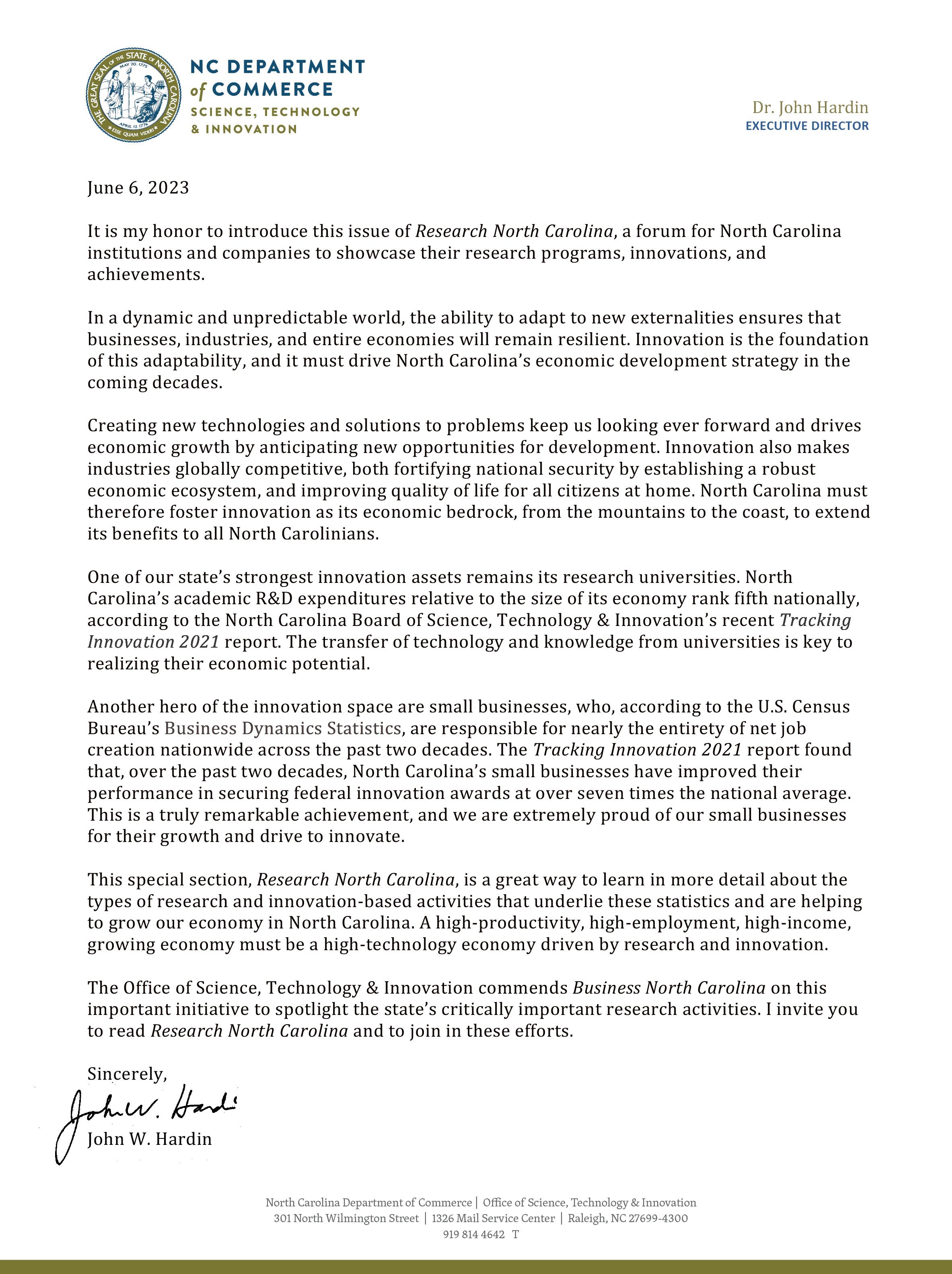
66 BUSINESS NORTH CAROLINA SPONSORED SECTION RESEARCH NORTH CAROLINA




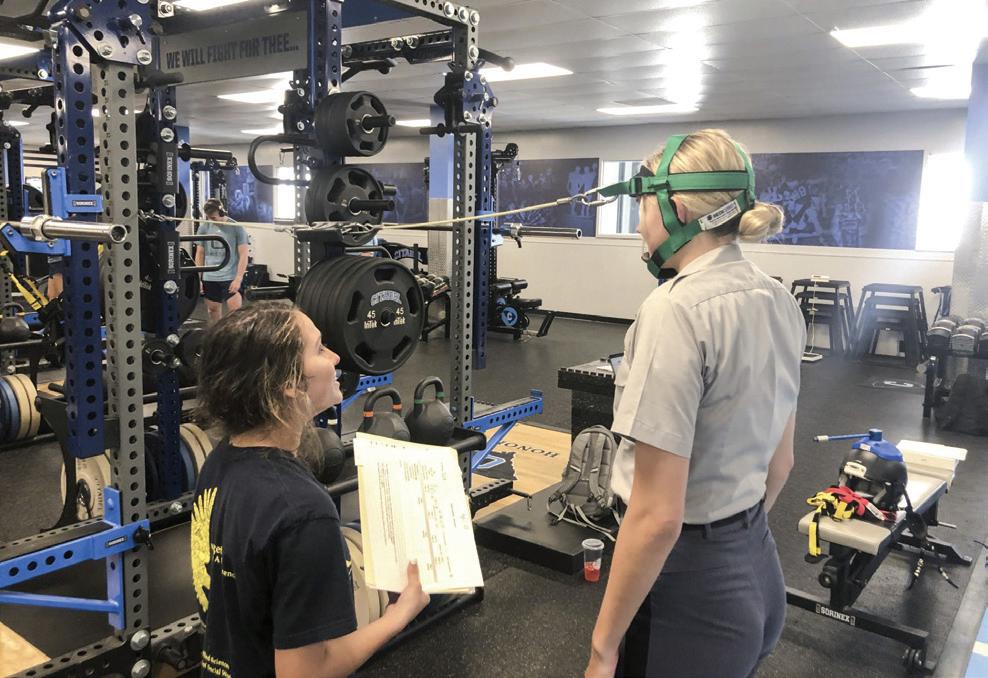
67 JULY 2023 68 APPALACHIAN STATE UNIVERSITY 70 CATAWBA COLLEGE 72 GUILFORD TECHNICAL COMMUNITY COLLEGE 74 N.C. AGRICULTURAL AND TECHNICAL STATE UNIVERSITY 76 RTI INTERNATIONAL 78 SMALL BUSINESS AND TECHNOLOGY DEVELOPMENT CENTER (SBTDC) RESEARCH NORTH CAROLINA 80 UNIVERSITY OF NORTH CAROLINA ASHEVILLE 82 UNIVERSITY OF NORTH CAROLINA CHAPEL HILL 84 UNC NUTRITION RESEARCH INSTITUTE 86 UNIVERSITY OF NORTH CAROLINA WILMINGTON 88 WAKE FOREST UNIVERSITY SCHOOL OF MEDICINE 90 WINSTON-SALEM STATE UNIVERSITY

68 BUSINESS NORTH CAROLINA SPONSORED SECTION RESEARCH NORTH CAROLINA APPALACHIAN STATE UNIVERSITY
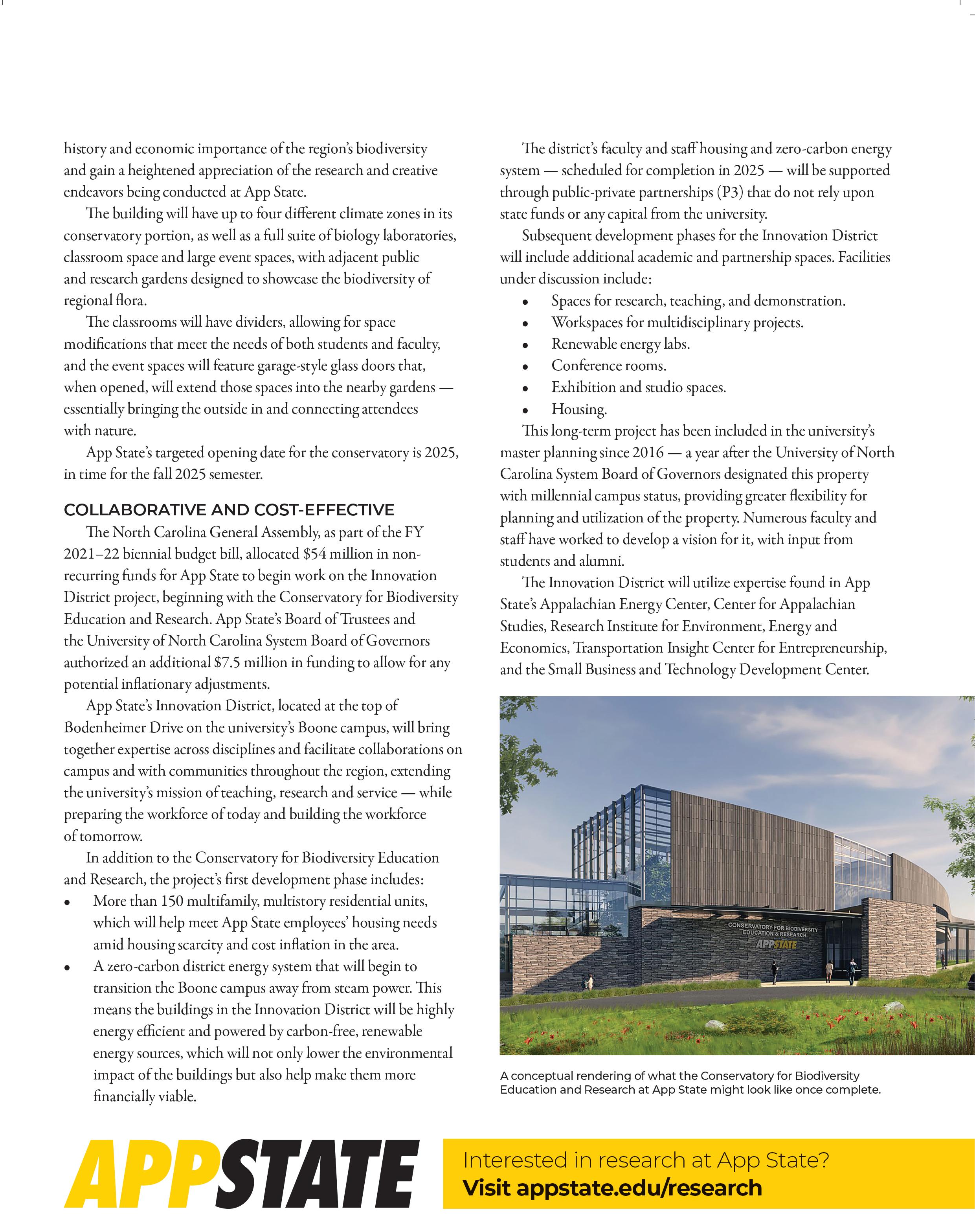
69 JULY 2023
THINK HARDER, DREAM BIGGER
A DYNAMIC LEARNING ENVIRONMENT BLENDING THEORY AND PRACTICE.
Nestled in the Piedmont region of North Carolina, Catawba is ideally situated between the Carolina Coast to the east and the Appalachian Mountains to the west. Located in charming, historic Salisbury, Catawba College offers a stunning campus with state-of-the-art facilities conducive to learning, growth, and exploration. The College’s location provides students with a safe environment while also offering easy access to cultural, recreational, and career opportunities in the surrounding area.
Founded in 1851, Catawba College has a rich legacy of academic excellence. Rooted in the liberal arts tradition, Catawba has a commitment to fostering intellectual curiosity, critical thinking, and practical skills – empowering students to develop a strong foundation for life-long learning.
We inspire students to think harder and dream bigger. Catawba allows our students to explore what fascinates them most and explore new interests through over 70 academic programs through our schools: the School of Arts & Sciences, Goodman School of Education, School of Health Sciences and Human Performance, Ketner School of Business, and the Shuford School of Performing Arts. We are proud of our distinctive programs that provide unique learning opportunities. Each of our schools are equipped with state–of–the–art facilities and expert faculty members dedicated to supporting and
nurturing our students.
Catawba’s engaging and dynamic learning environment blends theory and practice, encouraging students to become active participants in their education. Our small class sizes ensure personalized attention from dedicated faculty members who serve as mentors, guiding students along their academic journeys.
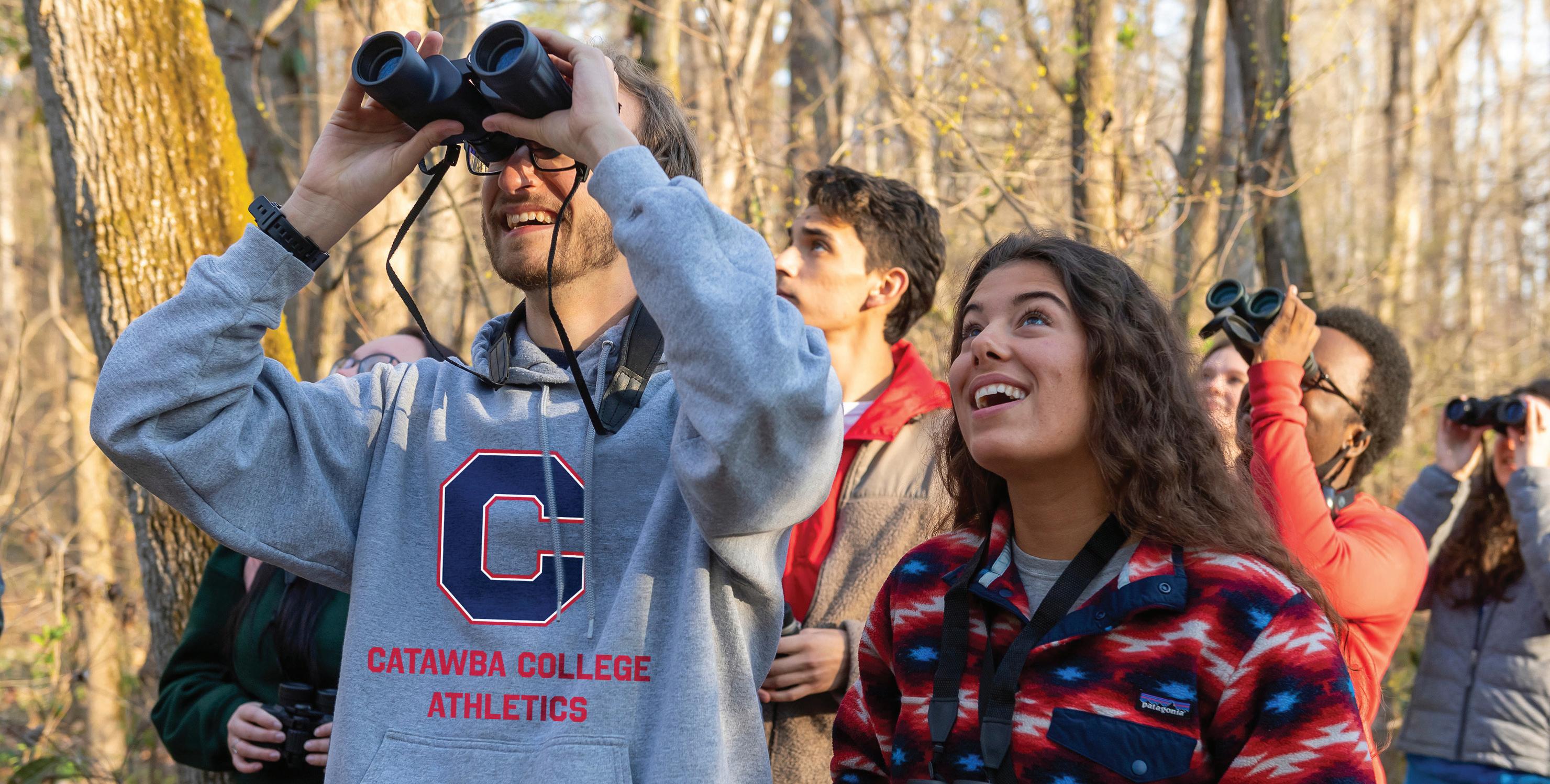
Catawba’s new Bill and Shari Graham Genomics Laboratory opened in 2022 and is the perfect example of the liberal arts education offered at the College. Students engage in vital research, gaining broad and deep knowledge in a particular field, enabling them to put that knowledge to work. Catawba partnered with Eremid® Genomic Services, LLC, (Eremid), a specialist genomics contract research provider, to open the lab which specializes in genomic sequencing. The lab is located at Eremid’s facilities on the North Carolina Research Campus (NCRC) in Kannapolis, North Carolina.
This one-of-a-kind lab enables students to gain experience which provides them a path into a truly world-changing area of research and clinically relevant training for students to master the future of new cutting-edge technology in genomics.
Students are learning clinical laboratory procedures and developing the hands-on skills to perform the most challenging laboratory techniques. The Graham Genomics Lab offers the
70 BUSINESS NORTH CAROLINA SPONSORED SECTION RESEARCH NORTH CAROLINA CATAWBA COLLEGE
only undergraduate NGS training in the United States and, combined with an academic-private partnership, equips Catawba College students with real-world skills in the growing genomics arena.
Catawba College’s undergraduates are receiving training in advanced genomics techniques, typically only available to graduate students. The Graham Genomics Laboratory is also unique in that it provides students a window into the business side of science and exposes them to additional career pathways in science as a profession.
Catawba students will acquire hands-on skills as they conduct research projects and work with innovative sequencing equipment. They will participate in multi-disciplinary, multiplatform research from concept through to data delivery and interpretation. This experience will provide them with a distinct advantage as they enter their careers and graduate programs. Catawba emphasizes experiential learning providing opportunities for internships, research opportunities, and community service initiatives, where students gain real-world perspectives and develop practical skills. In our increasingly
interconnected world, Catawba prepares students to be global citizens. We offer both domestic and international travel opportunities that enable students to immerse themselves in different cultures, broaden their perspectives, and develop a deeper understanding of the world.
Catawba College is also mindful of our impact on the environment, which is why we are constantly striving to make our campus and community greener and more renewable with a variety of initiatives. We are the first college in the Southeast, in North Carolina, and the thirteenth in the nation to be certified as carbon neutral. We continue to lead our higher education peers on embracing clean energy innovations and environmental stewardship efforts.
In addition, our 189-acre Fred Stanback, Jr. Ecological Preserve lies adjacent to campus and provides uncommon opportunities for research, field work, and outdoor recreation.
For over 170 years, Catawba College has cultivated our students’ creativity, talent, and curiosity. Whether the goal is to be an accountant, teacher, scientist, musician, minister, or CEO, Catawba will help them get there.


71 JULY 2023
Transform • Inspire • Belong • Catawba.edu CATAWBA COLLEGE 2300 W Innes Street, Salisbury, North Carolina 28144 1-800-CATAWBA catawba.edu
GTCC & FAME
BRIDGING THE SKILLS GAP FOR MANUFACTURING EXCELLENCE.
Guilford County boasts one of the most robust and thriving manufacturing sectors in the state. The county’s strategic location, skilled workforce, and supportive educational systems have made it an attractive destination for manufacturers across a number of industries.
In fact, according to Manufacturing News Inc., Greensboro is North Carolina’s second largest city based on manufacturing employment with 25,614 workers. Winston-Salem is third largest with 16,671 workers.
One of the key factors driving Guilford County’s manufacturing sector is its skilled workforce. The county has established strong partnerships between educational institutions like Guilford Technical Community College (GTCC) and local businesses to ensure a steady supply of talent. Earlier this year, GTCC significantly strengthened that commitment by launching a new program in the state that offers a specialized program equipping individuals with the skills needed for the modern manufacturing environment, while they work.
This past January, GTCC, alongside North Carolina Governor Roy Cooper, announced a first-of-its-kind partnership for the state offering “earn while you learn” opportunities for those interested in pursuing a career in STEM-related fields tied to manufacturing. Through its partnership with the North
ABOUT GTCC
Guilford Technical Community College is the fourth largest of 58 institutions in the North Carolina Community College System. Serving 27,000 students annually from five campuses and a Small Business Center, GTCC offers more than 80 programs of study, including flexible, low-cost options for earning associate degrees, diplomas, and certifications. GTCC is rooted in innovative education, training, and partnerships.
Carolina Federation for Advanced Manufacturing Education (NC FAME), GTCC will educate students in a college setting, while also providing on-the-job training with one of four NC FAME sponsor companies.

The NC FAME First in Flight Chapter members include: Jowat Adhesives in Archdale; MasterBrand Cabinets in Lexington; Toyota Battery Manufacturing North Carolina, in Liberty;
ZIEHL-ABEGG and P&G in Greensboro, ABCO in Browns Summit, and WestRock in Winston Salem.
FAME was created by Toyota and moved to the Manufacturing Institute for national scaling in 2019. Today, the Manufacturing
72 BUSINESS NORTH CAROLINA SPONSORED SECTION RESEARCH NORTH CAROLINA GUILFORD TECHNICAL COMMUNITY COLLEGE
Institute, as the workforce development and education partner of the National Association of Manufacturers, supports FAME USA which has grown to include 37 chapters supported by more than 400 company partners across 14 states. More than 1,500 students have graduated since 2012, with more than half of those graduating since spring 2020. e fall 2022 enrolling class was the largest ever, bringing the total number of students in FAME to nearly 1,000.
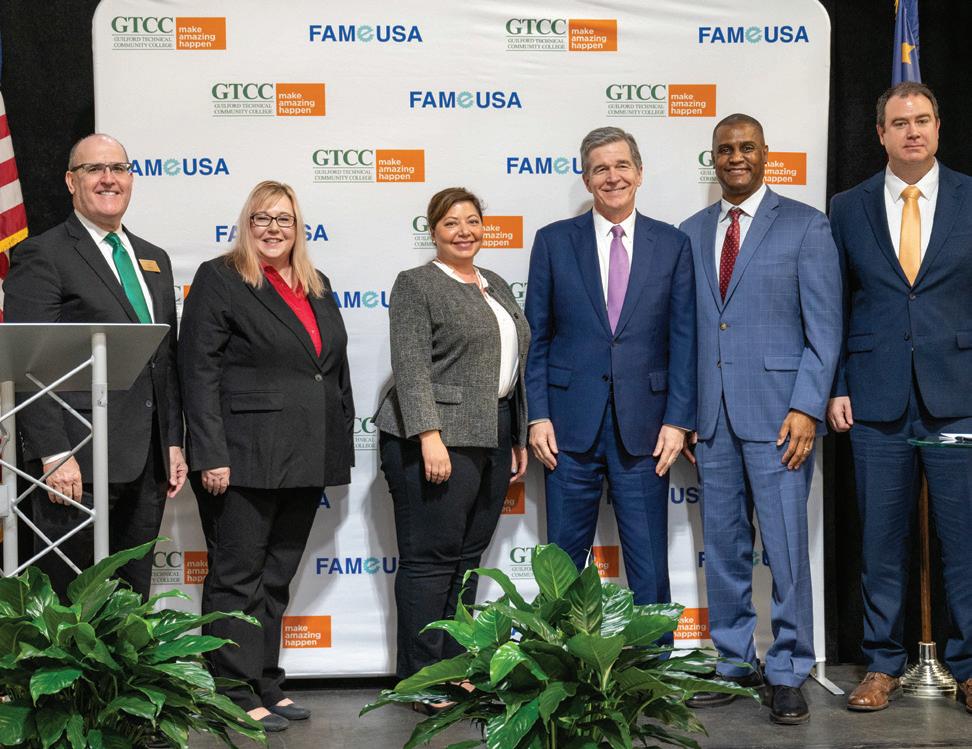
ABOUT THE FEDERATION FOR ADVANCED MANUFACTURING (FAME)

The FAME network is comprised of employerled chapters sponsoring students through a work/learn model over five semesters in conjunction with a college partner. The Advanced Manufacturing Technician (AMT) program, a FAME co-op, produces globalbest, entry-level multiskilled maintenance technicians to excel in today’s advanced manufacturing environments. The FAME USA network is managed and supported by The Manufacturing Institute.
setting, developing a deep understanding of industry practices and enhancing their employability.
Students selected for the program will have a paid position three days per week with a sponsor employer and attend classes at GTCC the other two days. A er receiving 1,800 hours of on-the-ground experience, 85% of graduates proceed to direct employment with a sponsoring company and earn wages that are, on average, 25% more than non-FAME graduates. FAME graduates are also able to transfer their credits to a four-year university to pursue a variety a STEM programs.
e FAME program’s curriculum is carefully designed to provide students with a comprehensive understanding of modern manufacturing techniques and technologies. Students learn essential skills such as problem-solving, critical thinking, teamwork, and communication, along with technical competencies in areas like industrial maintenance, automation, and robotics.
One of the distinguishing features of the FAME program is its emphasis on work-integrated learning. Students alternate between classes at GTCC and working at sponsoring companies in the manufacturing sector. is practical experience allows students to apply their classroom knowledge in a real-world
GTCC’s rst class of FAME students will begin this fall and will study out of the college’s Center of Advanced Manufacturing as a permanent home for the program is constructed. Students can potentially graduate with zero student debt thanks to employer assistance, salaries earned by working, and nancial aid.

Armed with an associate degree, many FAME graduates will have the opportunity to be hired by their sponsoring manufacturer, or other manufacturers seeking professionals with this level of experience and training. Graduates may also opt to pursue a bachelor’s degree in elds such as engineering, technology, or business.
GTCC is currently seeking instructors for its rst fall semester FAME class. Applications for interested students will reopen in October 2024. Visit the college website to learn more: gtcc. edu/gtccfame. GUILFORD
601 E. Main Street, Jamestown, NC 27282 336-334-4822 info@gtcc.edu
73 JULY 2023
TECHNICAL COMMUNITY COLLEGE
amazing happen. Visit us online at www.gtcc.edu
FAME USA launch at GTCC’s Center for Advanced Manufacturing facility in Greensboro, N.C. (l to r) GTCC President Anthony Clarke, Ph.D., Hillary Walser, human resources manager for Jowatt Corporation, Carmen Deese, human resources manager for Ziehl-Abegg, Gov. Roy Cooper, Sean Suggs, president of Toyota Battery Manufacturing, North Carolina, and Joel Wasser, general manager at MasterBrand pose for pictures on Tuesday, Jan. 31.2023.
Make
ENVIRONMENTALLY SMART
N.C. A&T, A PARTNER IN USDA’S $2.8 BILLION CLIMATE-SMART COMMODITIES PROJECTS.

North Carolina Agricultural and Technical State University is participating in two major projects to reduce greenhouse gases and improve climate-resilient agriculture production as part of the U.S. Department of Agriculture’s major new Partnerships for ClimateSmart Commodities.
Biswanath Dari, Ph.D., an agriculture and natural resources specialist with Cooperative Extension at N.C. A&T, is working with organic and conventional vegetable growers in North Carolina and four other Southern states to reduce carbon emissions and increase carbon sequestration in the soil.
Arnab Bhowmik, Ph.D., an assistant professor of soil science in A&T’s College of Agriculture and Environmental Sciences, will work with a project to provide technical and nancial assistance to more than 1,000 U.S. cotton farmers across the United States.

“We’re in the mix with some very large institutions and some very large projects. We’re holding our own,” says CAES Dean Mohamed Ahmedna, Ph.D. “ ey’re coming to us and we’re capitalizing.”
USDA announced in September 2022 that it will invest up to $2.8 billion to 70 projects in the rst round of funding in its Partnerships for Climate-Smart Commodities program. USDA said

it will announce a second round of projects later this year. e federal agency said it expects these climate-smart projects to expand markets and revenue streams for commodity producers at more than 50,000 farms spanning more than 20 million acres and sequester the equivalent of 50 million metric tons of carbon dioxide. Multiple historically Black universities are among the partners on these USDA-funded projects.
Dari, a soil scientist by training, will work with small-scale and underserved vegetable growers in ve states in the Southern Piedmont to improve sustainable crop production by adopting climate-responsive agricultural practices. He will help identify social and economic barriers that prevent these farmers from adopting climate-smart practices and provide growers with information and technical assistance.
“Climate change is happening, and we cannot deny it,” Dari says. “It’ll be worse and worse if we do not take some steps now to modify its e ects.”
Dari said he plans to do multiple on-farm demonstrations at the N.C. A&T University Farm and at farms around the region to show the value of using cover crops, no-till techniques and other
74 BUSINESS NORTH CAROLINA SPONSORED SECTION RESEARCH NORTH CAROLINA N.C. AGRICULTURAL AND TECHNICAL STATE UNIVERSITY
Arnab Bhowmik, Ph.D., director of the Soil Sustainability Lab at N.C. A&T, takes a look at a field sample.
approaches to sequester carbon in the soil — a key tactic for reducing greenhouse gas emissions — and improve soil health.
“Seeing is believing for these farmers,” Dari says. “Just talking to farmers is not convincing enough because they have done the same things for years. You have to give them enough technical and nancial support and show them the actual science.”
is project will receive up to $25 million in USDA funding. It will be led by the Rodale Institute, a Pennsylvania nonpro t that researches and promotes organic farming. Other major partners are University of Georgia, Virginia Association for Biological Farming, Carolina Farm Stewardship Association, Georgia Organics, Emory University, University of Georgia, University of Tennessee, Clemson University, N.C. State University and University of Wisconsin-Madison. A&T’s funding share is approximately $550,000 over ve years.
Bhowmik, a soil health expert in A&T’s Department of Natural Resources and Environmental Design, will be working on the U.S. Climate Smart Cotton Program in partnership with the Soil Health Institute. is project will encourage farmers in the “Cotton Belt” that stretches from Virginia to California to adopt climate-smart agricultural practices on more than 1 million acres.

Early on, Bhowmik will help identify eligible minority and under-resourced cotton farmers in North and South Carolina and connect them with technical and nancial resources to adopt climate-smart practices. Later, he’ll provide measurement and veri cation of carbon levels in the soil and greenhouse gas emissions from selected elds.
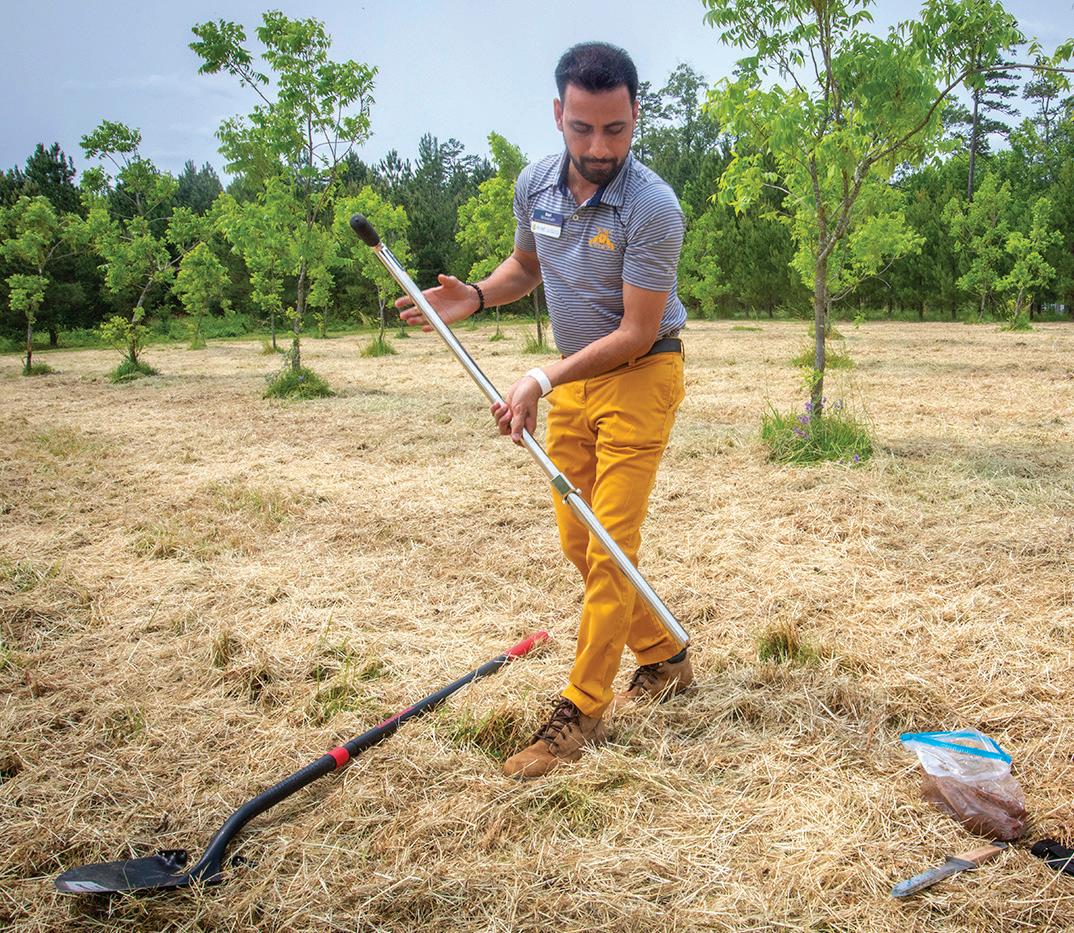
e program, which will receive up to $90 million in USDA funding, hopes over the next ve years to produce more than 4 million bales of climate-smart cotton and reduce carbon dioxide emissions by more than 1 million metric tons.


e U.S. Cotton Trust Protocol is leading this project. Other major partners are the Soil and Water Outcomes Fund, Cotton Council International, Cotton Incorporated, Agricenter International, Texas A&M AgriLife and Alabama A&M University. Funding to A&T will be approximately $500,000 over ve years.
“We’re really well positioned at A&T to help these farmers connect to farming practices we consider to be climate-smart,” Bhowmik said. “Climate change is an existential threat, and we de nitely want to make sure they become more resistant and resilient to the impact of climate change by adopting soil health management practices.”

75 JULY 2023
To learn more about agriculture & environmental sciences at N.C. A&T, visit ncat.edu/caes NORTH CAROLINA AGRICULTURAL AND TECHNICAL STATE UNIVERSITY Dr. Gregory Goins, Ph.D. College of Agriculture and Environmental Sciences N.C. Agricultural and Technical State University 336-285-4703
Biswanath Dari, Ph.D. conducting a soil test at N.C. A&T’s farm.
65 YEARS OF INNOVATION
MAKING A LASTING IMPACT AT HOME AND ABROAD.
RTI International – the organization formed by area universities and government and business leaders 65 years ago as Research Triangle Park’s anchor tenant - has grown into one of the world’s leading nonprofit research institutes.
Innovation is integral to RTI’s success with multidisciplinary collaboration, creativity and independent thinking at the forefront of the institute. With a staff of 6,000, RTI is making an impact for global good here in North Carolina, throughout the United States and in more than 90 countries around the world.
Experts in more than 250 disciplines, RTI researchers develop science-based solutions for some of the world’s biggest challenges. Challenges like providing clean energy, resolving health disparities and improving the quality of education.

Scientists at RTI leverage innovation to develop climate-smart solutions including decarbonization technology, ocean plastics mitigation, food security measures and more. Last year, RTI created the cross-institute Center for Climate Solutions and is developing solutions to reach net-zero emissions. In our state, a 2022 RTI study analyzed the impacts of 2026 clean transportation policies and found the switch to electrification and lower nitrogen
oxide emissions standards would create overwhelmingly positive impacts to the environment, health and economy. In the search for an alternative to petroleum, RTI experts have been working with the U.S. Department of Energy to produce biofuels by breaking down biomass like sawdust into gas, liquid and solid products.
RTI experts are global leaders in public health. Multiple teams focus their work on the prevention and control of infectious diseases, including neglected tropical diseases, malaria, tuberculosis, HIV, COVID-19 and MPox. With extensive expertise in behavioral health, substance abuse and the social determinants of health, RTI has administered the National Survey on Drug Use and Health for decades, the principal source of data on substance abuse and mental health issues in the U.S.
RTI researchers work with federal and state partners to alleviate the opioid crisis, promote healthy behaviors and prevent suicide among vulnerable populations.
The institute’s education team focuses on advancing equitable, high-quality learning around the globe. Education experts inform public policy, expand opportunities and drive better outcomes for children, youth and adults through multi–year studies and
76 BUSINESS NORTH CAROLINA SPONSORED SECTION RESEARCH NORTH CAROLINA RTI INTERNATIONAL
program implementation. To measure reading performance, more than 2 million Early Grade Reading Assessments have been conducted in 75 countries in 120 languages, helping children learn and teachers to teach.
RTI is committed to equity, diversity, inclusion and belonging striving to advance equity research and create a culture that allows staff to bring their authentic selves to work. Last year, the institute formed the Transformative Research Unit for Equity. This team uses science-based solutions to advance racial equity and social justice across all RTI practice areas. One local example includes partnering with the city of Durham Community Safety Department on a qualitative research project, resulting in a documentary film highlighting the city’s new community-centered crisis response program.
Across eight Southern states and six Tribal Nations, RTI also works with the U.S. Environmental Protection Agency (EPA) to coordinate a new Environmental Justice Thriving Communities Technical Assistance Center (EJ TCTAC). In Sampson County, North Carolina, RTI partners with community members to monitor pollution from an animal farm landfill. The data generated will be used by environmental managers to identify ways to mitigate exposure for this underrepresented population.
This year, RTI announced a new Center for Evidence-Based Strategies to Reduce Firearm Violence, aiming to understand, prevent and respond to firearm violence in North Carolina and across the U.S. Recent related projects include a national evaluation of school safety tip lines demonstrating a correlation between tip lines and a reduction in school violence, and the National Case Closed Project, in which RTI is helping law
enforcement agencies improve case clearance rates.
As part of its extensive international development portfolio, RTI launched the Center for Thriving Children, committed to building a world in which all children are healthy, well-nourished and raised in a stable, loving and safe environment that gives them the opportunity to grow, learn and thrive. Focused on early childhood development, the center brings together global experts in child development, nutrition, health and early learning to help children reach their full potential. For example, in Cambodia the center is partnering with the U.S. Agency for International Development (USAID), as well as local communities, caregivers and ministries to improve nutrition, health, educational and overall development outcomes.
One example of RTI’s impact on everyday well-being could be as close as the nearest water fountain. Since 2017, the institute has been involved in testing the safety of drinking water in child care facilities in North Carolina. This expanding effort, a partnership with the state of North Carolina, will test more than 3,000 schools and 5,700 daycares for lead and asbestos. The Clean Water for Kids program, which is the largest peer-reviewed data set of lead concentrations in child care facilities in the U.S., is expanding to neighboring states like Georgia to further improve children’s health.
Founded to extend the reach of North Carolina’s leading scholars, RTI has spent 65 years seeking science-based solutions to critical issues facing humanity. Those of us here in the Triangle as well as people, communities, countries and regions around the world benefit from RTI’s innovative approach as the institute continues to improve the human condition for the next 65 years.

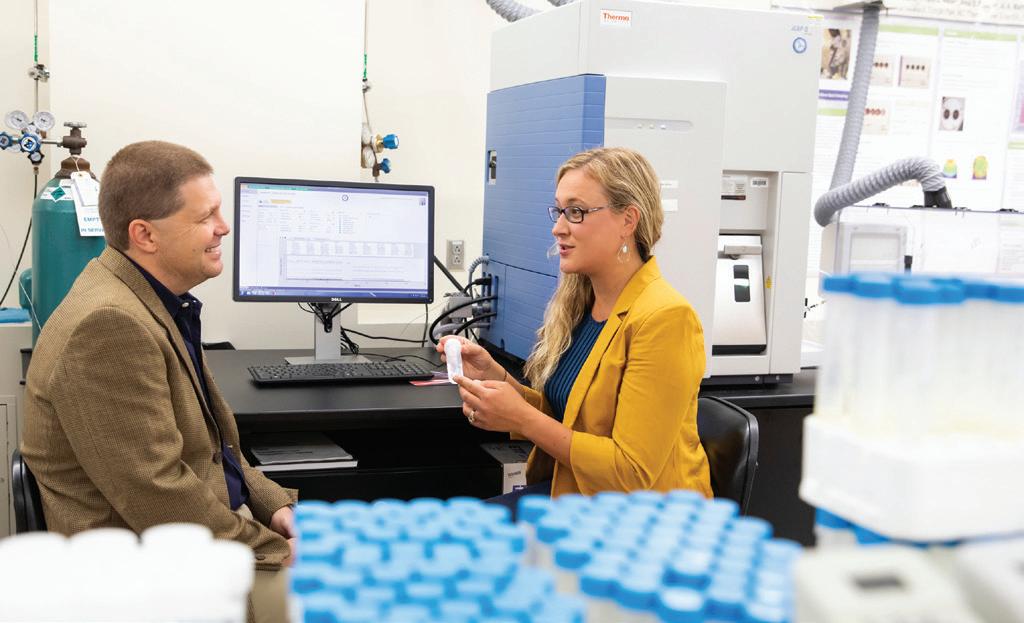

77 JULY 2023
RTI International is a trade name of Research Triangle Institute. RTI and the RTI logo are U.S. registered trademarks of Research Triangle Institute.
RTI INTERNATIONAL 3040 East Cornwallis Road, Research Triangle Park, NC 27709 919-541-6000 rti.org
RTI
International is an independent nonprofit research institute dedicated to improving the human condition.
FUELING NORTH CAROLINA’S INNOVATION ENGINE
SBTDC INTERNSHIP PROGRAM LINKS PROFESSIONAL STUDENTS AND INNOVATION BUSINESSES.

Phaxtec, a rm founded in 2019 to develop sustainable coating materials lauded Lois Chen’s contribution to the company’s vision, nancial planning, and strategy development. Chen was not an employee or consultant hired by the company, but rather a graduate student intern. Each summer, the North Carolina Small Business and Technology Development Center (SBTDC) o ers the opportunity for graduate students from across the state to work closely with early-stage innovation-based companies. Chen joined an impressive list of over 200 SBTDC internship alums that have taken part in the program over the past 21 years and shared that the program provided “a rare opportunity for one to work directly with CEOs who have a clear vision for innovative technology.”
e SBTDC is a business and technology extension program of the UNC System, administered by North Carolina State University and operated in partnership with the U.S. Small Business Administration. SBTDC’s business counselors assist small and midsize businesses throughout North Carolina from
16 o ces across the state, each a liated with a college or university. e SBTDC’s Technology Commercialization Program focuses on providing counseling and resources to small business owners, university researchers and entrepreneurs looking to advance their innovations to the marketplace.
Program Director John Ujvari explains that graduate interns can provide a deeper level of consultative engagement to companies that are nearing commercialization. “We work with hundreds of clients a year and hand-select companies that, with additional resources, can address business challenges more e ectively and e ciently.” ese challenges o en revolve around commercialization and fundraising.
Phaxtec, like many innovation-based rms, is seeking funding as they conduct the R&D needed to develop a revenue-generating product. e advanced materials and biotechnology company is seeking to commercialize sustainable materials through the development, production, and marketing of naturally occurring PolyHydroxyAlkanoate (PHA) biopolymers. Founded by
78 BUSINESS NORTH CAROLINA SPONSORED SECTION RESEARCH NORTH CAROLINA SMALL BUSINESS AND TECHNOLOGY DEVELOPMENT CENTER
SBTDC technology interns, summer 2022.
Anindya Mukherjee, Phaxtec’s proprietary technology will be utilized to meet the market demand for renewable, biodegradable, and compostable food packaging, fertilizer coatings and other products, reducing the negative environmental impacts of fossil plastics. With Small Business Innovation Research (SBIR) funding from the National Science Foundation and a One NC Small Business Program matching grant, Phaxtec expects its core research to be completed in late 2023.

Intern Lois Chen provided Phaxtec with background research on the PHA Industry and nancing of similar technologies that con rmed many of their assumptions on the market and overall business environment. She edited Phaxtec’s business plan and prepared an investment memorandum utilizing feedback from executive, business development, and scienti c o cers within the company. Her nance and accounting background helped con rm the company’s proforma nancials, which were later corroborated by counselors at the SBTDC.

Chen also worked with Lullabee, a company founded by Duke University child neurologist Dr. Sujay Kasangra that treats children with sleep challenges. e company is developing a technology solution that can help infants and toddlers sleep better via the Lullabee crib mattress. Kasangra noted that moving from the academic environment to external R&D and nally into early commercialization planning came with a variety of challenges. Internship program deliverables included analysis of marketing approaches, potential retail partnerships, competitor intellectual property, and even search engine optimization analysis.
A collaborative funding arrangement between the SBTDC and participating universities provides interns with a stipend. Duke University’s Fuqua School of Business, where Chen just graduated with an MBA degree, has been a long-term partner. Fuqua’s Director of MBA Entrepreneurship Programs and Startup Recruiting Josh Cohen has a unique perspective as a Duke MBA alum and an SBTDC summer intern in 2006. A er graduation, Josh was hired by the client he worked with and remained there for 14 years, from bootstrapping through raising Series A funding to eventual acquisition by Ford Motor Company.
Now back at Duke, Cohen and his team want every Duke student to have an entrepreneurial experience. “Being here in the heart of the Triangle and in a diverse state like North Carolina, student interns can have a direct impact on small businesses that



are the current and future economic engine of the state”, says Cohen. “Moreover, these entrepreneurs serve as models for the student, showing how setbacks are never permanent, experimentation is the norm, and continued learning is the price of admission for success.”
As illustrated by Chen, Phaxtec, Lullabee, and Cohen, the SBTDC’s Technology Summer Internship Program bene ts student interns, innovation-based companies, and universities alike. In the last 21 years, over 200 student interns have provided 400 client companies with more than 90,000 hours of consulting. Impacts associated with their work includes newly commercialized technologies and well over $250 million in funding. John Ujvari, who has led this program since its founding, notes that there is nothing better than hearing from both clients and interns about how the program has impacted their success and careers.
79 JULY 2023
Whatever your business destination, we can help you find your way. Visit sbtdc.org. SMALL BUSINESS AND TECHNOLOGY DEVELOPMENT CENTER 5 West Hargett Street, Suite 600, Raleigh, NC 27601 919-715-7272 sbtdc.org Follow us on Twitter, LinkedIn & Flickr
Intern Lois Chen graduated from Duke University’s MBA Program (above) and Phaxtec’s fermenter bio-synthesizes PHA.
STUDENT-DRIVEN Joint

N.C. State/UNC Asheville mechatronics students construct electric race car from scratch.
BY RYAN REED
“Some of this stu you can’t just Google,” says Nick Grandsta , ashing a grin.


An understatement, to say the least. e mechatronics engineering student—who’s studying with the joint N.C. State/ UNC Asheville Engineering Program—is detailing the long road of his ambitious senior design project: building an electric race car from scratch as part of the Formula SAE competition.
Back in April, Grandsta , the captain and steering/suspension lead of a 10-student crew, was still rightly sweating the ner details of the project. ey were two months away from the event itself, set for June 14–17 in Brooklyn, Michigan, and despite semesters of preparation, they’re in expect-theunexpected mode. Some issues, says electrical lead Maximo Perasso, are “notoriously di cult to simulate,” so “real-world testing is the only way to gure them out.”
But Grandsta and Perasso have plenty of brain power at their disposal. ey’ve been collaborating with eight other versatile seniors piloting speci c areas of the project: Trysten Ruhland (power-train), Lief Van Sliedrecht (documentation), Robert Brenneman (chassis), Sarah Vyvyan (business/administration), John Sauvigne (fabrication and design), Hunter Horan ( nance), Steven Anderson (vice chair of marketing/ nance), and Gustavo Melo-Perez (sponsorship/marketing). ey’ve also been guided, albeit gently, by two faculty advisors: N.C. State teaching professor and UNC Asheville lecturer of Engineering N. Moorthy Muthukrishnan and STEAM Studio co-founder Sara Sanders.
Naturally, a lot of meticulous science—and trial and error—is steering this enterprise. But it comes from a personal place: Hoping to combine two of his passions, motorsports and
engineering, Grandsta joined the school’s SAE Club over four years ago, eventually nding a group of like-minded students. “We were working all those years, making slow progress,” he says. “So we nally decided, if we actually want to get a car built, we have to make it a senior design project. at’s when we got a lot of our friends to join.”

Sanders worked with a previous Motorsports team back in 2016, attempting to build a go-kart in the STEAM Studio. Sanders is thrilled to support another eager group: “ ey have a ton of enthusiasm and drive,” she says. “And one of the things that’s particularly compelling is that it is student–driven.”


In a critical part of the process, the students raised thousands of dollars in funding, helping pay for tires, brake components, racing gear, chassis tubing, and battery cells, among other costs. e money was essential, but the biggest hurdle might have been time management.
“I think the technical stu came very easily. e Mechatronics Engineering Program does a great job of preparing our students for a project like this, but the challenges that come from this competition are so broad and interdisciplinary and wellrounded, it re ects the actual industry environment,” says Sanders. “It’s a big undertaking, and they’ve de nitely risen to the challenge.”
at challenge involved intense deep dives, acquiring all that knowledge you can’t access with a quick MacBook search. “Pretty much everybody had little to zero experience in the motorsport world, so we were starting from nothing,” says Grandsta . “We did a lot of research to see what other teams were doing, what options were expensive, what designs were easy to build. In terms of building it, we had to realize how long
80 BUSINESS NORTH CAROLINA SPONSORED SECTION RESEARCH NORTH CAROLINA UNIVERSITY OF NORTH CAROLINA ASHEVILLE
CAROLINA
it takes to make a certain part of the car. At the beginning, Sara said, ‘Take the time you think it’ll take, and then multiply that by four or ve.’”






And as Perasso notes, much of this experience could only be gathered in person. “We actually attended some physical conferences in California with Dr. Moorthy and Rob and Gustavo,” he says. “We all went to California to a Tesla-hosted SAE convention, where we got a whole bunch of networking done, along with two days straight of pure electrical knowledge.”
It took plenty of fumbling and sweat, but they’re immensely proud of the end product. Regardless of how they place in the competition, they’ve already won.
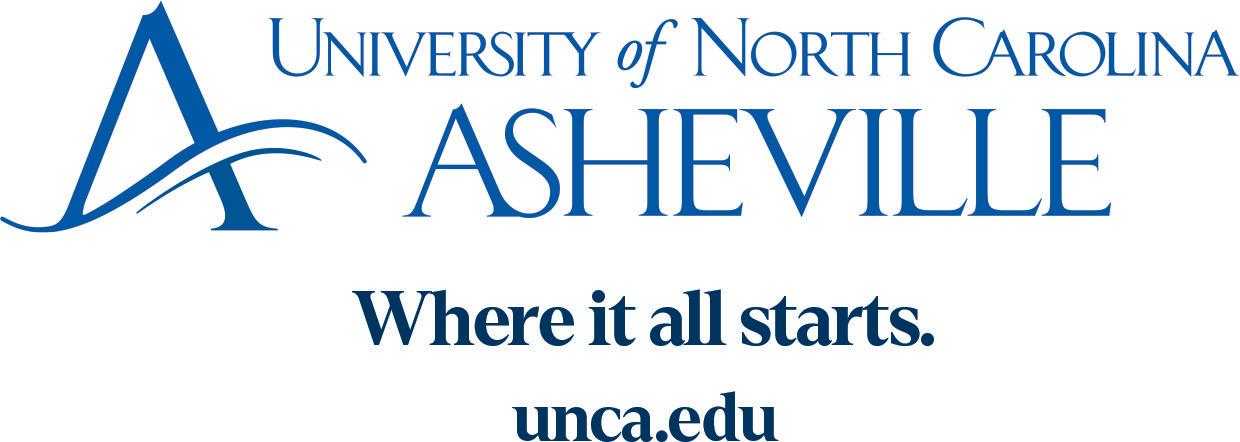
“We’ve taken our rolling chassis on campus,” says Grandsta . “We’ve had an open house at the STEAM Studio. A er working on the car for so long, it makes you feel really good when somebody walks up with a big smile on their face. All the conversations, all the stories, all the people you get to meet, the experiences you hear from talking to other people—that’s what I really enjoy.”
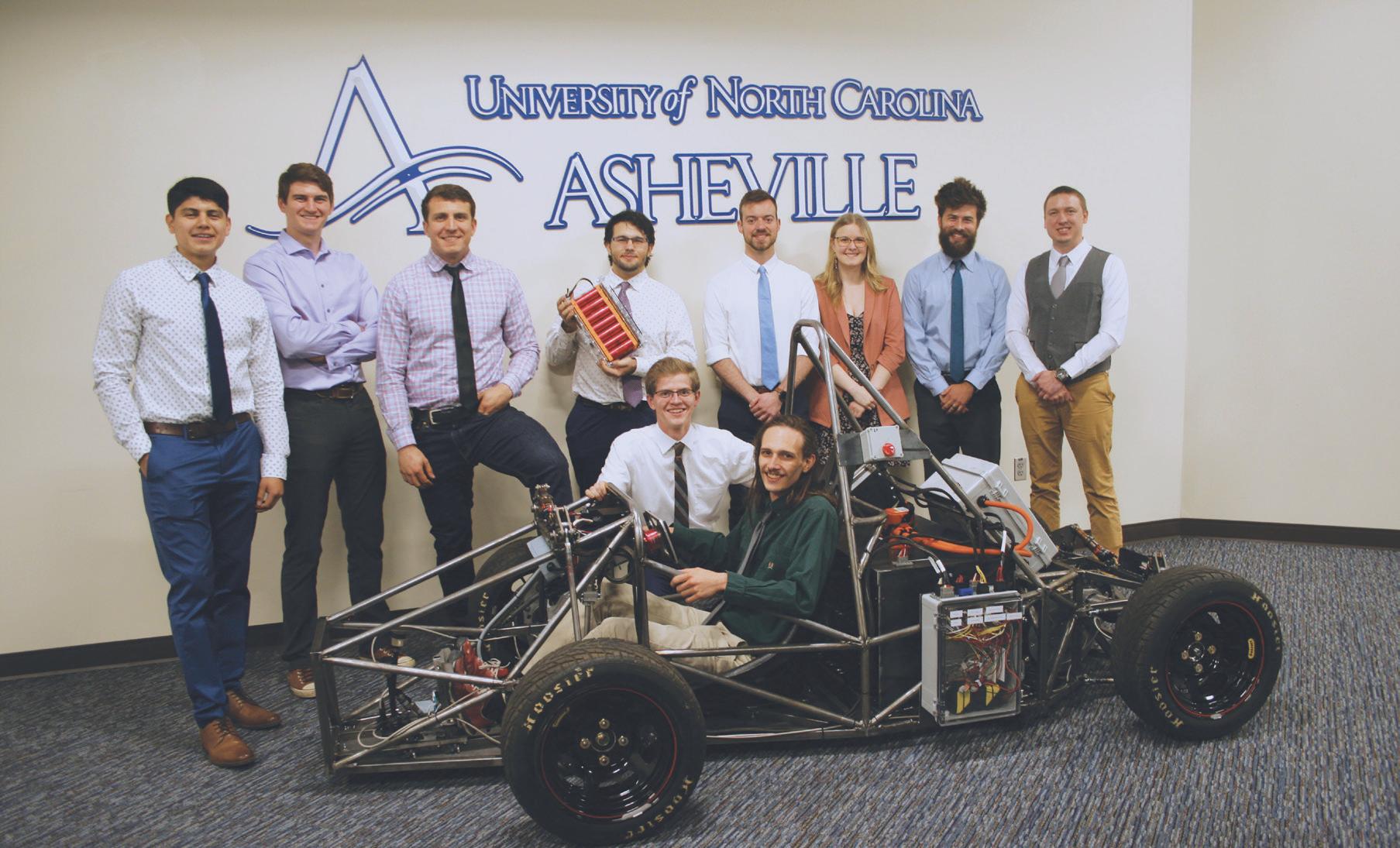
81 JULY 2023
Le to right: UNC Asheville students Gustavo Melo-Perez, Trysten Ruhland, Robert Brennemen, Maximo Perasso, Steven Anderson, Sarah Vyvyan, John Sauvigne and Hunter Horan, Nicholas Grandsta (kneeling), Lief VanSliedrecht (seated).
Photo by Monica Ruhland.
EXPERTISE FOR NEW ECONOMIES
Carolina’s success in research translation, convergent science, and economic innovation stems from its strong interdisciplinary collaboration, its commitment to training the next generation of researchers, and its focus on improving lives in North Carolina and beyond.
RESEARCH TRANSLATION
e University of North Carolina at Chapel Hill has a strong record of accomplishment in translating scienti c discoveries into new treatments and prevention strategies for human diseases, with researchers developing transformative new drugs, devices, and diagnostic tools to improve patient care and treatment. is approach has led to innovative treatments for a wide range of diseases, including cancer.
Carolina researcher Lindsey James and her team work on small molecules that target speci c proteins that can lead to the development of cancer when they are mutated or over-expressed. e lab creates molecules that bind these proteins and block their function, uncovering promising new therapeutic targets for cancer treatment.


One of the strengths of Carolina’s translational research program is its strong interdisciplinary collaboration. Pharmacoengineer Shawn Hingtgen leads a multi-institutional collaboration called Project Brainslice that tests neurological therapies using tumor samples grown on slices of brain tissue. Leveraging expertise not only at UNC-Chapel Hill, but also at Duke University and the University of Florida, the team created a tool that houses brain tumor samples and keeps them alive while testing di erent drugs to see which one is most successful in attacking the tumor.
INNOVATION HUB
e Innovate Carolina Junction – the anchor tenant in Chapel Hill’s new innovation district – o ers an intersection of programming and coworking to connect a thriving community of area innovators. Located directly across from campus on the
82 BUSINESS NORTH CAROLINA SPONSORED SECTION RESEARCH NORTH CAROLINA UNIVERSITY OF NORTH CAROLINA CHAPEL HILL
Researchers at UNC Chapel Hill are on the cusp of curing and discovering better treatments for the world’s deadliest viruses and diseases.
storied Franklin Street, the Junction serves as a central catalyst between the university, town, and industry. e Junction’s grand opening is slated for September, and it will o er extensive programming and support services to move more ideas to market faster.

By partnering with community colleges and industry, the Junction will spark new collaborations that solve both North Carolina and global problems and strengthen the economy. is fall, the Junction will convene leaders focused on the Work of the Future. Together, university and industry experts will review trends, identify potential collaborations, and seek new opportunities.
SCHOOL OF DATA SCIENCE AND SOCIETY
UNC Chapel Hill’s provides exceptional training for the state’s next generation of researchers and innovators. Launched in 2022, the UNC School of Data Science and Society (SDSS) will advance the eld of data science and illuminate how it impacts society. An online Master of Applied Data Science will be o ered in January of 2024, providing training in programming, statistics, mathematics, data management, data ethics and data governance, as well as specialized skills in machine learning, visualization, and communication. Future programs will include undergraduate and doctoral curricula and certi cates for working professionals.

As a global hub of technology and biotech industries, the Research Triangle is a tting spot for a new school of data science. It is home to around 4,000 tech companies in fast-growing industry segments like analytics, nanotechnology, and wearables. Giants like Vinfast, Wolfspeed, and Apple, as well as a myriad of smaller companies and startups are keen to hire graduates with strong data literacy.
For the past year, faculty and sta at SDSS have engaged with potential industry partners and data specialists in elds like pharmacology, insurance, banking, technology, and consumer product goods. SDSS leaders are gauging the current and future interests of these companies, determining what skills and areas of expertise students need to make them attractive to employers, and identifying relevant areas of collaboration and experiential learning for students.
INNOVATING ECONOMIC GROWTH
e U.S. Geological Survey estimates that three known deposits in North Carolina contain enough lithium to supply batteries for over 50 million electric vehicles, o ering our state a unique opportunity to support this exciting and blossoming new industry.
e NC Collaboratory, headquartered at UNC Chapel Hill and funded by the legislature, is supporting initial research to guide private companies and policymakers in exploring the full potential of the electric vehicle and battery. ey are coordinating a geological study across the central Carolinas to identify key mineral deposits, funding work to further energy e cient and cost-e ective lithium extraction technology, and researching potential mining sites and their economic impact on the state.
Carolina is well positioned to integrate the results of those e orts with its expertise in autonomous vehicle (AV) research, the next wave of transportation innovation. Researchers in the computer science department are developing algorithms for autonomous driving, including sensor fusion, path planning, and motion control. Led by the UNC Highway Safety Research Center, the N.C. Transportation Center of Excellence in Advanced Technology Safety and Policy is contributing to the e ort through a three-year program to improve existing infrastructure and advance road safety, mobility, and accessibility.
83 JULY 2023
UNIVERSITY OF NORTH CAROLINA CHAPEL HILL Office of the Vice Chancellor for Research research.unc.edu Innovate Carolina innovate.unc.edu Office of Foundation Relations and Industry Engagement frie.unc.edu
social
Designed and created by Innovate Carolina, the Junction connects the university and community to all aspects of economic and
impact.
INTERNATIONALLY RECOGNIZED
A COMMUNITY COMMITTED TO ADVANCING PERSONALIZED NUTRITION.
An internationally recognized center, the UNC Nutrition Research Institute (NRI) conducts innovative basic and translational science to establish how individual differences in nutrient requirements and responses to diet affect our nutritional needs.

The NRI is a unit of the University of North Carolina at Chapel Hill and is located on the North Carolina Research Campus in Kannapolis. NRI principal investigators hold faculty appointments in the departments of Nutrition and Psychology & Neuroscience, as well as the School of Social Work at UNC Chapel Hill. Their research questions nutrient roles in disease prevention and risk with an emphasis on some of the most urgent nutrition-related, chronic health concerns facing our society today — brain health, cancer, and cardiometabolic diseases — across the lifespan from periconception through aging.
Our scientists have demonstrated, in specific populations, the need for certain essential nutrients, the high-risk nature of some diets, the link between obesity and cancer, and the prevalence of
fetal alcohol spectrum disorders. This work explores the impact of gene-environment and gene-nutrient interactions by using advanced approaches including nutrigenetics, epigenetics, nutrigenomics, metabolomics and microbiomics.
The NRI houses research cores that offer a wide range of services to researchers. Cores offer shared resources including cuttingedge technologies, high-end instrumentation, technical support, and education. NRI cores enhance and expand the collaborative capabilities of research at the institute, at the North Carolina Research Campus, across the UNC Chapel Hill campus, and throughout the worldwide research community.
NRI Research Cores
Clinical Reasearch
Genomics and Energy Metabolism
Metabolic Phenotyping
Metabolomics
84 BUSINESS NORTH CAROLINA SPONSORED SECTION RESEARCH NORTH CAROLINA UNC NUTRITION RESEARCH INSTITUTE
The Clinical Research Core features one of the few whole-room human calorimeters in the United States. This advanced research suite uses indirect calorimetry to evaluate a research participant’s 24-hour energy intake and expenditure. The suite is equipped with a bed, treadmill, bathroom, airlock chamber for food delivery, ports for blood draws, and entertainment options. Data can be collected without interruption during meals, sleep, and light activity. The whole-room calorimeter is essential for studies on energy balance and fuel use.
MISSION: To understand how nutrition affects personal health through our leadership in precision nutrition research, finding how differences in our genes, gut bacteria, metabolism, and environment shape our individual disease risk.
VISION: To use scientific discovery to ensure optimal health through individualized nutrition.
Located in the greater Charlotte region, Kannapolis is a blossoming community, steeped in history, full of charm, and currently experiencing a remarkable renaissance in its downtown. The people who make up the NRI have wide-ranging expertise and skills — professors of nutrition, psychology, and social work and psychiatry, postdocs, laboratory technicians, doctoral students, interns, administrators, and administrative support staff — and have come to Kannapolis from all parts of the world.
As diverse as this community is, they have agreed on a set of values to which they commit themselves while conducting their work in service of the NRI mission and vision: Integrity; Innovation; Collaboration; Dedication; Research Excellence; and Diversity, Equity, and Inclusion.
A 501(c)(3) nonprofit organization, the NRI was launched in 2008 as a primary partner of the North Carolina Research Campus. The institute is housed in a 125,000-square-foot building featuring state-of-the-art laboratory and research spaces, clinical facilities, and offices and meeting areas.
With this advanced facility and technology, NRI research
scientists are making important discoveries for worldwide health. In turn, this intellectual capital is fueling an economic engine to attract business opportunities and create new jobs for North Carolinians. The NRI is training a skilled biotechnology workforce that serves life sciences and nutrition companies located in the Piedmont.
As a nonprofit research center at UNC Chapel Hill, part of the state university system, the NRI receives an annual state appropriation, and is additionally funded by federal and other research grants, and private donor gifts to explore new scientific ideas, recruit the world’s best scientists, and provide hands-on education and mentoring of students. The NRI embraces the University’s mission, which includes public service, by producing annual training workshops, symposia, and seminars for scientific researchers, and a full slate of free programming to translate the good works of the NRI for the public.
The NRI welcomes inquiries for collaborative opportunities and its service cores and encourages everyone to learn about personalized nutrition in order to Eat Uniquely.
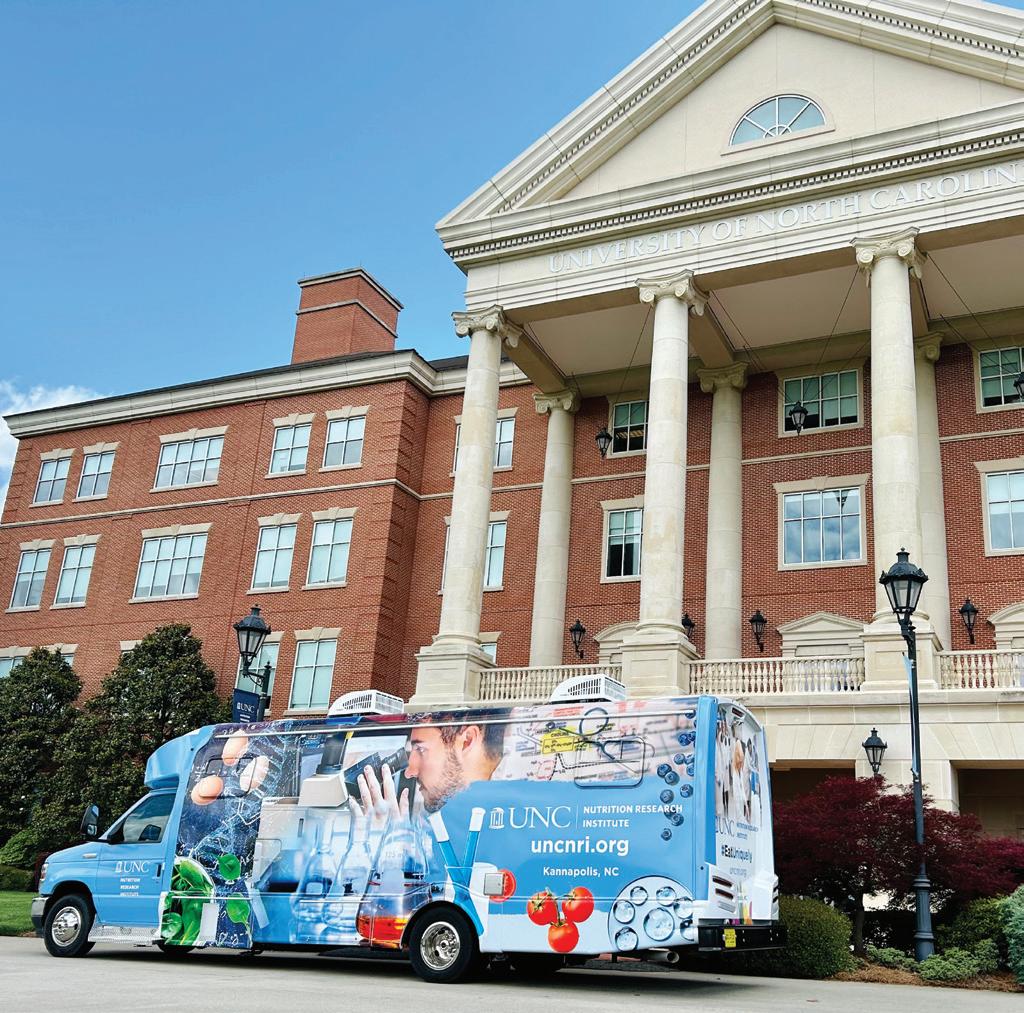
85 JULY 2023
more information, visit us online at uncnri.org UNC NUTRITION RESEARCH INSTITUTE
Dane, director of development Nutrition Research Institute University of North Carolina at Chapel Hill 500 Laureate Way, Kannapolis, NC 28081
For
Suzanne
704-250-5008 suzanne_dane@unc.edu
STRONG NECK, SOUND MIND
UNCW RESEARCHERS MAKING HEADWAY IN SPORTS, MILITARY INJURY PREVENTION EFFORTS.
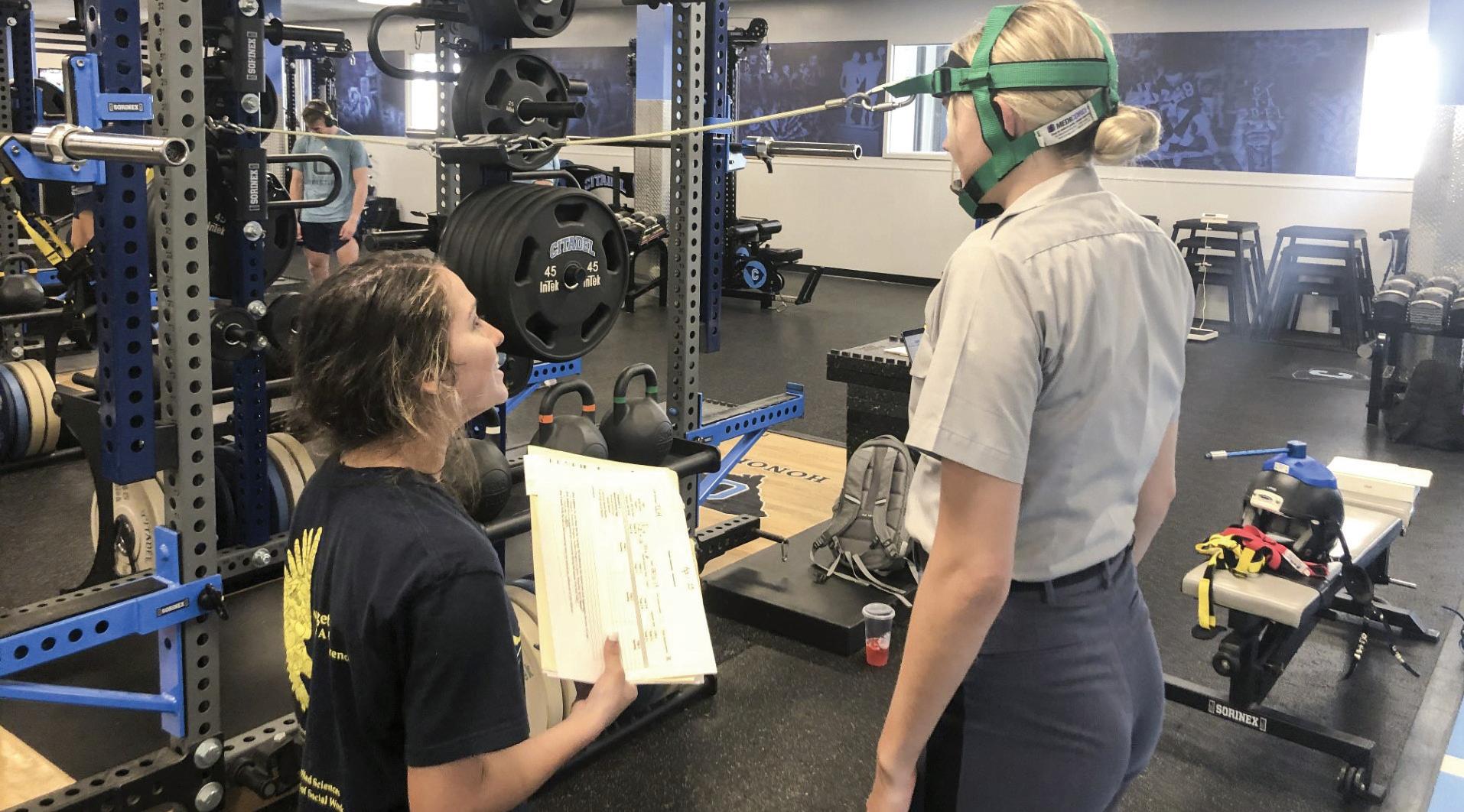 By Jack Bailey and Caroline Cropp
By Jack Bailey and Caroline Cropp
Sports and the military are closely intertwined in America’s culture. e singing of the National Anthem, ghter jet yovers and troop tributes are mainstays at major sporting events. UNC Wilmington faculty members Alex McDaniel and Lindsey Schroeder have invented a device that will help prevent potentially life-altering injuries in both elds.
In 2017, Drs. McDaniel and Schroeder began researching mild traumatic brain injury in athletics. McDaniel found that researchers were studying ways to improve neck strength to ward o potential traumatic brain injuries in athletes, but no one was focusing on the same issue in the military.
Concussions, a form of mild traumatic brain injury, are caused by an impact that moves the brain within the skull and can lead to problems with thinking, concentration, mood and other neurological changes.
Military paratroopers are especially vulnerable to the recurrence of concussions. ey can land at a speed between 15 to 20 miles an hour while carrying 100 to 150 pounds of gear.
“Small, repetitive blows impact the brain, so every time they launch their parachute is going to add up over time. Other landings can be quite impactful, and the concussions are immediate,” said Schroeder.

“In the 82nd Airborne, the number one cause of decreased military readiness is brain trauma from parachute landings,” said McDaniel. “We asked, ‘Is there anyone taking care of this?’ and saw an opportunity.”
A neck that is stronger, thicker or in a neutral posture — with the ears aligned with the shoulders — may reduce the amount of energy transferred to the brain during an impact, reducing the risk and severity of injury.
86 BUSINESS NORTH CAROLINA SPONSORED SECTION RESEARCH NORTH CAROLINA
PHOTO
OF DR. ALEX
UNIVERSITY OF
The NSAT 1.0 in use in the spring of 2023 during a neck strength assessment research study in collaboration with The Citadel Military College of South Carolina.
COURTESY
MCDANIEL.
NORTH CAROLINA WILMINGTON
In 2022, Drs. McDaniel and Schroeder were awarded a $110,000 Translational Research Grant from the North Carolina Biotechnology Center to develop an enhanced prototype of their neck strength assessment tool, rigorously test it, and work toward approval from the Food and Drug Administration to manufacture it as a medical device.
The research efforts of the UNCW team, which included Justin Streuli from the Office of Innovation and Commercialization, Bill Kawczynski from the Office of Military Affairs and multiple community partners, were aimed at solving one critical problem: reducing the risk of sustaining a mild traumatic brain injury from parachute landing amongst the 82nd Airborne paratroopers. Additionally, the developed protocol and product would serve athletic organizations with a measured high risk of sustaining an mTBI during physical activity.
“This is a fine example of use-inspired research and development at UNCW intended for positive public impact. It illustrates our university’s growing research capabilities to address human health and wellness needs,” said Dr. Stuart Borrett, Associate Provost for Research and Innovation.
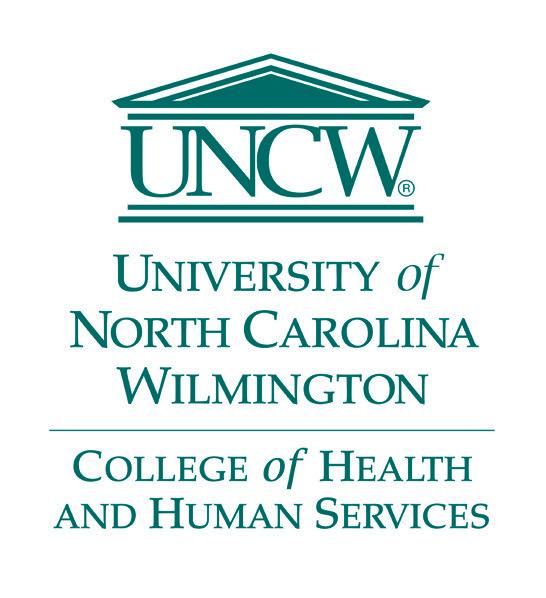
The assessment tool is a portable, Bluetooth-capable device that syncs with a mobile application developed by Lucas Layman, assistant professor in UNCW’s Department of Computer Science. It measures isometric neck strength in four directions.
“We currently have a utility patent pending in Canada and the United States,” said Schroeder. “Our research team has applied for millions of dollars in grants in hopes of receiving external funding to make minor necessary adjustments to the prototype. This would also provide funding to have more devices made and utilize them in conjunction with a neck strengthening protocol at military installations.”
Drs. McDaniel and Schroeder have presented their findings on neck strengthening protocols and traumatic brain injury at SoutheastCon 2022, the annual Institute of Electrical and Electronics Engineers conference, and published in the
International Journal of Exercise Science and The Sport Journal, among others.
Alexander T. McDaniel, DHSc, LAT, ATC, CSCS, has been an assistant professor of exercise science in the School of Health and Applied Human Sciences at the University of North Carolina Wilmington since 2020, previously working as an assistant athletic trainer. His research focuses on primary prevention strategies for mild traumatic brain injury among military and athletic populations as well as the reduction of stress, anxiety and depression across populations.
Lindsey H. Schroeder, Ed.D., LAT, ATC, CES, began her career at UNCW in 2014 as an assistant athletic trainer working primarily with the women’s basketball and tennis teams. She joined SHAHS in 2016 and is currently an associate professor of athletic training. In addition to concussion and mild traumatic brain injury, her research interests include work-life balance, job satisfaction and retention issues in athletic training.

87 JULY 2023
For more information visit uncw.edu/chhs UNIVERSITY OF NORTH CAROLINA WILMINGTON UNCW College of Health and Human Services 601 South College Road Wilmington, NC 28403-5685 910-962-3317 uncw.edu/chhs
PHOTO
UNCW faculty members Alex McDaniel and Lindsey Schroeder.
CREDIT: JEFF JANOWSKI, PHOTOGRAPHIC SERVICES MANAGER, UNCW OFFICE OF UNIVERSITY RELATIONS

88 BUSINESS NORTH CAROLINA SPONSORED SECTION RESEARCH NORTH CAROLINA WAKE FOREST UNIVERSITY SCHOOL OF MEDICINE

89 JULY 2023
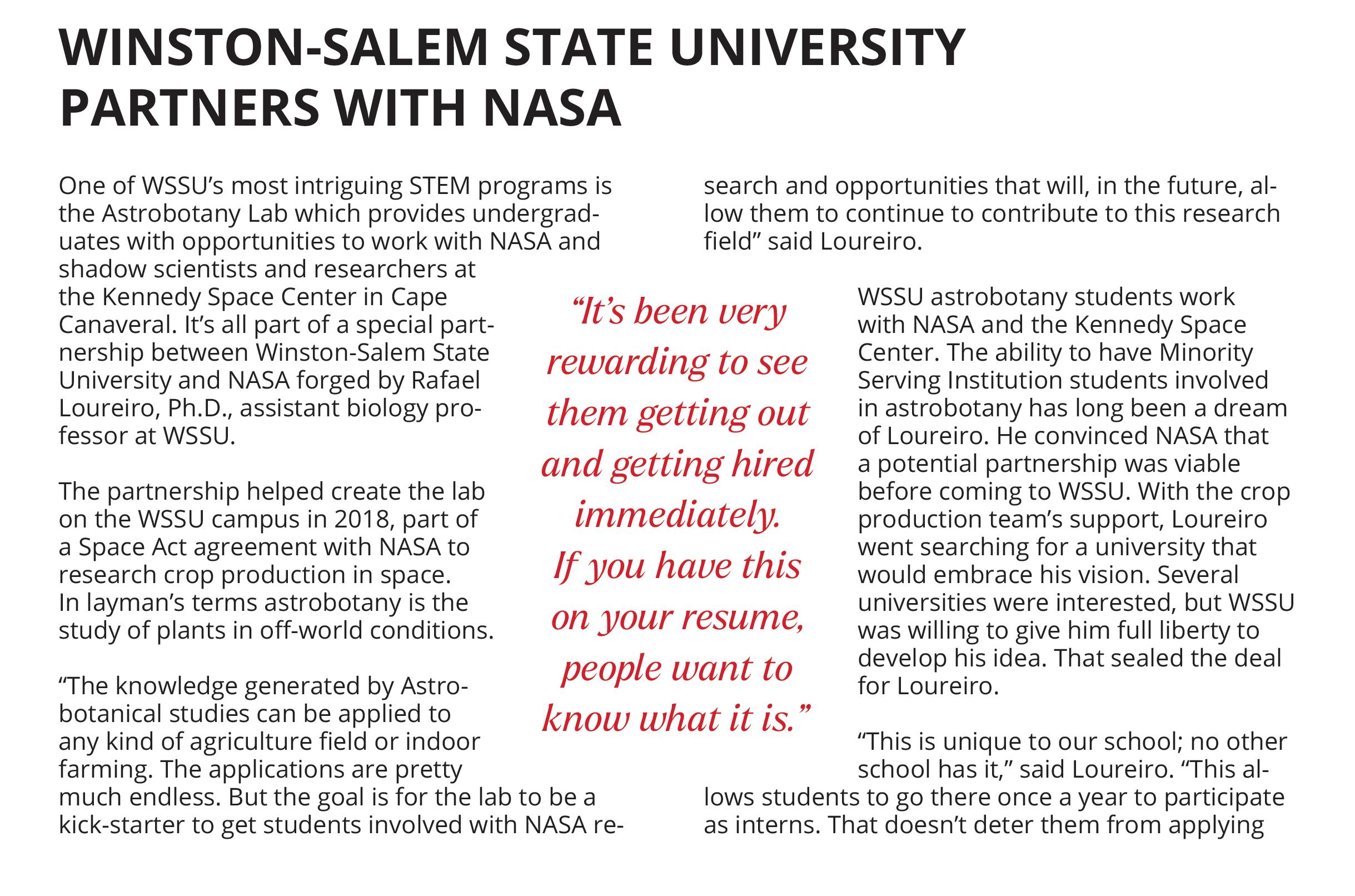

90 BUSINESS NORTH CAROLINA SPONSORED SECTION RESEARCH NORTH CAROLINA WINSTON-SALEM STATE UNIVERSITY
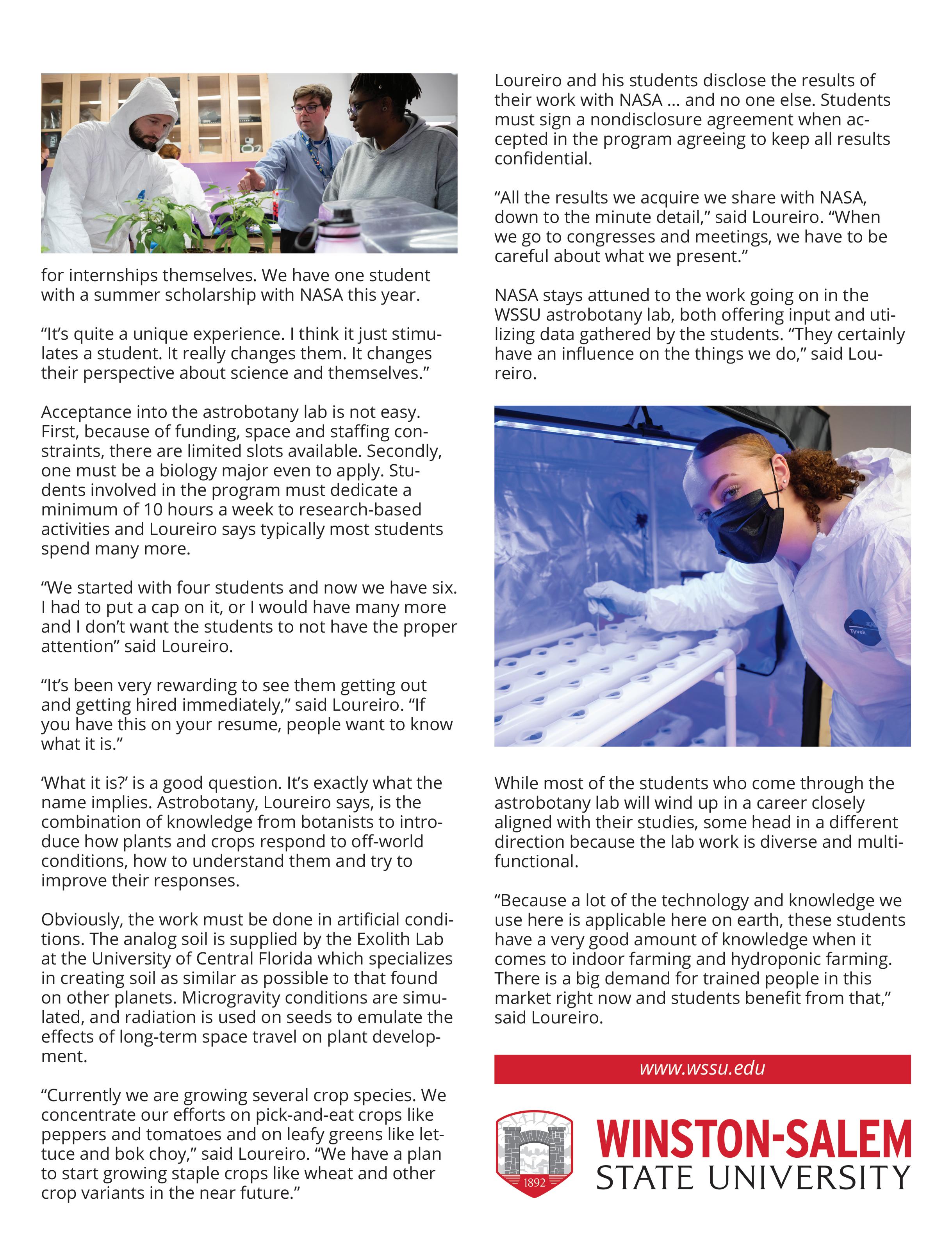
91 JULY 2023
Built on a strong foundation of North Carolina granite in 1909, F&M Bank is honored to serve our neighbors in Cabarrus County. For well over a century, F&M Bank has been a driving force behind the growth and quality of life in the Piedmont.
Cabarrus County is a contrast of breathtaking experiences and southern charm. Here, you can feel the passion and speed of a NASCAR race and the thrill of a successful shopping spree. You can enjoy the splendor of a stroll down the West Avenue District or the lights and pageantry of a Kannapolis Cannon Ballers game, take a serene hike in Pharr Mill Rd. Park or paddle on the Rocky River.
Located in the Charlotte region, Cabarrus County boasts a southern, hometown lifestyle with all the “big city” perks. We have easy access to airports, professional sports, mountains and beaches. Our corporate citizens include Eli Lilly, Amazon, Speedway Motorsports, Hendrick Motorsports, Atrium Health, Corning and Gordon Food Service, among many others. We’re also home to the North Carolina Research Campus, an internationally recognized research collaboration of eight universities including Duke, NC State, UNC and NC Central.
Cabarrus County offers much more than just an excellent location. We also have a diverse, sophisticated economy, ranging from advanced manufacturing and logistics to life sciences. Our unique mixture of commercial, cultural, creative and recreational experiences is only surpassed by our extraordinary hospitality.
Whether you’re exploring the Carolina Thread Trail, sipping a cocktail at 73 & Main or coaching youth soccer at Frank Liske Park, Cabarrus County has something for everyone. It’s a place where excitement and serenity co-exist in perfect harmony. At its core, Cabarrus County is a community committed to quality of life. F&M Bank embraces this commitment, as we continue to expand our footprint and our impact throughout North Carolina — one relationship at a time.
Steve Fisher, a third-generation leader of family-owned F&M Bank, is deeply invested in the progress of the Cabarrus County community. As a testament to his dedication, he currently holds the Board of Director position at the Cabarrus Economic Development Corporation and the Cabarrus Chamber of Commerce.
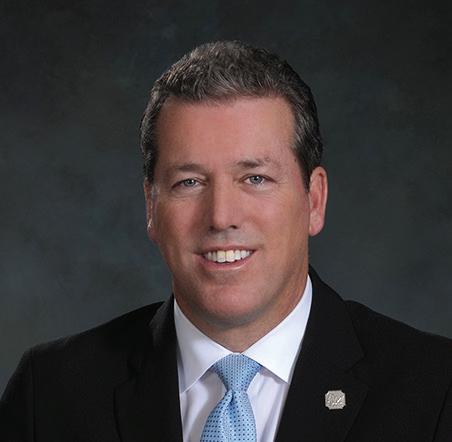 Steve Fisher Chairman & CEO F&M Bank F&M Financial Corporation
Steve Fisher Chairman & CEO F&M Bank F&M Financial Corporation

SPONSORED SECTION COMMUNITY CLOSE-UP CABARRUS COUNTY 92 BUSINESS NORTH CAROLINA SPONSORED SECTION
New investments, downtown development and entrepreneurship bolster Cabarrus County
Downtown Concord, the county seat of Cabarrus County, is humming with activity these days.
“The entire downtown is under construction. There isn’t a block that doesn’t have a renovation project, and our location is the epicenter of it,” says Peter Marsh, founding partner and board member of Flywheel Foundation, which is a catalyst for much of what’s happening.
The foundation opened a 20,000-square-foot co-working space called the Cabarrus Center for Innovation and Entrepreneurship in 2021 to support startups, solo entrepreneurs and remote employees wanting a collaborative office. The space is an economic-development accelerator that supports inception-stage and growthstage startups with a support system of mentors and networking resources.
The Cabarrus Center also houses the Chamber of Commerce, the county’s
Economic Development Corporation
and the Small Business Center linked with Rowan-Cabarrus Community College. With many rentable workspaces and meeting rooms, this creative space has enhanced business opportunities in Cabarrus as well as spurred downtown growth.
“Since [the center] opened, there have been four or five restaurant starts, more bars, it’s like night and day. And it’s not done yet,” Marsh says.
In February 2022, EDC executive director Page Castrodale hosted Economic Development 101 at the center. It was one of several informal, public information meetings to explain the development group's work and its availability to county residents.
“The Cabarrus EDC makes a measurable impact on individuals and families through program partnerships for local startups, support of existing businesses and recruitment of new industry,” Castrodale says. “Often,
people think the EDC is the man behind the curtain controlling the almighty Oz with buttons and levers. The reality is the buttons we push and the levers we pull are all about fostering collaboration in our community so that businesses of all sizes can grow and residents can have a better quality of life. Economic Development 101 is an opportunity for us to pull the curtain back and show people what we are doing for them and for the community.”
Cabarrus has several components to fuel its economic development. It is a growing hub for life sciences and healthcare, with investments from namebrand companies such as Eli Lilly & Co., which is investing $1 billion at an 800,000-square-foot campus at The Grounds at Concord. New industrial and business parks are opening in Cabarrus, including an NCDOT rail logistics center.
Charlotte Motor Speedway in Concord has long been a draw for thousands of visitors as well as

93 JULY 2023
PHOTO COURTESY OF VINCENT KNAKAL, FLYWHEELCOWORKING AND THE CITY OF KANNAPOLIS
motorsport companies. Hendrick Motorsports recently announced it’s expanding its presence with a new 55,000-square-foot advanced manufacturing facility that will cost $14.5 million to build and create 50 jobs.
Castrodale is talking with several other companies eyeing locations in Cabarrus County.
“I think the county is attractive for a number of reasons, and we see a lot of relocations to this area,” she says. “But we’re only as strong as the product we have to support."
LIFE SCIENCES AND HEALTHCARE GROWTH
Cabarrus County’s largest financial commitment came in January 2022 when global healthcare and biopharmaceutical giant Eli Lilly announced its $1 billion investment for an 800,000-square-foot, five-building campus at The Grounds at Concord, a 2,000-acre industrial site four miles from Interstate 85 and 30 minutes from

Charlotte Douglas International Airport. Indianapolis-based Lilly, which has large plants in the U.S. and Puerto Rico, cited the local labor force, educational resources and transportation infrastructure as components offered by Cabarrus that landed the deal.
“Lilly conducted a global evaluation to determine the location for these sites, taking into account a variety of factors, including talent base and government policies that encourage innovation. Concord’s local labor force has extensive experience with manufacturing and is in close proximity to colleges and universities with strong STEM programs,” a Lilly spokesperson says. “The facility in Concord, in combination with our site in Research Triangle Park, will create a cluster of manufacturing facilities, allowing us to speed the delivery of medicines to patients, increase Lilly’s brand recognition within the state of North Carolina, strengthen university and government relationships and diversify our growing presence in the state.
The new manufacturing site in Concord will use the latest technology to manufacture parenteral [injectable] products and devices, including medicines in Eli Lilly’s diabetes portfolio and various other medications. The Concord campus will include medication production, device assembly and packaging. It will utilize cutting-edge automation, robotics and data analytics to optimize output and efficiency, according to the company.
“The state-of-the-art technology will also be applied to minimize the environmental impact of the site, which is consistent with our 2030 environmental goals,” the spokesperson says.
The project is “transforming our community” according to Castrodale.
“Not just because of the investment but because of the quality of jobs and type of corporate citizens [Eli Lilly] is proving to be,” she says. “They’re partnering with a lot of nonprofits and school systems, and they’re a great example for a lot of future employees.”
The spokesperson says Lilly has established partnerships with RowanCabarrus Community College, UNC Charlotte, the North Carolina Manufacturing Institute and others to provide training.


The company expects to create 600 permanent jobs, according to a release. An estimated 500 people are involved in the project construction.

“We are looking for operations technicians, engineers, scientists, quality assurance/quality control and several business support functions,” the spokesperson says. “Hiring started shortly after our groundbreaking in June 2022 and has ramped up significantly. If anyone is interested in exploring opportunities with us, they should visit Lilly.com/careers and search for available openings at our Concord location.”
The North Carolina Research Campus is also making a big impact on Cabarrus and the surrounding area. Located in downtown Kannapolis at the northern edge of the county, the campus is a 350-acre research community where staff from eight universities and other collaborators work to develop nutritious crops, healthy foods, medical applications and health-related products.





SPONSORED SECTION COMMUNITY CLOSE-UP CABARRUS COUNTY 94 BUSINESS NORTH CAROLINA
PHOTOS
OF THE CITY OF
The North Carolina Research Campus is gaining new energy with Insite Properties acquiring much of the adjoining land. Several universities have invested heavily in the campus.
COURTESY
KANNAPOLIS

The campus has created more than 1,000 jobs in focus areas such as phytochemicals in fruits and vegetables, exercise physiology, nutrition and population-based genetics studies. The latter involves studying how food, lifestyle choices and environment affect the likelihood of cancer, diabetes, obesity and heart disease. Scientists at the campus’ university sites have received more than $44 million in awards during the past fiscal year.
“Each of the universities represented here specializes in a segment of nutrition or disease prevention,” says Kannapolis communications director Annette Privette Keller. “Appalachian State specializes in healthy eating and exercise, N.C. State focuses on agricultural and plant research and Duke has received grants for studies in which they look at people over time and can see trends that help the next generation.”
Duke has 14,000 volunteers in a long-range study of biomarkers that influence health and disease.
The campus also houses a North Carolina A&T State University contingent that focuses on fruits and vegetables preservation and safety. The N.C. Central arm studies hematopoietic disease and cancer, while the UNC Chapel Hill entity studies precision nutrition, chronic disease and aging. The UNC Charlotte arm focuses on computer science and data analysis of biological questions and UNC Greensboro studies liver disease and diabetes.
The campus’ Food Innovation Lab opened in 2019 to assist entrepreneurs and food companies with product development, packaging and research.

The collection of universities is producing impactful results, as well as drawing more interest in Cabarrus County.
Last September, Charlotte-based Insite Properties announced plans to invest $500 million for the acquisition of 236 acres surrounding the Research Campus. Its development will include 800,000-square-feet of office, research and medical space, 47,000-square-feet of commercial and retail development and 1,200 residential units and laboratories and medical office buildings.
“They have not built yet but are working on the master plan and what makes sense, being adjacent to and
on the campus,” says Keller. “They’re going through the approval process with the city.”
“The Research Campus is one of the state’s best-kept secrets in a lot of ways,” she adds. “You have prestigious universities in the state collaborating and researching areas that impact everybody in the world. So many unique things they’ve discovered, we’ll look back on in five or 10 years and say, ‘Wow, they discovered that and now it’s being put into action.’ It’s really amazing.”
The Health Equity Innovation Challenge is an unusual project helmed by both Flywheel and Atrium Health. It is a business competition in which organizations present ideas to combat disparities in healthcare access and are rewarded with funding to pursue their plans. The focus mostly is on population segments in vulnerable communities with incomes below 200% of the federal poverty level, where social drivers inhibit the ability to obtain care.
“So the Health Equity Challenge is a project that connects all the dots. It would be impossible without the right location, and Atrium has a location in Cabarrus,” says Flywheel’s Marsh. “It’s interesting to see the amount of medical students who are entering the
profession of care-giving tasks, or working on clinical trials where certain populations are under-represented. All of the companies [in the challenge] are amazing.”
More than 100 entities applied to the challenge. The five winners address health needs in a variety of new ways.
CareYaya Health Technologies in Durham connects families needing lowcost caregivers with doctor-approved medical students.

CliniSpan Health in the Triad focuses on increasing the representation of people of color through targeted recruitment methods in health studies and clinical research.


F.E.L.K. After School serves K-6 students in Salisbury with affordable after-school care and a curriculum focused on core principles including personal responsibility, ethics and financial literacy.
Nutrible, based in St. Louis, is a web app that doctors and patients use to deliver medically-tailored meals and groceries from multiple vendors directly to patients at home, paid for by health plans and federal programs.
ZABS Place in Charlotte is a destination for young adults with developmental differences interested


SPONSORED SECTION COMMUNITY CLOSE-UP CABARRUS COUNTY 96 BUSINESS NORTH CAROLINA
Top left - Flywheel Café at the Cabarrus Center; Top right - J.King Guitar founder, Jack King, graduated from the Cabarrus Center’s Retail Lab Boot Camp; Bottom - Advisory board members responsible for the Flywheel Foundation's Health Equity Innovation Challenge.
in having a job but unsure of how to get one. The company operates a thrift store for training and revenue.
The first phase of the project is June 5 to Sept. 1. “During that [accelerator program] time period we will be matching them up with customers and subject-matter experts and mentors who will accelerate the pace of their business. Then they enter an incubation period when a team of resource providers will be formalized to work with the companies over an 18-month period, and that’s supported by the Cabarrus Center,” Marsh says.
“We [Flywheel] have been an accelerator program for over eight years. An accelerator program meets the company where they are at in their stage of development and accelerates their path to repeatable revenue and market attraction with appropriate resources,” Marsh says. It's a12-week program.
The following entities are supporters: Cabarrus Health Alliance, North Carolina Research Campus, El Puente Hispano, Racial Equity Cabarrus, Cabarrus Economic Development Corporation, the Chamber, Leading Business in Cabarrus and the Small Business Center of Rowan-Cabarrus Community College.

ROOM FOR MORE
Cabarrus County has developed a strong portfolio of business parks.

“Bringing those parks online gives us an opportunity to respond to [local and relocation] requests,” Castrodale says. “I’m glad we have the real estate.”
The 70-acre Midland Logistics Park opened last October in Midland to provide a central rail hub for the Charlotte area. The park is anchored by the Aberdeen Carolina and Western Railway and has space for three additional railways.
Last summer, Springs Business Park opened in Concord one mile from Interstate 85, with four buildings of office, warehouse and commercial space totaling 119,400 square feet.
Other parks drawing tenants include Metro63 Logistics Center and 85 Exchange, both in Kannapolis, and RiverOaks Corporate Center, Axial Bonds Farm and 84 Automation Drive in Concord.
97 JULY 2023
PHOTOS COURTESY OF CABARRUS EDC AND FLYWHEEL COWORKING
BRIGHT LIGHTS

Along with all the new business activity in downtown Concord, the city is updating its streetscape.

The downtown project will feature 22-foot-wide sidewalks, new parking spaces including ADA-accessible spots, concrete sidewalks with brick pavers, trees and landscaping, new light poles and spaces for public art and outdoor dining. The work is expected to be finished by fall 2024.



“The investment we made here [with the Cabarrus Center in Concord] came about the same time that the Downtown Streetscape project happened. I’m not going to say the center was the reason, but everything that’s happened downtown has contributed to [downtown’s] success,” says Marsh.

“The Cabarrus Center has a real

strong impact on development through corporate recruiting and things of that nature. So, when people come to meet with the EDC at that center and they see the high level of entrepreneurship, they see that they will find the talent they need. So we’re not only seeing an impact on small business and entrepreneurship, but also on the [economic development] recruiting the county is going through.”
THAT’S RACIN’
Charlotte Motor Speedway in Concord is a major economic driver for Cabarrus, the Charlotte area and the entire state. The 1.5-mile oval NASCAR track that hosts the Coca-Cola 600 on Memorial Day weekend along with other stock car, Xfinity Series, truck series and drag races, can hold about 167,000 fans in its stands plus another
50,000 in the infield.


Hendrick Motorsports, StewartHass Racing, Penske, JR Motorsports, Joe Gibbs Racing and other teams are based in the area. Hendrick Motorsports’ new advanced manufacturing facility is expected to be operational by June 2024. Because of the $14.9 million investment and 50 new jobs, It will receive economic development grants from Concord and Cabarrus County totaling $449,540 over three years. According to the EDC, grants are paid after taxes have been collected. The investment will net the local government more than $1 million in additional tax revenue over the next 10 years. Hendrick has invested in specialized manufacturing outside the racing industry since 2019.
“Over the past several years, Hendrick Motorsports’ commitment to advanced manufacturing has allowed us to diversify our business and retain quality jobs for our teammates,” President Marshall Carlson said in a release. “This new facility on our campus will allow us to further expand our manufacturing work and create additional career opportunities for people with specialized skills.”
EXPLODING CORRIDOR
“The bottom line is Cabarrus has a lot of natural advantages, such as its proximity to Charlotte and Charlotte Douglas International Airport. We’re part of the exploding I-85 corridor, and we have a workforce that is growing in both size and talent,” Castrodale says. “Add to that the collaboration across the community that the EDC fosters, and it’s easy to envision a community where the lives of individuals and families continue to improve and our economy continues to grow.
“I hope for us to continue to diversify our industry base and bring more high-skilled jobs to the community, and strengthen our pipeline of K-12 students and employers, to provide opportunities for the people living here.” ■
Charlotte
SPONSORED SECTION COMMUNITY CLOSE-UP CABARRUS COUNTY 98 BUSINESS NORTH CAROLINA
Kathy Blake is a writer from eastern North Carolina.
Downtown Kannapolis is being reinvigorated with new housing and retail projects near the minor league baseball stadium.
Motor Speedway remains a pivotal tourism draw.
PHOTOS COURTESY OF THE CITY OF KANNAPOLIS AND GETTY IMAGES

FOREST FAVORITE
BY KEVIN ELLIS
Jeanne Hawkins stepped out of the kitchen just as the weekday lunch crowd started ltering out of her family’s Pisgah Fish Camp, which will mark its 55th year in Transylvania County in September. She and co-owner Dana Turner, who is her oldest brother, consider their cooking time to be as vital as any other restaurant duties. “ ere’s no sitting in the o ce and delegating,” Jeanne Hawkins says. “It’s hands-on.”
Wearing a T-shirt and baseball cap, both sporting restaurant logos, she shared the recipe of how the 160-seat sh camp started by her father has thrived for many years. Its location on US 64/276, a few hundred yards from the entrance to the Pisgah National Forest, is a key factor. From the end of the school year until September, bicyclists and hikers who visit the 500,000-plus acre forest or Transylvania County’s 250 waterfalls make it a favorite pit stop. Fall attracts leaf watchers. e holidays bring in family gatherings.
Hawkins points toward an older couple leaving, noting that they eat at the restaurant three or four times a week. e Pisgah Fish Camp enjoys its reputation as the place where local folks eat. Whenever she steps out of the kitchen, “I’ll know four or ve people sitting out here,” she says. e family patriarch, Dan Hawkins, started the restaurant in 1968, and remained active until a short time before his death in 2012. “I thought my dad was Superman,” she says. “My dad was just a kind, caring man.” A “memorial” photograph of Dan Hawkins and his wife of 59 years, Fran, who died the following year, is staged in a chair near the entrance.
Dan Hawkins was a World War II veteran who grew up in Simpsonville, South Carolina, but moved to Transylvania County a er the war. He managed a bowling alley and built the area’s rst miniature golf course, but wanted a sh camp like he had seen in eastern North Carolina.
Secrets to his success were staying active in the community, sourcing his food from high-quality producers and charging a fair price. Fried ounder plates now cost $12.49, while cat sh nabs
$15.99. “My dad gured out a plan for success and we just carried on,” his daughter says. An early, smart decision was to move the restaurant from near the old Brevard Country Club to its current location.



In 1977, a re from a malfunctioning fryer gutted the restaurant. It would re-open in 13 days thanks to community support. “Everyone in the town just pitched in,” Jeanne Hawkins says. “People who were electricians came in to work. Everyone just helped.”
In the 1970s and 1980s, the Hawkins family expanded to ve other locations, including Asheville, Black Mountain, Hendersonville, Greenville, South Carolina and a Tennessee location. None had the staying power of the restaurant in Pisgah Forest, an unincorporated town of about 7,400 residents.

Keeping the restaurant family-owned has made a di erence, she says, noting she and her brother don’t butt heads. “We’ve grown up in it, so we manage it well.” e entire family has always been able to communicate with each other, adds Dana Hawkins. “Anything good we do, I tend to give credit to my parents.”
e four Hawkins siblings still live in town and stay active in community life. Chris Hawkins retired as chief of detectives with the Transylvania County Sheri ’s O ce. Mike Hawkins ended a 12-year run as a county commissioner in 2020.
Over the years, the restaurant has survived hard times. e Ecusta paper mill closing in 2002 idled about 600 workers. On Labor Day, Pisgah Fish Camp had provided as many as 2,000 meals for the Ecusta family picnic.

“COVID was our biggest challenge by far,” says Hawkins. A er the business reopened following the mandatory shutdown, only a skeleton sta remained and her workweek expanded from 55 hours to 80. Only this spring have sta ng levels returned to normal.

Pisgah Fish Camp, she says, remains more of a legacy than a business. “ ere’s something about working for yourself. Everything’s on you – succeed or fail. ere is something satisfying at the end of the day and you’ve done a good job and you’re the one responsible for it.” ■


100 BUSINESS NORTH CAROLINA GREEN SHOOTS Revitalizing rural N.C.
PHOTO CREDIT: KEVIN ELLIS
A family-owned restaurant helps create community for five decades in Transylvania County.






















































 BY CHRIS BURRITT
BY CHRIS BURRITT
 BY LAWRENCE BIVINS
BY LAWRENCE BIVINS




 BY DAVID MILDENBERG
BY DAVID MILDENBERG




 BY KEVIN ELLIS
BY KEVIN ELLIS















































 By Connie Gentry
By Connie Gentry








































































































 –Evan Stone
–Evan Stone


































 By Lawrence Bivins
By Lawrence Bivins


























































 Couch grew up about 40 miles from Summerfield in Asheboro. He is a graduate of Wake Forest University, where he has made significant donations.
Couch grew up about 40 miles from Summerfield in Asheboro. He is a graduate of Wake Forest University, where he has made significant donations.




 PHOTO COURTESY OF SUMMERFIELD FARMS
Couch meticulously transformed the original 1946 barn into a popular venue space on the Summerfield Farms' property.
PHOTO CREDIT: FREEMAN FOTOGRAPHICS
PHOTO COURTESY OF SUMMERFIELD FARMS
Couch meticulously transformed the original 1946 barn into a popular venue space on the Summerfield Farms' property.
PHOTO CREDIT: FREEMAN FOTOGRAPHICS











 By Kevin Ellis
By Kevin Ellis















































































 By Jack Bailey and Caroline Cropp
By Jack Bailey and Caroline Cropp








 Steve Fisher Chairman & CEO F&M Bank F&M Financial Corporation
Steve Fisher Chairman & CEO F&M Bank F&M Financial Corporation






































